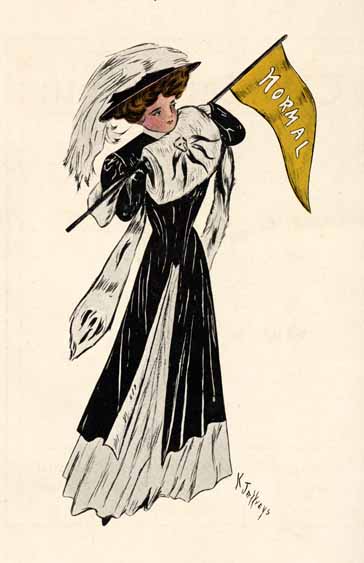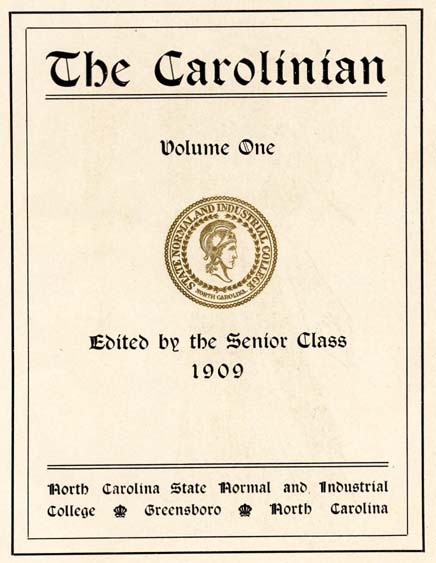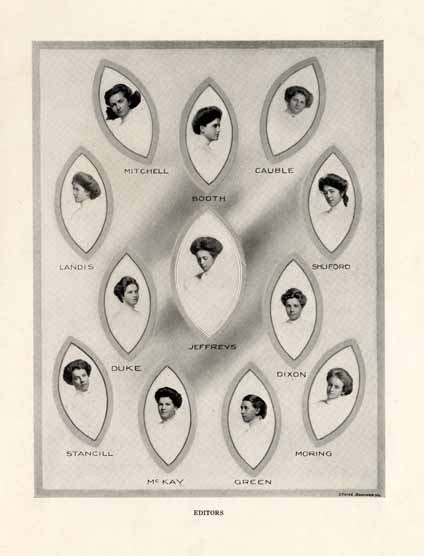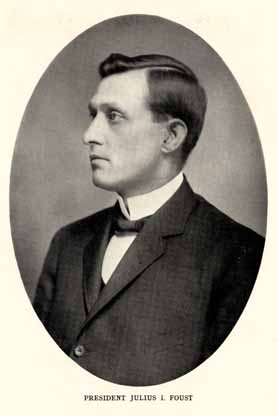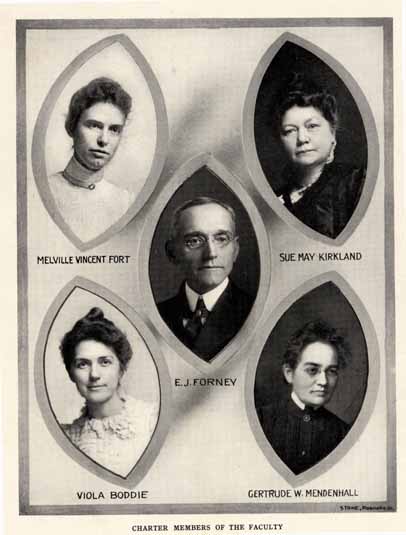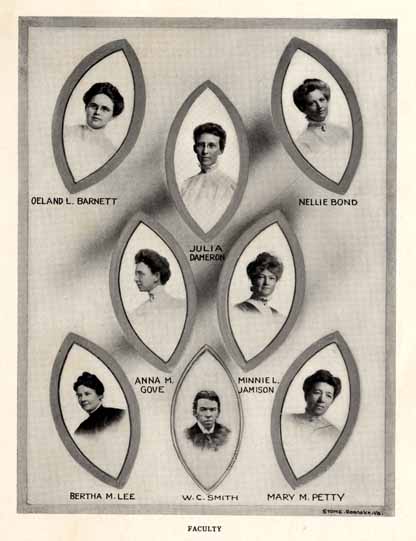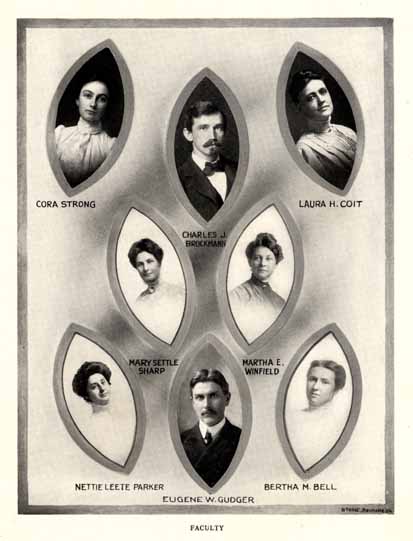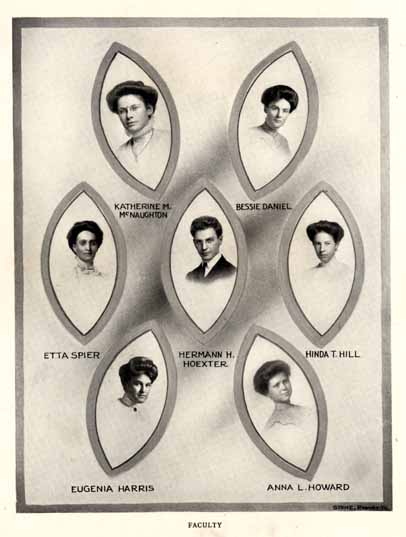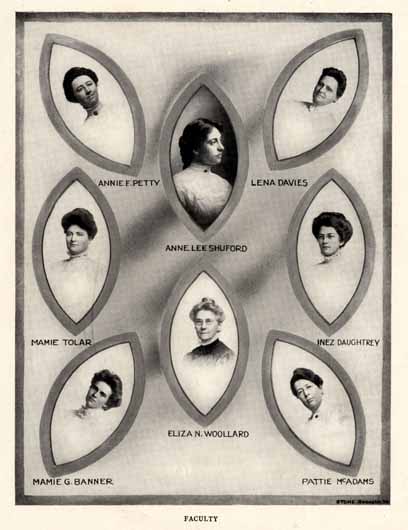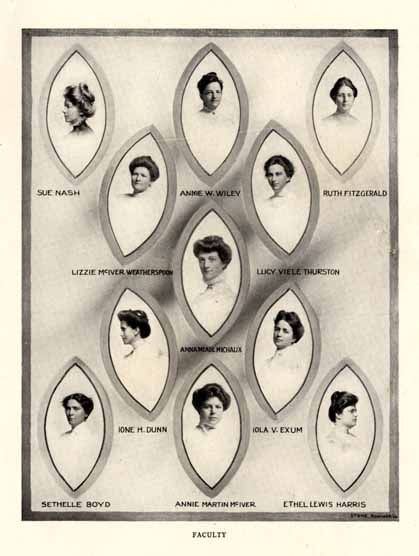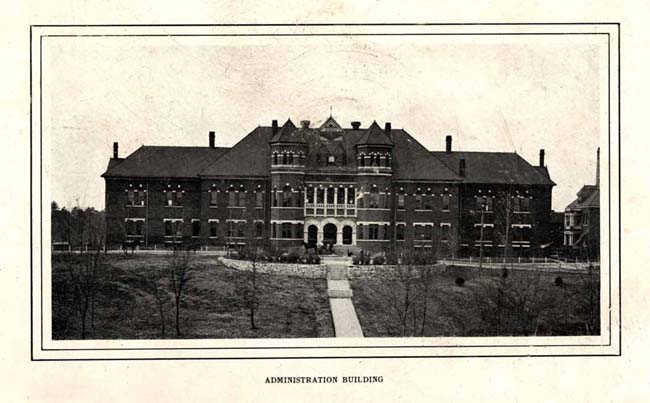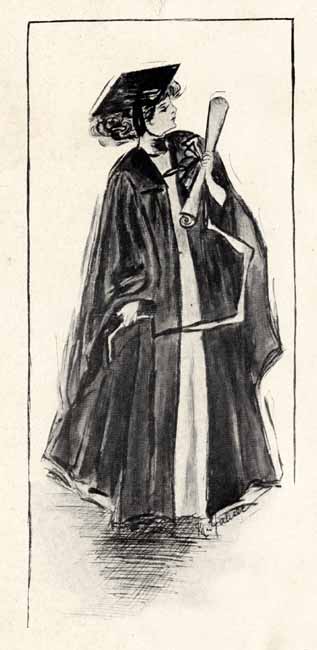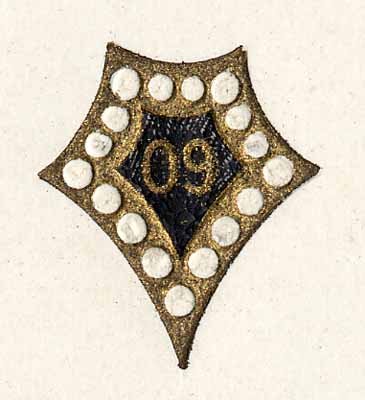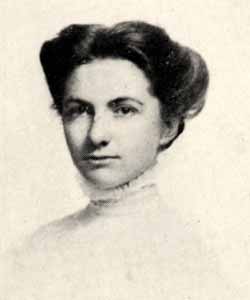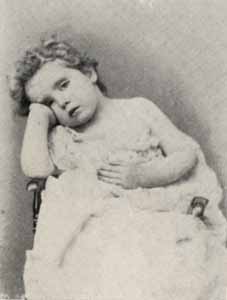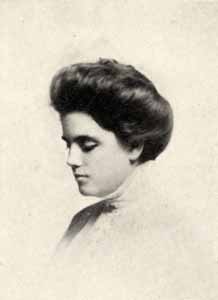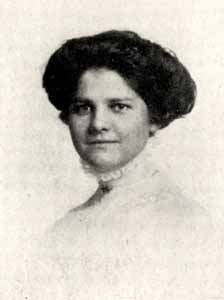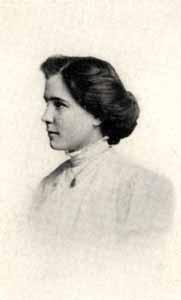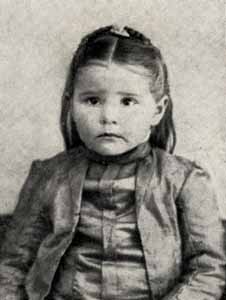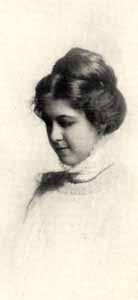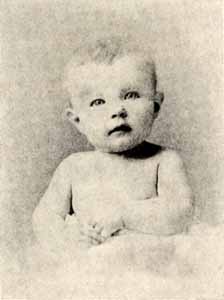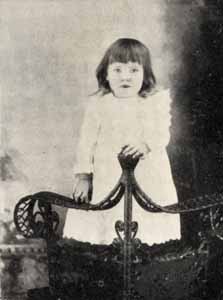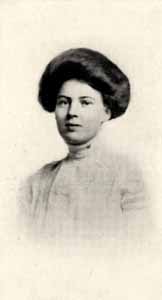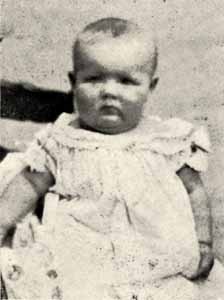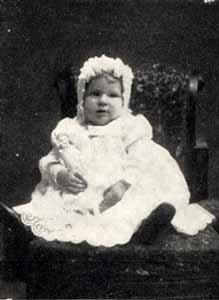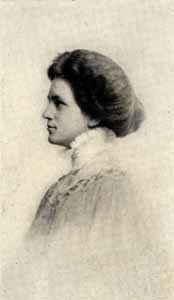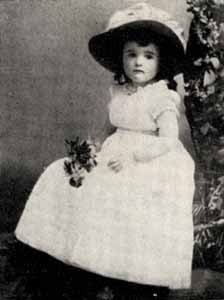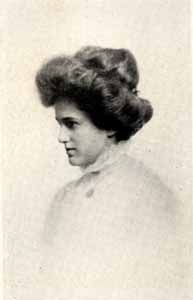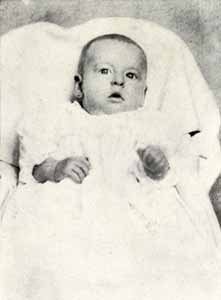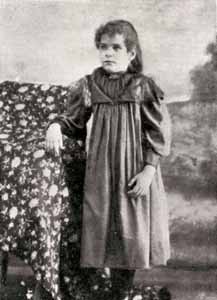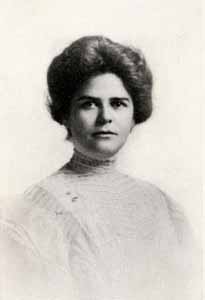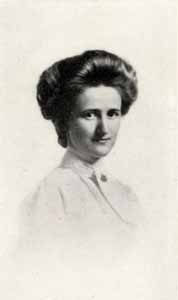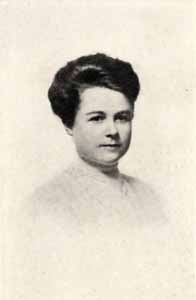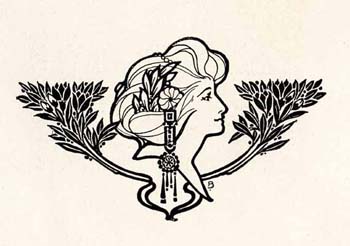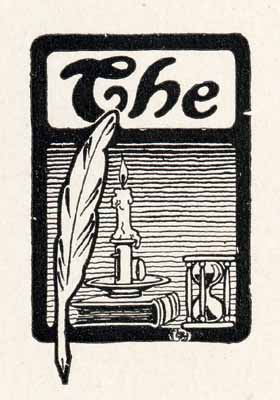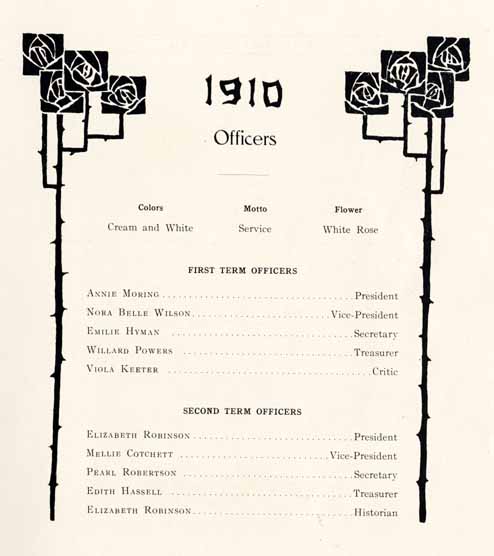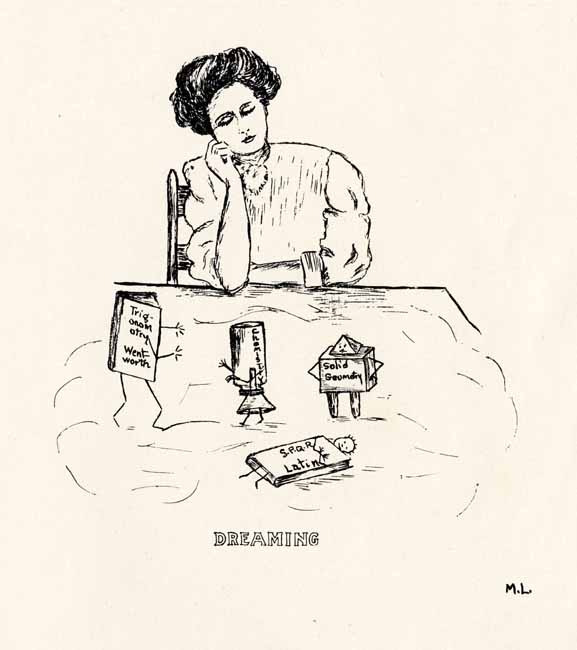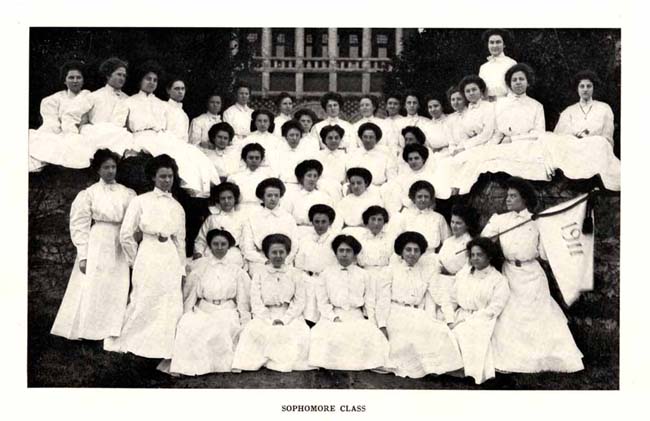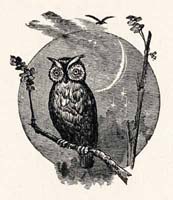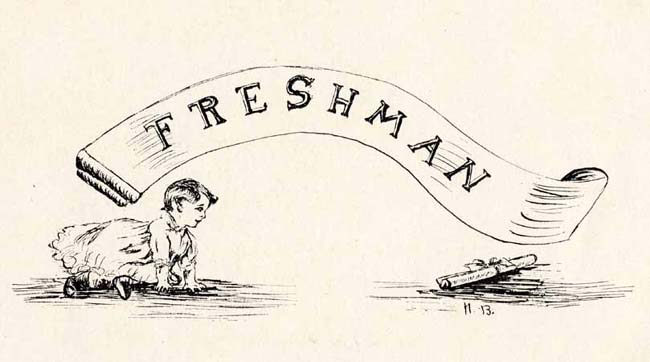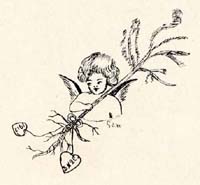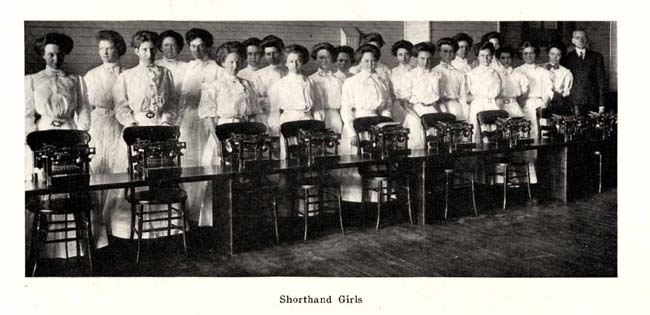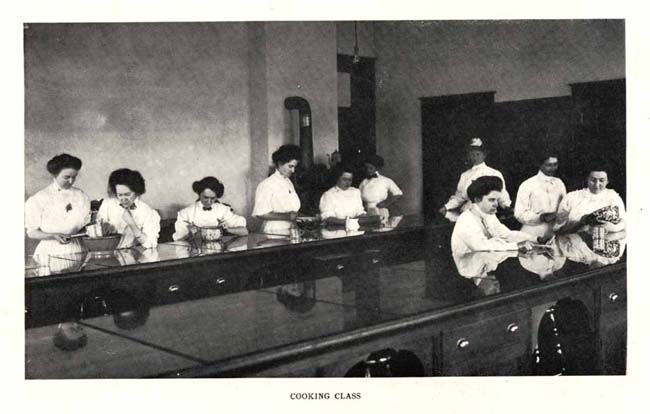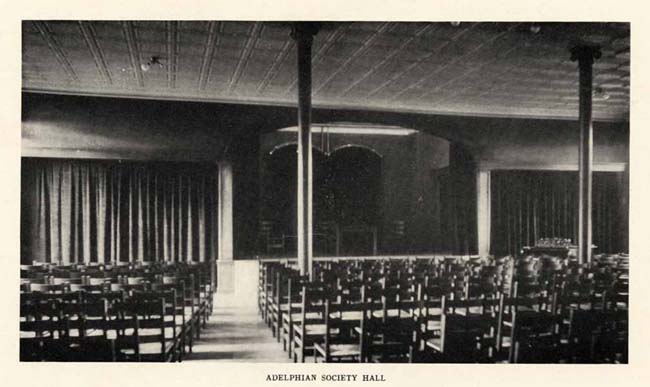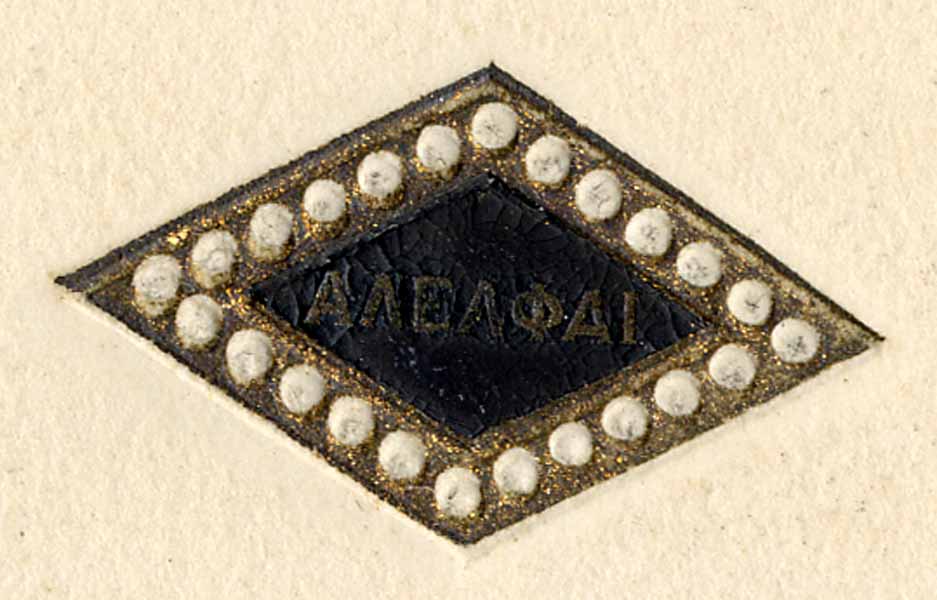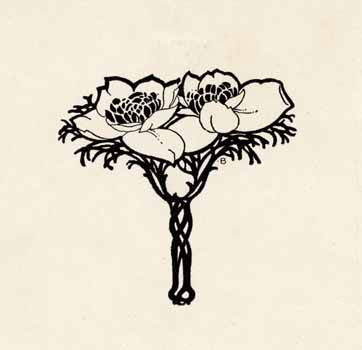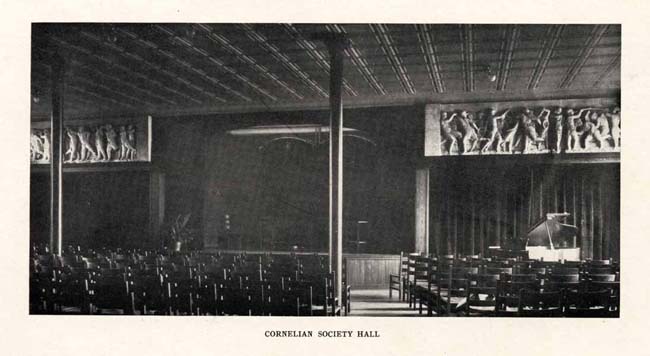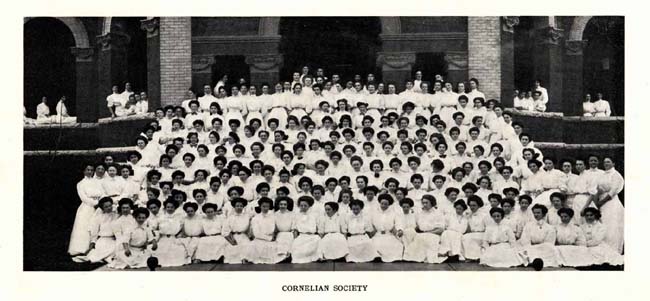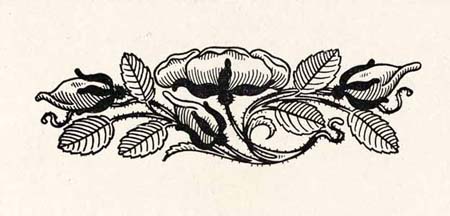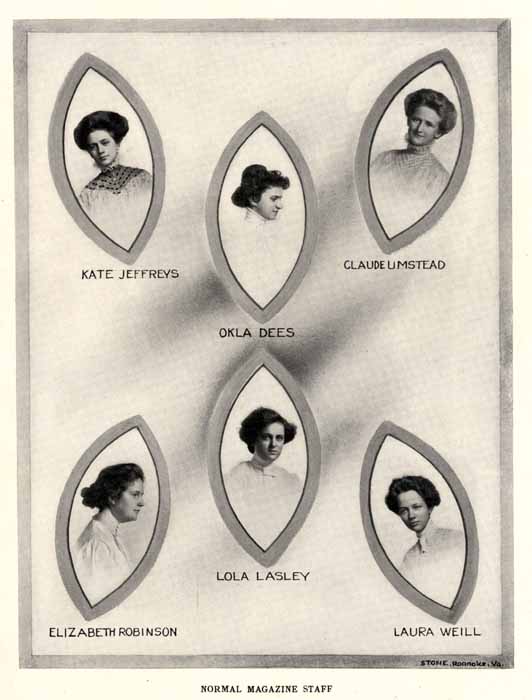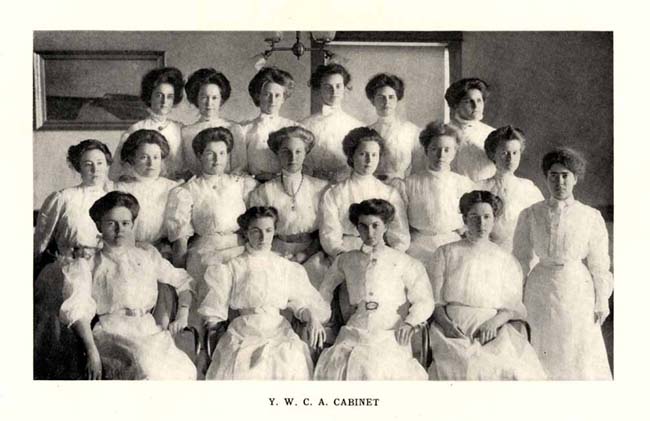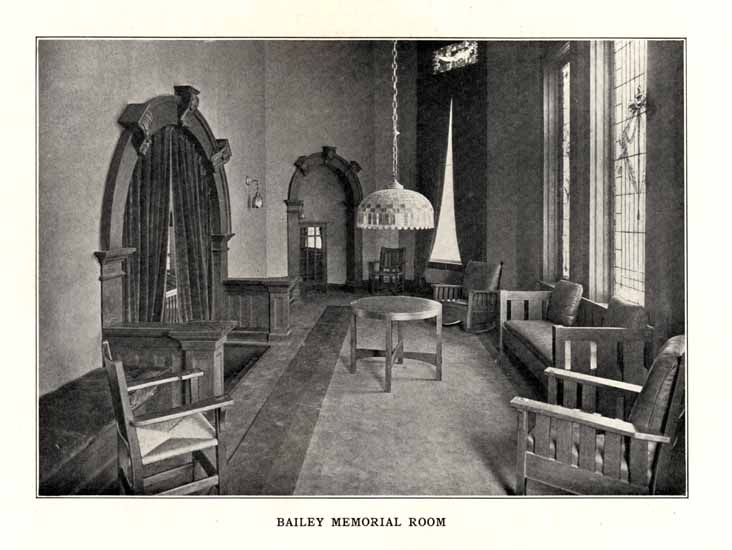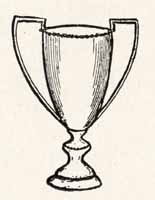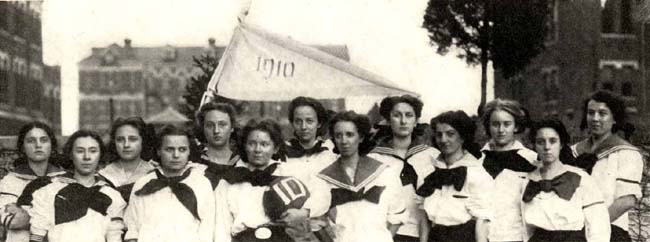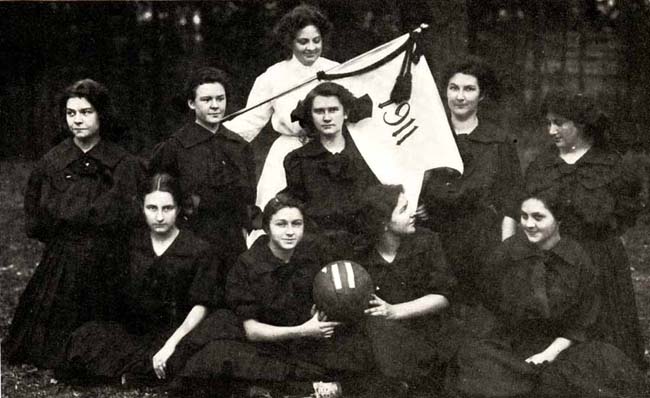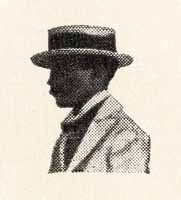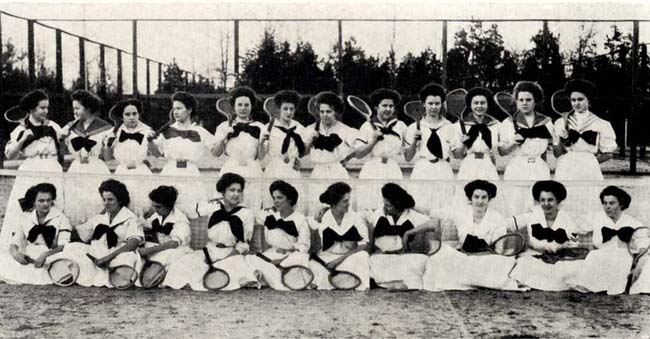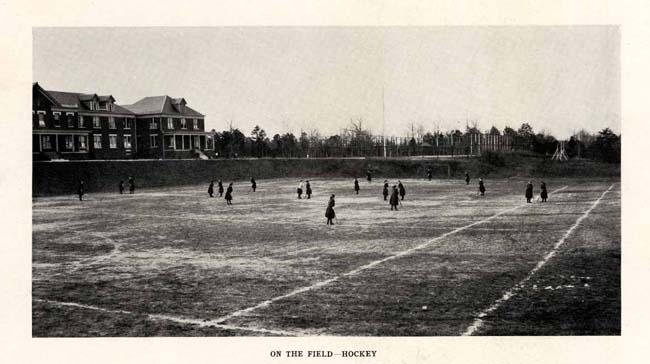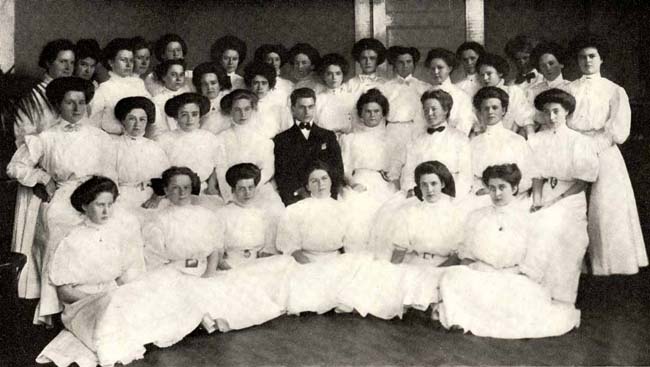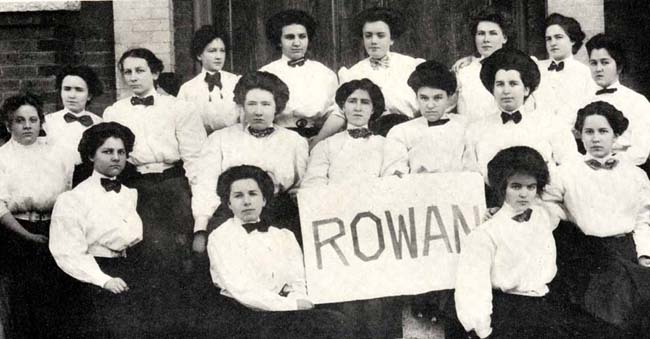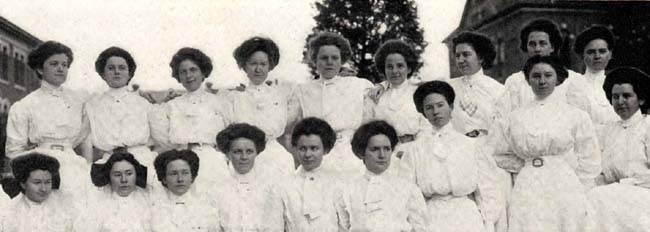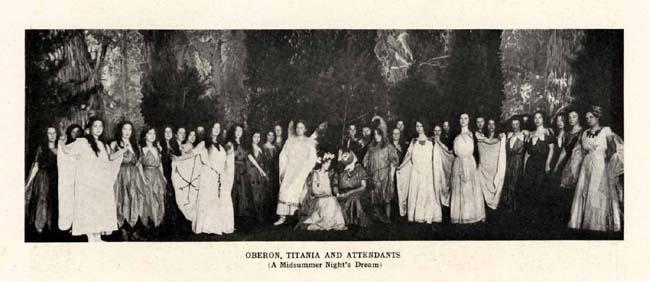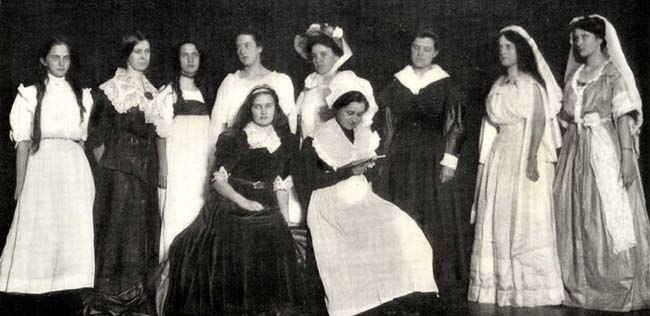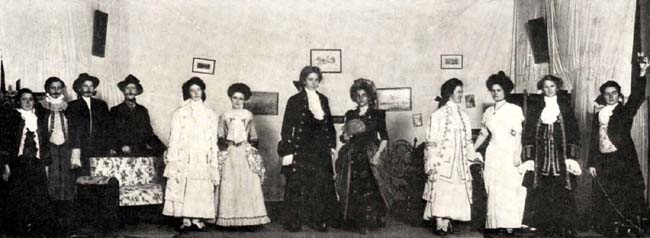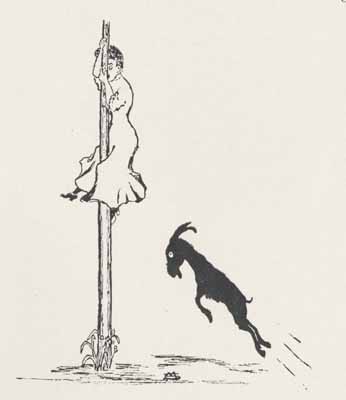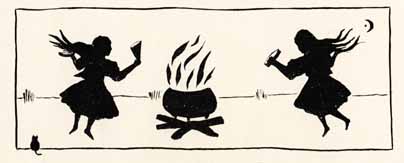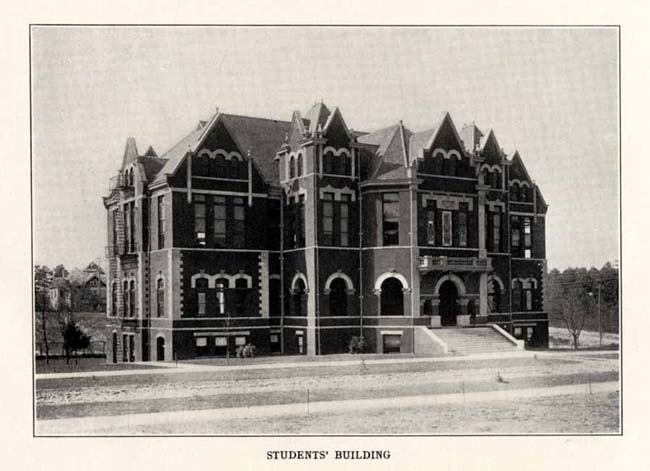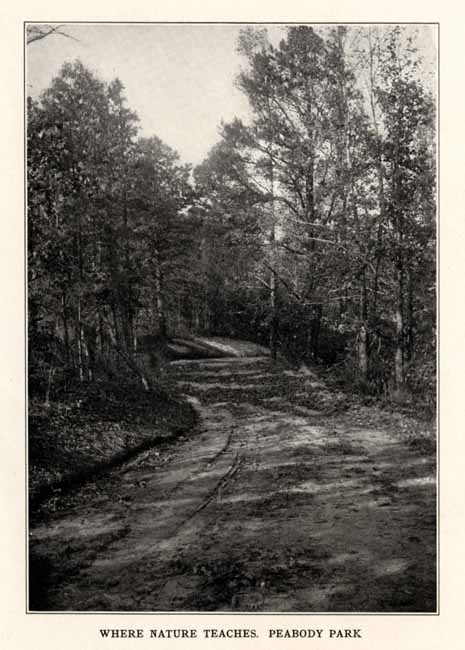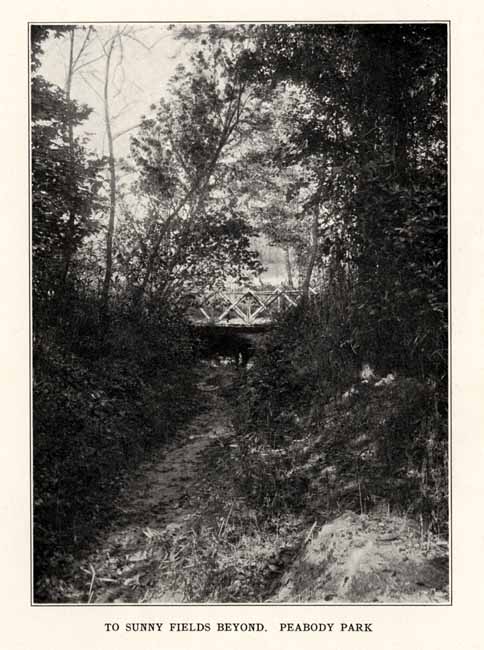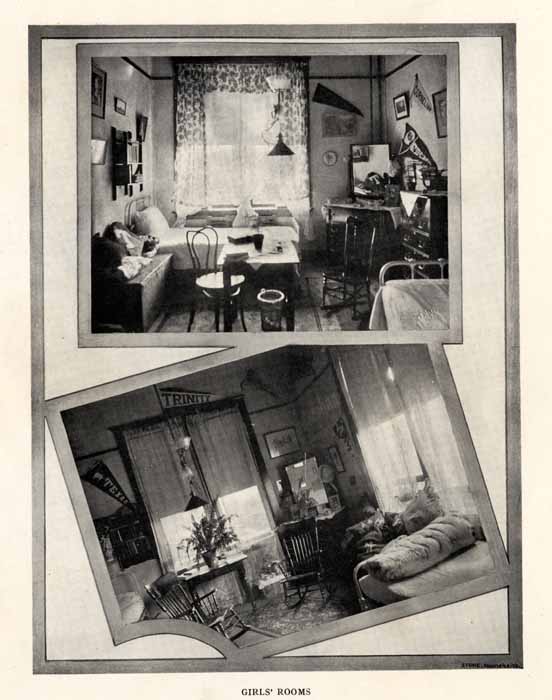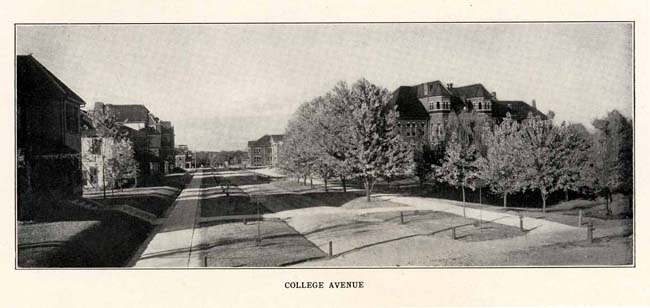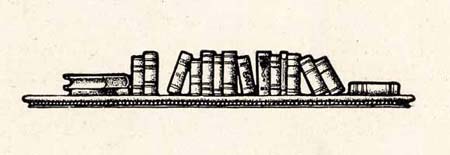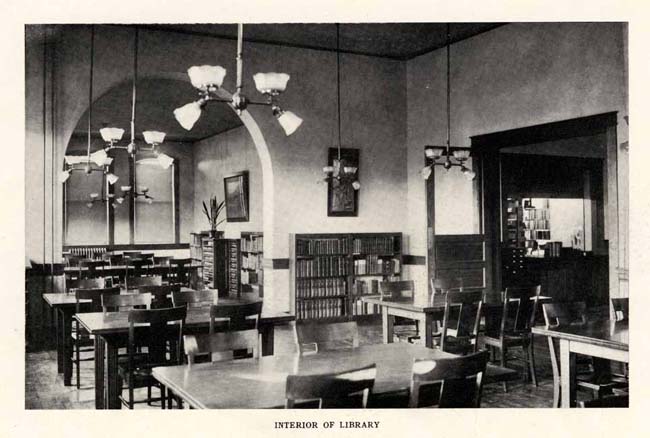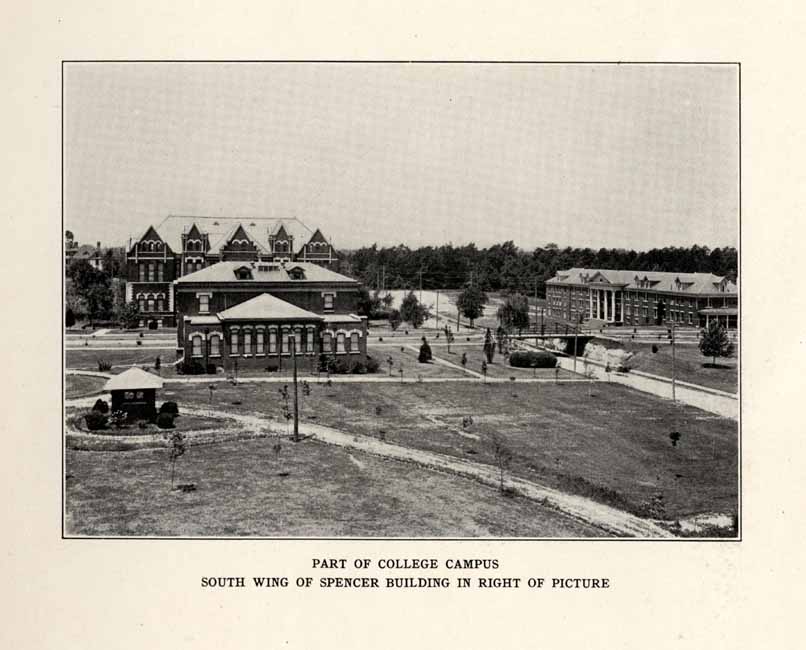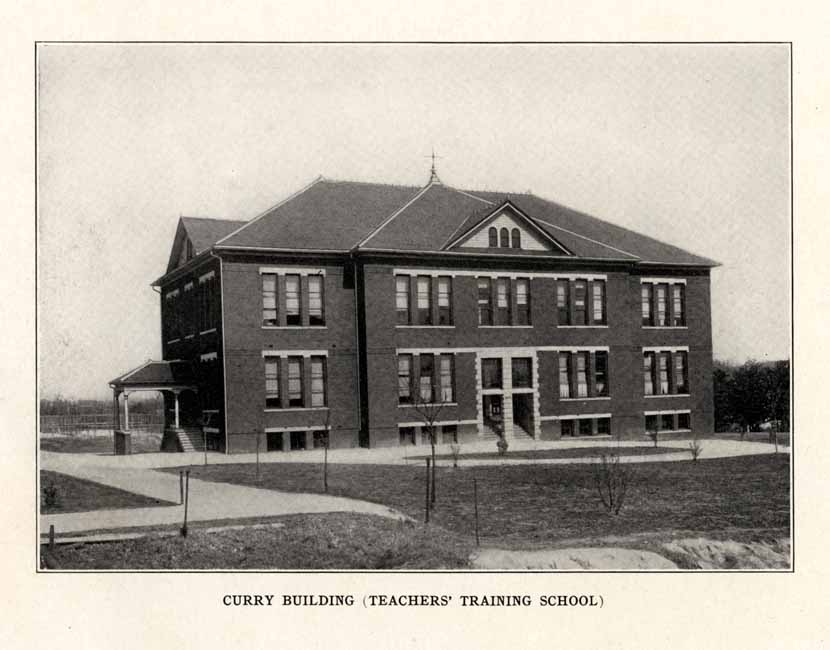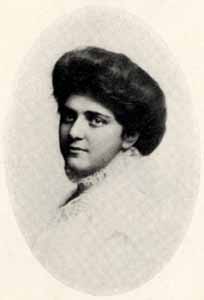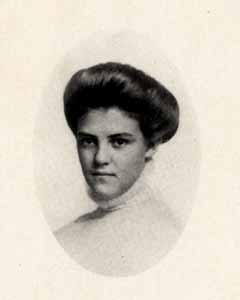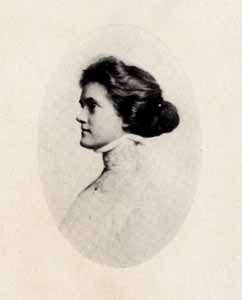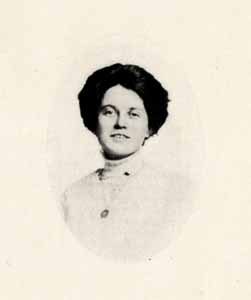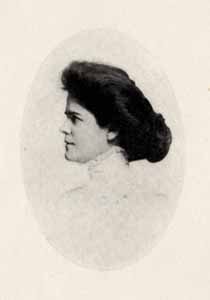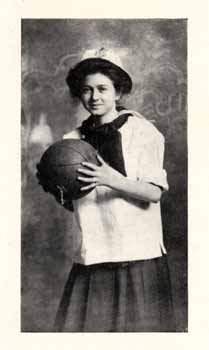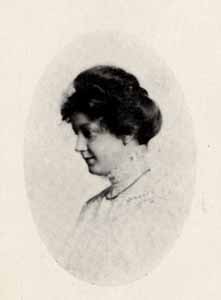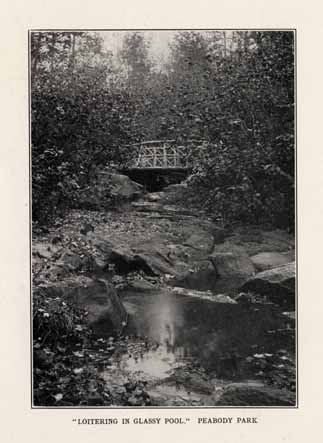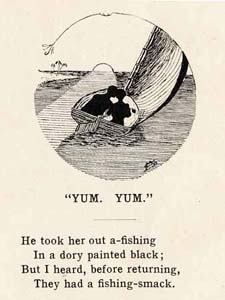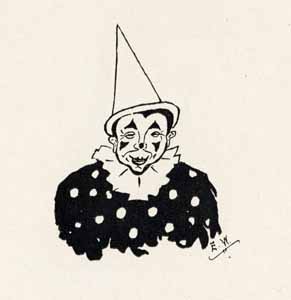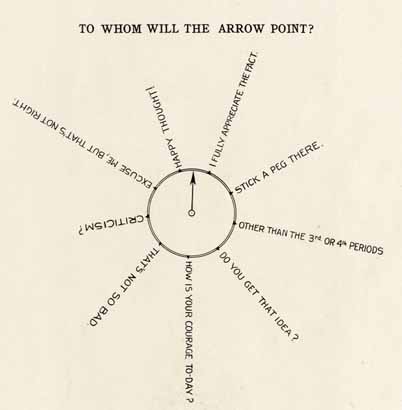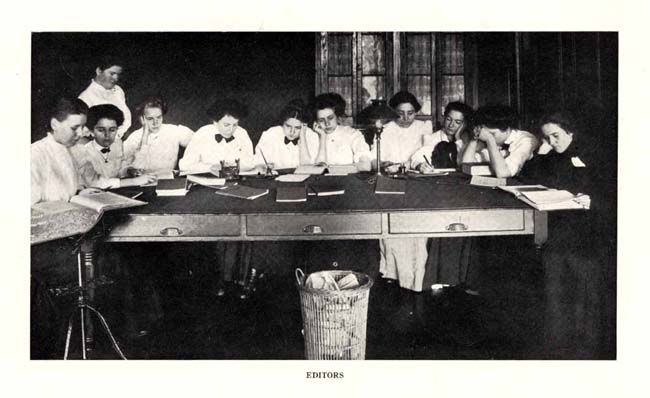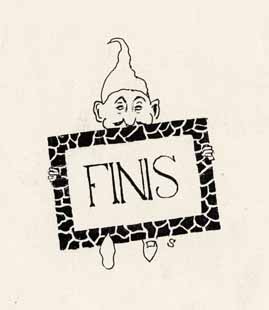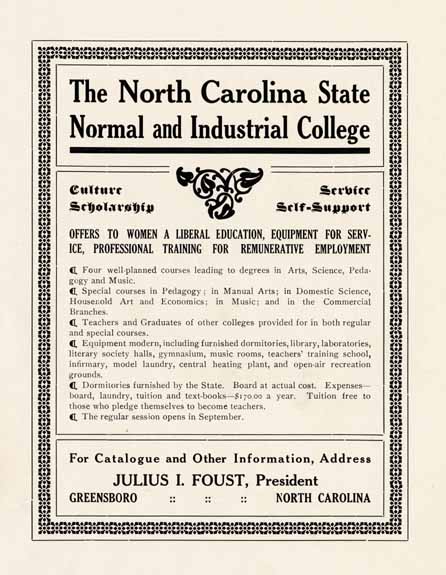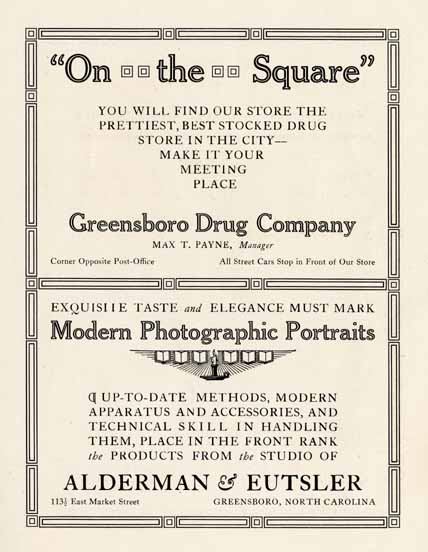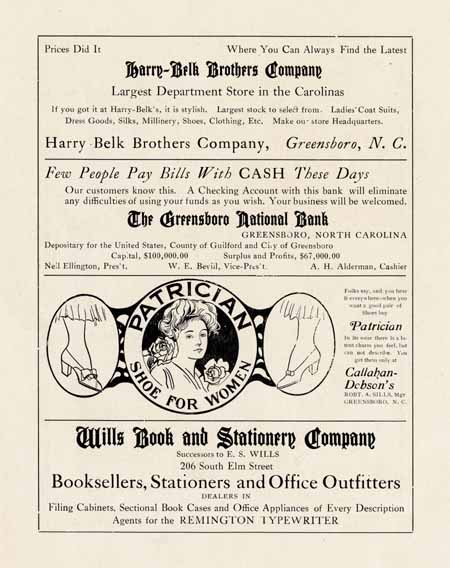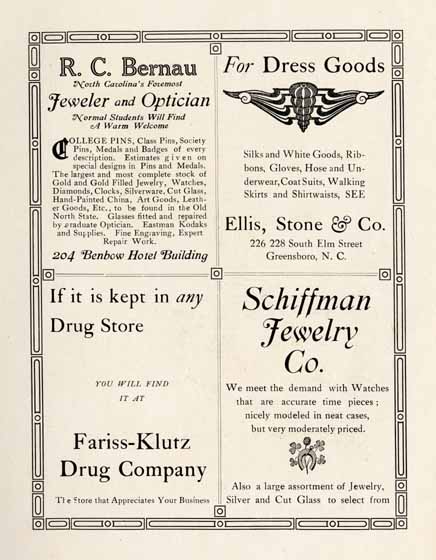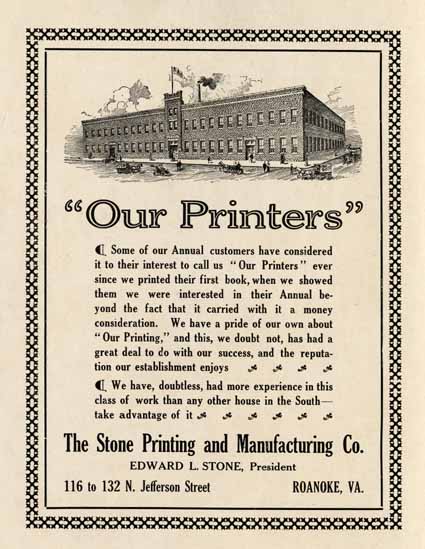The Carolinian,
Edited by the Senior Class,
1909:
Electronic Edition.
Funding from the Institute for Museum and Library Services supported the electronic publication of this title.
Text scanned (OCR) by
Courtney Vien
Images scanned by
Courtney Vien and Melissa Meeks
Text encoded by
Melissa Meeks and Elizabeth S. Wright
First edition, 2003
ca. 265K
Academic Affairs Library, UNC-CH
University of North Carolina at Chapel Hill,
2003.
Source Description:
(title page) The Carolinian, Edited by the Senior Class, 1909
(cover) The Carolinian, 1909
(running title) The Carolinian, Vol. I.
201, [9] p., ill.
Greensboro, North Carolina
North Carolina State Normal and Industrial College
1909
Call number C378 N87PI c.2 (North Carolina Collection, University of North Carolina at Chapel Hill)
The electronic edition is a part of the UNC-CH digitization project, Documenting the American South.
The text has been encoded using the recommendations for Level 4 of the TEI in Libraries Guidelines.
Original grammar, punctuation, and spelling have been preserved. Encountered typographical errors have been preserved, and appear in red type.
All footnotes are inserted at the point of reference within paragraphs.
The publisher's advertisements on pp. 203-210 have been scanned as images and full text has also been provided.
Pages 140-141 appear as a spread in the original and have been presented as one image.
Any hyphens occurring in line breaks have been removed, and the trailing part of a word has been joined to the preceding line.
All quotation marks, em dashes and ampersand have been transcribed as entity references.
All double right and left quotation marks are encoded as " and " respectively.
All single right and left quotation marks are encoded as ' and ' respectively.
All em dashes are encoded as --
Indentation in lines has not been preserved.
Running titles have not been preserved.
Spell-check and verification made against printed text using Author/Editor (SoftQuad) and Microsoft Word spell check programs.
Library of Congress Subject Headings
Languages Used:
- English
- German
- Latin
LC Subject Headings:
- Women college students -- North Carolina -- Greensboro.
- College yearbooks -- North Carolina -- Greensboro.
- North Carolina State Normal and Industrial College -- Students -- Yearbooks.
Revision History:
- 2003-06-25,
Celine Noel and Wanda Gunther
revised TEIHeader and created catalog record for the electronic edition.
-
2003-06-17,
Elizabeth S. Wright
finished TEI-conformant encoding and final proofing.
-
2001-07-15,
Melissa Meeks
finished TEI/SGML encoding
- 2001-04-30,
Courtney Vien
finished scanning the text.
[Cover Image]
[Frontispiece Image]
[Title Page Image]
The Carolinian
Volume One
Edited by the Senior Class
1909
North Carolina State Normal and Industrial College
Greensboro, North Carolina
Page 3
DEDICATION
To
CHARLES DUNCAN McIVER
FOUNDER AND FIRST PRESIDENT OF
THE STATE NORMAL AND INDUSTRIAL COLLEGE
WHOSE WIDE SYMPATHIES, COURAGEOUS OPTIMISM, ABUNDANT ENERGY, CONTAGIOUS PATRIOTISM, FAR-SEEING WISDOM AND GENEROUS LOVE FOR HIS FELLOWMAN MADE HIM, FOR FIFTEEN YEARS, THE GREATEST SINGLE FORCE IN NORTH CAROLINA--THIS VOLUME IS GRATEFULLY AND AFFECTIONATELY DEDICATED.
Page 4
Charles D. McIver.
Page 5
Charles Duncan McIver
CHARLES DUNCAN McIVER, eldest of nine children of Matthew Henry McIver and Sarah J. Harrington, was born in the community of old Buffalo Presbyterian Church, near Sanford in Moore County, North Carolina, September 27th, 1860. In this thrifty Scotch settlement, noted for godly living and a high standard of intelligence, the McIvers bore an honored and influential name. They were men of culture, and their large estates, though personally directed, were worked by a well cared for body of slaves. Their homes were comfortably furnished in good taste, and liberally supplied with the best books. Matthew Henry McIver was one of the influential men of his community. He was a successful farmer of excellent judgment, an elder in Buffalo Church, and highly esteemed by a wide circle of friends. After being fitted for college he gave up his intention of entering the State University in order to assume the management of his father's estate. This step he afterwards regretted, and he early impressed upon his own children the error of his youthful decision. On his return from cavalry service in the Confederate army he taught school for a brief time, and through life gave personal attention to the studies of his children, and provided at individual expense for their proper instruction. Evander McIver, father of Matthew Henry and grandfather of Charles Duncan, was familiarly known as Scotch Ever McIver. At the age of eight years he emigrated to North Carolina from the beautiful Isle of Skye, home and final resting place of the celebrated Flora MacDonald. By inheritance, and by successful industry, he became one of the largest land-owners in Moore County. He was an exceptionally well-read and well-informed man, and the owner of a library that would be considered large even in this day of many books. Dr. W. S. Lacy, in his historical sketch of Buffalo Church, pays high tribute to the "strong character and wide influence" of this able man. The mother of Charles D. McIver survives her distinguished son. She, too, on her maternal side is of Highland Scotch ancestry and her mother's family name, McNeill, fills an honored place in the annals of both Scotland and America. The Harringtons, her
Page 6
father and his kinsfolk, were of English descent. They were prosperous people of high social standing, whose name may be found in an official and legislative capacity in the historical records of our State. Sprung from this noble ancestry, of which in his democratic sympathies he said little even to his most intimate friends; inheriting with strength of mind and body a reverent faith in God; and early taught by a cultured mother the dignity of manual labor and a love for what is best in human achievement;--Charlie McIver grew up a fine specimen of vigorous, self-reliant young manhood, strong in the determination to wear worthily an honored name and to be of some service to his State and generation.
In the fall of 1877 young McIver entered the University of North Carolina. Among the students in attendance there and destined to be intimately associated with him in his educational labors of later years, were Charles B. Aycock, Edwin A. Alderman and James Y. Joyner. McIver entered with characteristic zeal upon his new and broader life. He kept himself clean in mind and body, made wholesome progress in his studies, grew steadily in the estimation of faculty and students, won special distinction in Greek, Latin and French, and was honorably graduated in 1881 with the A. B. degree.
The fall of 1881 found him filling an assistant's place in a private school at Durham. A few months later he became principal of the school. During the spring of 1882 a movement was inaugurated at Durham for the establishment of a public school system supported by local taxation. When the opponents of the movement, thinking of course that a private school man would be quick to oppose a measure so adverse to his own interests, invited McIver to unite with them in accomplishing its defeat, they were amazed to hear him reply, "I shall not oppose it; on the contrary, I intend to vote for it and to do all in my power to see that the election is carried." The election was carried and the progressive young educator was called upon to assist in the organization of the system, and to serve as the first principal of the Durham Graded Schools. Eighteen months later he was called to Winston to perform a similar work of organization for the newly-established graded schools of that city. There he remained from February, 1884, until September 1886, when he became principal of the literary department of Peace Institute, Raleigh, North Carolina.
Meanwhile, Professor McIver, as he now came to be called, had associated himself with the North Carolina Teachers' Assembly and henceforth took all active part in all its deliberations. Every summer vacation was devoted to county institute work. He was thus gaining a more intimate acquaintance with his fellow-teachers and familiarizing himself with the educational needs of his
Page 7
State. More important still as affecting both his happiness and future career, he was married in 1885, to Lula V. Martin, a graduate of Salem Academy and one of the most successful teachers of North Carolina. She it was who first directed his attention to the inadequate facilities for woman's education, and at her suggestion he made, before a teachers' institute at Winston, his first public speech in behalf of the higher education of women. At the time of her marriage she was a teacher in the Winston schools. Later she was lady principal of a seminary at Charlotte and was actively associated with her husband in his institute and campaign work. She had a mutual part in formulating the plans which led to the establishment of the State Normal and Industrial College, and gave valuable assistance in all the details of its organization.
Meanwhile the husband grew more and more zealous in the cause of education, especially public education. He magnified his calling, emphasized the dignity of teaching as a profession, urged better preparation and advocated the establishment of a State training school for teachers. For five years he now labored with apostolic fervor for the higher education of women. The school teacher, he declared, is our most important public official, and the proper training of women is the strategic point in the education of the race. He became the recognized leader of a new movement and as such was appointed by the Teachers' Assembly chairman of a committee to urge upon the General Assembly the necessity of establishing a State school for teachers. He urged, he pleaded, he wrote, he argued, addressing schools, clubs, institutes, general audiences, and the Legislature. The first bill presented to the General Assembly failed of passage by a few votes. Mclver knew no discouragement. Another Assembly would meet in two years, and he would in the meanwhile carry his message direct to the people. His earnest labors had already caused the dawn of an educational renaissance. Provision was made for two assistants to the State Superintendent of Education. Charles D. McIver and E. A. Alderman were called to the work, their duties, briefly stated, being to conduct teachers' institutes in every county and to thoroughly arouse the people to the necessity of education.
Now began one of the most important campaigns ever conducted in the State, and perhaps one of the most interesting in the history of public education. For three years, from September, 1889, to September, 1902, winter and summer, these men preached a crusade in behalf of unversal education. In every county and in every important city and town in the State, by lectures, by teaching, by public addresses, by conferences with teachers and school committeemen, by
Page 8
talks with farmers, editors, county officials and politicians, by every approved method, in short, known to advocate and reformer the work was diligently and vigorously prosecuted. And through it all and at the base of all and dominating all was the keynote sounded by McIver: "The cheapest, easiest, and surest road to universal education is to educate the women, those who are to be the mothers and teachers of future generations."
The work was done as it had never been done before,--as it need never be done again in North Carolina. In 1891 Chairman McIver and his associates were again before the Legislature with a bill for the establishment of a State institution for the higher education and normal training of women. The bill passed almost without opposition and Charles Duncan McIver was elected president.
Now it was that this people's servant entered upon the work of building a people's college, an institution that should be worthy of the great State that gave it birth. It should be an open door of opportunity to every worthy white girl within the borders of the Commonwealth--a means of fitting her for good and useful citizenship. A woman's college for North Carolina women it should be, characterized by sound learning, liberal culture, earnest living and high thinking. The best that a State could give should be theirs; the best that educated women could give should be the State's. In this spirit was the institution conceived, and in this spirit the State Normal and Industrial College lived and grew anad prospered, presided over, inspired, guided and led by one who gave it all that man may give.
It is doubtful if any other public institution was ever in so true a sense the product of the unselfish love and labor of one man. As to him in largest measure are owing its conception and creation, so to him are due the policy which characterizes it, and the success which it has achieved. And this is true not merely in the larger matters pertaining to its general management, but in the many details relating to its work and administration. The college plant and its equipment, the departments of instruction, the courses of study, the various organizations, the ideas for which the institution stands, the spirit it exemplifies, the work it seeks to accomplish, all these are of his creation and this not through mere formal oversight and official dictation, but through the living spirit of creative work and fellow-service.
The hand and heart and brain of Dr. McIver were felt throughout the institution, but most, perhaps, in what may be called the spirit of the College. Its spiritual and mental atmosphere was a life-giving tonic, an impulse to noble
Page 9
endeavor and unselfish service. Courage, patience, tolerance, self-reliance, patriotism, faith, self-control and, above all, a laudable desire to extend a helping hand to others--these were fruits of the spirit, priceless in value and immeasurable in influence. This was the College as McIver founded it--not a local habitation of brick and stone, but a power in human life.
Important as are these services they constitute but a part of the labors which won for Dr. McIver State and national recognition as all educational leader and statesman. "He was," to quote the words of one editorial and the substance of hundreds of others, "the State's most useful citizen, a leading force in every movement looking for progress in North Carolina." Appreciative estimates appearing in our national journals, such as The World's Work and The Outlook, referred to him as "McIver of North Carolina" and declared him to be "the son of the forward movement in his region."
Of the extent and wide variety of Dr. McIver's public service space does not permit us to speak. Nor may we even give a list of the honors conferred upon him, or the names of the scores of organizations to which he belonged. Some of these latter, such as the North Carolina Reunion Association and the Women's Betterment Association, he organized; many of them, including the National Educational Association, the Southern Educational Association, the Southern Educational Board and the North Carolina Teachers' Assembly, he served in all official capacity; and all of them, local, State and national, felt the guiding influence of his wonderfully helpful and inspiring personality.
Beginning with his first educational labors at Durham in 1881 and continuing to his lamented death, September 17, 1906, Dr. McIver gave to North Carolina and to humanity twenty-five years of active and beneficent service. Who shall estimate its value? Who shall reckon its ever-continuing and ever-multiplying influence? The General Assembly has seen fit to erect a memorial building in his honor. This is well, for it adds to the efficiency of an institution whose mission it is to serve the people of North Carolina. Others have said: "The College is his monument. Look about you--all this we owe to McIver." This is true and we do well to bear it in memory. But in a truer, larger sense, the ever-living McIver memorial is the blessed influence of his life in others. It lives today, when we who knew him, and loved him, and leaned hard upon him gratefully recognize its abiding influence; and it will endure--such our faith and consolation--till time shall be no more.
Page 10
McIVER MEMORIAL BUILDING
Page 11
CONTENTS
CONTENTS [Illustration]
- Charles Duncan McIver . . . . . 5
- Editorial . . . . . 13
- Editorial Staff . . . . . 14
- The Faculty . . . . . 17
- Senior Class . . . . . 34
- Junior Class . . . . . 55
- Sophomore Class . . . . . 62
- Freshman Class . . . . . 67
- A Toast (Poem) . . . . . 73
- Commercial Department . . . . . 74
- Adelphian Society . . . . . 80
- Cornelian Society . . . . . 86
- Marshals . . . . . 89
- Normal Magazine . . . . . 90
- Y. W. C. A . . . . . . 92
- Athletics . . . . . 97
- History of Athletic Association . . . . . 99
- Champion Team 1910 . . . . . 100
- Senior Team . . . . . 101
- Junior Team . . . . . 102
- Sophomore Team . . . . . 103
- Freshman Team . . . . . 104
- Special Team . . . . . 105
- A Camp Supper . . . . . 106
Page 12 - Glee Club . . . . . 110
- Orchestra . . . . . 111
- Rowan County . . . . . 112
- Gaston County . . . . . 113
- Cleveland County . . . . . 114
- Lenoir County . . . . . 115
- Wayne County . . . . . 116
- Edgecomb County . . . . . 117
- French Club . . . . . 118
- The "Furriners" . . . . . 119
- The Artists . . . . . 120
- The Cats . . . . . 121
- The Belles . . . . . 122
CLUBS AND ORGANIZATIONS
- A Midsummer's Nights Dream . . . . . 124
- Famous Heroines . . . . . 128
- She Stoops to Conquer . . . . . 130
- Girls of 1776 . . . . . 131
- Reveries of a Freshman (Poem). . . . . 132
- Social Events . . . . . 133
- The Adelphian Initiation . . . . . 136
- Cornelian Initiation Banquet . . . . . 137
- Sophomore Entertainment . . . . . 138
- Reception to Senior Class . . . . . 139
- Tree Day (1910) . . . . . 142
- Tree Song (1910) . . . . . 143
- Tree Day (1911) . . . . . 144
- Class Song (1911) . . . . . 145
- Examination Bells (Poem) . . . . . 147
- Aunt Edith's Story . . . . . 149
- College Dictionary . . . . . 154
- Senior's Soliloquy--That Graduating Essay . . . . . 156
- The Power of Music . . . . . 157
- (?) . . . . . 159
- The Turning of the Tide . . . . .161
- A Revolutionary Heroine . . . . .166
- Judge Not . . . . . 169
- An Experiment in "Human Chemistry[] . . . . . 174
- Some Books from our College Library . . . . . 175
- Alumnae Association . . . . . 178
- Statistics . . . . . 183
- Senior Characteristics . . . . . 192
- Jokes . . . . . 195
DRAMATICS
Page 13
Editorial
WE present to you, our readers, the first volume of "THE CAROLINIAN." Through this medium we offer you a glimpse into our College life, with its many duties and its equally numerous pleasures, with its work and its play--a life of countless opportunities made possible by the generosity of our beloved Old North State; and if by a perusal of these pages you are brought into a more appreciative knowledge and a more sympathetic understanding of the "Normal" as we know it and love it, we shall have attained the goal of our labor.
We wish to thank all who have helped in this work, especially, those members of the Faculty and the students of the C mmercial Department who have worked so untiringly with us.
The Editors.
Page 14
EDITORIAL STAFF
Kate Jeffreys, '09, Chief
- Florence Landis, '09
- Annie Moring, '10
- Louine McKay, '11
- Jean Booth, '09
- Linda Shuford, '09
- Clyde Stancill, '10
- May Green, '12
LITERARY EDITORS
- Nettie Dixon, '09
- Edna Duke, '09
BUSINESS MANAGERS
- Bessie Cauble, '09
- Mary Mitchell, '09
ADVERTISING EDITORS
Page 15
EDITORS
MITCHELL, BOOTH, CAUBLE, LANDIS, SHUFORD, DUKE, JEFFREYS, DIXON, STANCILL, MCKAY, GREEN, MORING
Page 16
PRESIDENT JULIUS I. FOUST
Page 17
THE FACULTY
[Illustration] THE FACULTY
Julius I. Foust, Ph. B.
President.
William C. Smith, Ph. B.
English Language and Literature
Junius A. Matheson, A. B.
Pedagogy
Gertrude W. Mendenhall, B. S.
Mathematics
Eugene W. Gudger, M. S., Ph. D.
Biology and Geology
Anna M. Gove, M. D.
Physiology and Hygiene
William C. A. Hammel
Physics and Manual Arts
Page 18
Mary M. Petty, B. S.
Chemistry
Mary Settle Sharpe
Expression
Viola Boddie
Latin
Hinda T. Hill
French
Bertha M. Lee
German
Hermann H. Hoexter, B. S., B. Mus.
School and Vocal Music
Laura L. Brockmann
Piano and Harmony
Charles J. Brockmann
Stringed Instruments and Piano
Page 19
CHARTER MEMBERS OF THE FACULTY
MELVILLE VINVENT FORT, SUE MAY KIRKLAND, E. J. FORNEY, VIOLA BODDIE, GERTRUDE W. MENDENHALL
Page 20
Myra Alderman Albright
Piano
Eugenia Harris
Piano
Melville Vincent Fort
Industrial Drawing and Art
Minnie L. Jamison
Domestic Science
E. J. Forney
Stenography, Typewriting and Bookkeeping
Robert A. Merritt, A. B.
Psychology and History of Education
Katherine M. McNaughton, B. S.
Domestic Art
Bertha May Bell
Physical Culture
Page 21
FACULTY
OELAND L. BARNETT, JULIA DAMERON, NELLIE BOND, ANNA M. GOVE, MINNIE L. JAMISON, BERTHA M. LEE, W. C. SMITH, MARY M. PETTY
Page 22
Nellie Ashburn Bond
Instructor in English
Julia M. Raines
Instructor in Manual Arts
Cora Strong, A. B.
Instructor in Mathematics
Anna L. Howard
Instructor in German
Nettie Leete Parker
Instructor in Mathematics
Martha Elizabeth Winfield
Instructor in English
Rebecca Schenck
Instructor in History
Julia Dameron A. B.
Instructor in English
Page 23
FACULTY
CORA STRONG, CHARLES J. BROCKMANN, LAURA H. COIT, MARY SETTLE SHARP, MARTHA E. WINFIELD, NETTIE LEETE PARKER, EUGENE W. GUDGER, BERTHA M. BELL
Page 24
Oeland L. Barnett
Instructor in Latin
Bessie Daniel
Instructor in Commercial Department
Annie F. Petty
Library Methods
Mary Robinson
Instructor in Biology
Ivah Bagby
Instructor in English
L. Clare Case
Instructor in Latin
Pattie McAdams
Instructor in Hygiene
Anna Meade Michaux
Supervising Teacher in Training School
Page 25
FACULTY
LAURA L. BROCKMANN, JUNIUS MATHESON, IVAH BAGBY, L. CLARE CASE, REBECCA SCHENCK, ROBERT A. MERRITT, MYRA ALDERMAN ALBRIGHT, MARY ROBINSON
Page 26
Annie W. Wiley
Supervising Teacher in Training School
Iola V. Exum
Supervising Teacher in Training School
Lizzie McIver Weatherspoon
Supervising Teacher in Training School
Annie Martin McIver
Supervising Teacher in Training School
Ione H. Dunn
Supervising Teacher in Training School
Ethel Lewis Harris
Supervising Teacher in Training School
Ruth Fitzgerald
Supervising Teacher in Training School
Sue Nash
Supervising Teacher in Training School
Page 27
FACULTY
KATHERINE M. MCNAUGHTON, BESSIE DANIEL, ETTA SPIER, HERMANN H. HOEXTER, HINDA T. HILL, EUGENIA HARRIS, ANNA L. HOWARD
Page 28
Sethelle Boyd
Supervising Teacher in Training School
Lucy Viele Thurston
Supervising Teacher in Training School
OFFICERS OF THE INSTITUTION
Julius I. Foust
President
William C. Smith
Dean
Sue May Kirkland
Lady Principal
Anna M. Gove
Physician
Pattie McAdams
Trained Nurse
Eliza N. Woollard
Assistant Nurse
Page 29
FACULTY
ANNIE F. PETTY, LENA DAVIES, ANNE LEE SHUFORD, MAMIE TOLAR, INEZ DAUGHTREY, ELIZA N. WOOLLARD, MAMIE G. BANNER, PATTIE MCADAMS
Page 30
Mrs. Lena Davies
Matron
Mamie Tolar
Supervisor of Dining-Room
E. J. Forney
Bursar
Laura H. Coit
Secretary
Anne Lee Shuford
Registrar
Mamie G. Banner
Stenographer
Annie F. Petty
Librarian
Inez Daughtrey
Assistant Librarian
Page 31
FACULTY
SUE NASH, ANNIE W. WILEY, RUTH FITZGERALD, LIZZIE MCIVER WEATHERSPOON, LUCY VIELE THURSTON, ANNE MEADE MICHAUX, IONE H. DUNN, IOLA V. EXUM, SETHELLE BOYD, ANNIE MARTIN MCIVER, ETHEL LEWIS HARRIS
Page 32
ADMINISTRATION BUILDING
Page 33
[Illustration]
Page 34
[Illustration]
Senior Class
- MOTTO . . . . . Carpe Diem
- COLORS . . . . . Blue and White
- FLOWER . . . . . White Carnation
YELL
Rip, lah, rah; zip, boom, bah;
Blue and White; Yah, ki, yah;
Boom-a-lac-a, hi, ho, zip, boom, bine;
Seniors, Seniors, Nineteen-nine!
- MARY BALDWIN MITCHELL . . . . . President
- CORA HART . . . . . Vice-President
- EVELYN GUNGER . . . . . Secretary
- PAULINA HASSELL . . . . . Treasurer
- NETTIE DIXON . . . . . Critic
- JEAN BOOTH . . . . . Historian
- KATE JEFFREYS . . . . . Prophet
- FLORENCE LANDIS . . . . . Poet
- EDNA DUKE . . . . . Last Will and Testament
CLASS OFFICERS
Page 35
MARY BALDWIN MITCHELL
Wilmington, N. C.
[Mary Baldwin Mitchell] |
[Mary Baldwin Mitchell] |
"And thou art worthy; full of power;
As gentle, liberal-minded, consistent."
Cornelian; Critic of Class, Fall Term, '05; President of Class, Fall Term, '06; President of Class, Spring Term, '09; Editor of CAROLINIAN, '08-'09; Marshal, '07-'08; Marshal, '08-'09; Vice-President of Athletic Association, '05-'06; Secretary of Athletic Association, '07-'08; President of Young Women's Christian Association, '08-'09; President of Students' Building Association, '08-'09.
JEAN BOOTH
Oxford, N. C.
[Jean Booth] |
[Jean Booth] |
"She is a winsome wee thing
She is a bonny wee thing."
Cornelian; Critic of Class, Spring Term, '08; Vice-President of Class, Fall Term, '08; Historian of Class, '08-'09; Editor Of CAROLINIAN, '08-'09.
Page 36
BESSIE LUCILE CAUBLE
Black Mountain, N. C.
[Bessie Lucile Cauble] |
[Bessie Lucile Cauble] |
"Our business in the field of fight
Is not to question, but to prove our might."
Cornelian; Vice-President of Class, Spring Term, '07; Critic of Class, Fall Term, '08; Editor of CAROLINIAN, '08-'09; Marshal '08-'09.
OKLA DEES
Grantsboro, N. C.
[Okla Dees] |
[Okla Dees] |
"Zealous, yet modest; innocent, though free;
Patient of toil, serene amidst alarms."
Cornelian; Secretary of Class, Spring Term, '08; Marshal, '08-'09; Editor of Slate Magazine, '07-'08; Editor-in-Chief of Slate Normal Magazine, '08-09.
Page 37
NETTIE DIXON
Greensboro, N. C.
[Nettie Dixon] |
[Nettie Dixon] |
[]Think'st thou existence doth depend on time?
It doth; but actions are our epochs."
Cornelian; Vice-President of Class, Fall Term, '06; Critic of Class, Spring Term, '09; Business Manager of CAROLINIAN, '08-'09; Vice-President of Athletic Association, '08-'09.
EDNA HARDCASTLE DUKE
Hamlet, N. C.
[Edna Hardcastle Duke] |
[Edna Hardcastle Duke] |
"Accuse not Nature; she hath done her part;
Do thou but thine."
Cornelian; Critic of Class, Spring Term, '06; Critic of Class, Fall Term, '07; Last Will and Testament of Class, '09; Business Manager of CAROLINIAN, '08-'09; Vice-President of Athletic Association, '06-'07; President of Athletic Association, '08-'09.
Page 38
EVELYN HAYNES GUDGER
Marshall, N. C.
[Evelyn Haynes Gudger] |
[Evelyn Haynes Gudger] |
"She hath a natural, wise sincerity,
A simple truthfulness, and these have lent her
A dignity as marvelous as the center."
Adelphian; Entered Class Fall of '08; Secretary of Class, Spring Term, '09.
CORA HART
Mooresville, N. C.
[Cora Hart] |
[Cora Hart] |
"Who mixed reason with pleasure and sdom with mirth;
If she has any faults, she hath left us in doubt."
Adelphian: Entered Class Fall of '08; Vice-President of Class, Spring Term, '09.
Page 39
PAULINA HASSELL
Edenton, N. C.
[Paulina Hassell] |
[Paulina Hassell] |
"Tranquillity I thou better name
Than all the family of fame."
Cornelian; Vice-President of Class, Fall Term, '07; President of Class, Spring Term, '08: Treasurer of Class, Spring Term '09; Marshal, '07-'08.
KATHERINE McDONALD JEFFREYS
Goldsboro, N. C.
[Katherine McDonald Jeffreys] |
[Katherine McDonald Jeffreys] |
"I slept, and dreamed that life was Beauty;
I woke and found that life was Duty."
Cornelian; Vice-President of Class, Fall Term, '05; Prophet of Class, '08-'09; Editor of State Normal Magazine '08-'09; Editor-in-Chief Of CAROLINIAN, '08'09.
Page 40
FLIEDA JOHNSON
Greensboro, N. C.
[Flieda Johnson] |
[Flieda Johnson] |
"Welcome ever smiles,
And farewell goes out sighing."
Adelphian; Treasurer of Class, Spring Term, '06; President of Class, Fall Term, '07; Marshall '08-'09.
FLORENCE PUGH LANDIS
Oxford, N. C.
[Florence Pugh Landis] |
[Florence Pugh Landis] |
"Her every tone is music's own,
Like those of morning birds,
And something more than melody
Dwells ever in her words."
Adelphian; President of Class, Spring Term, '07; Editor of CAROLINIAN, '08-'09; Poet of Class, '08-'09; Marshal, '07-'08; Vice-President Athletic Association, '07-'08.
Page 41
LOLA LASLEY
Burlington, N. C.
[Lola Lasley] |
[Lola Lasley] |
"Of surpassing beauty and in the bloom of youth."
Adelphian; Treasurer of Class, Spring Term '07; Marshal, '08-'09; Editor-in-Chief of State Normal Magazine, '07-'08, '08-'09.
HAL MORRISON
Statesville, N. C.
[Hal Morrison] |
[Hal Morrison] |
"I laugh, for hope hath a happy place with me,
If my bark sinks, 'tis to another sea."
Adelphian; Vice-President of Class, Spring Term, '08; Chief Marshal, '08-'09.
Page 42
CLARA SLOAN
Belmont, N. C.
[Clara Sloan] |
[Clara Sloan] |
"O blest with temper whose unclouded ray
Can make tomorrow as cheerful as today."
Adelphian; entered Class, Fall of '08; Treasurer of Class, Fall Term, '08.
JESSIE GOWAN SMOAK
Wilkesboro, N. C.
[Jessie Gowan Smoak] |
[Jessie Gowan Smoak] |
"Persuasive speech and more persuasive sighs,
Silence that spoke and eloquence of eyes."
Adelphian; Treasurer of Class, Spring Term, '08; President of Class, Fall Term, '08; Marshal, '07-'08; Marshal, '08-'09.
Page 43
CLAUDE UMSTEAD
Rougemont, N. C.
[Claude Umstead] |
[Claude Umstead] |
[']I, thus neglecting worldly ends, all dedicated
To closeness and the bettering of my mind."
Adelphian; Secretary of Class, Fall Term, '07; Editor of State Normal Magazine, '08-'09; Critic of Athletic Association, '08-'09.
VELNA POPE
Jackson, N. C.
[Velna Pope]
"First, then, a woman will or won't, depend on't,
If she will do't, she will; and there's an end on't."
Cornelian; Treasurer of Class, Fall Term, '07; Secretary of Class, Fall Term, '08.
Page 44
LINDA SHUFORD
Newton, N. C.
[Linda Shuford]
"I stood among them, but not of them; in a shroud
Of thoughts which were not their thoughts."
Adelphian; Entered Class, Fall of '08; Editor of CAROLINIAN, '08-'09.
[Illustration]
Page 45
ROBERT A. MERRITT, JR.,
The Class Mascot
Page 46
History of the Class of 1909.
HAPPY is the country which has no history." If this be true of a class as well as a country, then the first year of the Class of 1909 was a happy one. We know that some time during the fall of 1905 this Class was organized. It consisted of only nineteen members, who adopted for their colors light blue and white, and for their flower the white carnation. We were during the first year of our existence as college students much as other Freshmen are, as green as the average "new girl", but we hope not more so, and though few in number, we were stout of heart and determined to live up to our motto ---- "Carpe diem."
During the spring term of our first year on St. Patrick's Eve we were entertained in a most delightful manner by the Sophomores. A little more than a month later, on the twenty-seventh of April, we invited the Seniors and Faculty to assembly on the campus in front of the Administration Building to witness the planting of our tree. Slowly and silently through the darkness there stalked from all quarters of the campus ghosts bearing lanterns decorated with ghastly skulls and cross-bones. These ghosts gathered together and with impressive ceremony planted the linden which now the cherished emblem of our Class.
In September, 1906, these faithful members of this little band who had bravely overcome the difficulties of Freshman examinations, returned to the College wise Sophomores. We were glad to be together again after three months of rest and pleasure, and were ready to assume our new duties. But how changed the College seemed without our beloved President, Dr. McIver. Although we had known him for so short a time, his kindly smile and pleasant, cherry work had made brighter many a day for us; his wonderful personality had inspired us, and we loved him. We realize that coming in contact, even for a few months, with a spirit such as his can not but have a lasting influence upon our lives.
This year we spent earnestly struggling--sometimes in vain--with unknowns, sines and cosines, algebra problems, Horace and Vergil. However, we still had a little time for other pleasures than those derived from study. Our basketball
Page 47
team was organized and since that time one of our ambitions has been to win a single game. We began early in the year to discuss plans for entertaining the Freshmen. After carefully weighing the matter, we finally decided on a Mother Goose party as the most fitting entertainment for them. So, on the twenty-third of February we put away our Sophomore dignity, and, together with the Freshmen, enjoyed an evening with Mother Goose, Little Bo-Peep, Jack and Jill, and other old friends of our childhood.
Before we were aware of it, April had come again and with it the birthday of our tree. Again ghost-like forms appeared around the tree of 1909, where with song and yell and weird ceremony we celebrated its first birthday. The remaining few weeks of this spring were full of work and, for the most part, uneventful. However, during commencement there occurred an event of great interest to us, as, indeed, it was to every one connected with the College. This was the election of Mr. Foust as our president. Those of us who have been at the institution since his election, and have seen his earnest and constant efforts in behalf of us and our College, rejoice in the choice of the board of directors and feel that they could have found no more worthy successor to our first great president than Mr. Foust.
On September thirtieth, 1907, the Junior Class held its first meeting. During the year 1907-1908 nothing of great importance occurred in the history of the Class. During the fall term, when our minds were not occupied with jingle bells, electric batteries, wireless telegraphy, pedagogy, psychology or some other subject of equal gravity, we were busy making paper roses, planning costumes and making menu cards. For we hoped to entertain the Class of 1908 before the Christmas holidays. But our plans were frustrated and it was not until February the first that our preparations were completed. On the evening of this date the Seniors assembled at Versailles were King Louis XIV, assisted by the ladies and gentlemen of his court, gave a royal banquet in their honor.
April again brought the birthday of our tree. This time the celebration in honor of it was more elaborate than it had ever been before. The ghosts appeared bearing lanterns as in other years. But besides her lantern each weird sister bore in her hand something that had brought to the Juniors worry or trouble. Near the linden tree a huge cauldron boiled and bubbled. The ghostly forms circled around the tree and each one with fitting words flung into the cauldron the object of her hatred. Geometry, algebra, Latin, chemistry, shared the same fate. Then the Class Song was sung, the Yell given and the ghosts quietly vanished in the darkness.
Page 48
With the opening of the College in the fall of 1908 the Class of 1909 took up the duties and responsibilities of Seniorhood. Although these duties and responsibilities have been many, we have had much to make us happy during this last year of our college life. On the evening of October sixteenth, while Greensboro was in the midst of her glorious centennial celebration, President and Mrs. Foust took the Seniors, and Marshals on a delightful car ride. Not long after this, on the twenty-fifth of November, we spent a most enjoyable evening in the Curry Building, entertained by Mr. Matheson, assisted by the Faculty of the Training School.
Perhaps the crowning social event of our Senior year occurred on February eighth. On that evening the Juniors took us to the Opera House to "The Man of the Hour." When we returned to the College we were conducted to the Administration Building, where one of the recitation rooms had been transformed, by means of Japanese lanterns, umbrellas and potted plants. Here a three-course banquet was served by waiters in Japanese costume.
But there have been other things of a less pleasant nature to fill the minds of the Seniors. For examinations still had to be taken, essays had to be written, and Training School lessons had to be planned and taught. Although the Training School will always be dear to the heart of each one of us, during the early fall our work there was placed first upon the list of our troubles. However, the kindly encouragement and sympathy of the supervising teachers have had their effect and we now look forward with sadness to the time when we will no longer be Senior teachers in the Training School, as well as to the time when we will no longer be students of the State Normal College.
In three respects the Class of 1909 is different from the classes that have preceded it. This is the first Class in the history of the College to graduate with the same number of numbers with which it was organized. Ours if the first Class, too, to take the responsibility of publishinga college annual. But the distinction of which we are justly proud is that of being the first Class to graduate under the new course of study. With our Freshman year this new course of study went into effect. The standard of the College was raised and it was decided that beginning with the Class of 1909 the graduates of the College should receive a degree with their diplomas.
Page 49
CLASS SONG
(Tune: "Homeland.")
Dear Classmates, we'll be loyal
To Alma Mater dear,
We'll strive to live our motto
In all our duties here:
Let "Carpe Diem" lead us
Always to work and win,
And then successful you will find
The Class of Nineteen Nine.
Some day we will be parted,
And far from here may go,
But we will always cherish
This spot that we love so
Our thoughts will linger here,
Our love for thee will grow
For Alma Mater we are thine,
The Class of Nineteen Nine.
Page 50
The Class Prophecy
THE PINES,
LONG ISLAND,
August 12, 1930.
DEAR NETTIE:
It is almost midnight, but I shall take time to write you about the first day of the Class reunion. We are all so sorry that your school work in the Philippines prevents your coming. Wasn't it lovely of Jean to invite us to her beautiful home! When I received her wireless message, I was flying through the streets of New York on my way home from my year's teaching in the woods of Maine. Without delay I sent a message to the home folks and turned my aeroplane toward Long Island.
Arriving at Jean's I was surprised to find a large number of my old classmates already there. I had thought of the girls as they were when at college, and it was a shock to find how different they looked. At first I felt almost among strangers, but soon became used to their changed appearance and realized that they are the same dear old girls who shared the trials and joys of college life.
We could hardly wait for Cora Hart, who has the position of physical director at the College to tell us about the great work the Normal is now doing.
"I suppose, Clara, you teach there too," I remarked after she had finished, "for I know that you can't live without Cora."
"I did think about accepting a position there, but decided to get married instead."
"What! you married? Why I always thought you hated men and dogs."
"So I did, but as the poet says,'A man's a man for a' that'; so I decided to take my chance in the matrimonial market, and I am glad that I did."
This was too much for me, and I resolved not to be shocked at anything further I might hear or see, since Clara, after all her protestations, had deserted the ranks of the faithful.
As we were sitting in the hall a familiar voice cried, "What! are these old ladies really you?" All turned in horror to stare at the intruder. In the doorway stood a gay figure dressed in the latest and most extravagant fashion.
Page 51
"Don't you know me?"
"Paulina Hassell," screamed Bessie. "Well, I did think better of you."
"Well, it's so, all the same. But really I hope you all appreciate the pleasures I am giving up to be at this reunion. Dear me, Kate! you mustn't fix your hair in that dowdy, old-fashioned way. Let me show you the latest style, just out; in fact, I invented it myself. And Bessie Cauble, your dress is awful, simply awful."
Bessie drew herself up to her full height, put on her glasses and glared balefully at the frivolous Paulina, who now launched forth into a recital of her numerous flirtations.
"Miss Hassell," she said coldly, "as professor of Chaldee, calculus, astronomy and aeronautics and the World's University, and as the most successful inventor of airships living, I think I might have the privilege of dressing to suit my own taste."
"Oh! don't fuss; it is disgraceful at your age," begged Florence. "To tell the truth, neither of you is dressed artistically. Now the costume used in my Salon picture--"
"Wasn't it called'Inez?'" interrupted Okla. "I saw it when I was in Europe."
"What are you doing, Okla?" I asked.
"I! Do you mean to tell me that you don't know I am editor of both the latest Paris Fashion and of the Literary Review?"
"I have been teaching in the woods," I suggested timidly.
"Well, that accounts for it," replied Okla, somewhat mollified. "But children, have you all seen Jessie Smoak's latest poem? It is'An Ode to a Wrenn', and it is one of the most touching love poems in modern literature. Thirty thousand copies of the first edition of her'Nature Poems' were sold in this country and Great Britain."
"Girls, come here quick! Who in the world is this coming?" called Jean. All flew to the window, and saw the strangest procession we had ever seen. First walked the coachman with a cage, inside of which an angry parrot clung frantically to the bars, uttering weird maledictions upon the universe. After him came the driver with a bandbox, an old valise and a lunch basket; then a quaint figure carrying a huge Maltese tenderly in her arms.
"Jean, it is Lola, for she is chewing gum."
"Of course it's Lola." replied that lady hotly. "Who else should it be? Dear Tommy is so tired from his long dusty trip. Isn't he a dear cat? So much nicer than men."
Page 52
"A perfect love. And now we are all hear except Edna and Nettie. Edna is in the neighborhood, but her work prevents her coming today, and I promised to take the Class over to see her tomorrow. Girls, guess what Edna is doing?" Nobody could imagine; so Jean said, "She is a nun; think of it! You can appreciate my feelings when I first saw her robed in the somber livery of the sisters, with a meek, saintly look on her face. I looked twice before I was sure it was Edna."
"Velna, how do you like being chef at the Waldorf Astoria?"
"I think it fine, and am getting on nicely."
"Isn't it fortunate that Hal is home on a vacation, or we would not have seen her. Hal, do tell us about your life in Korea." So Hal proceeded to take up the rest of the evening with a long recital of her work as a missionary.
After dinner, Claude Umstead, the great prima donna, sang a number of the arias with which she is accustomed to charm Europe. Then Flieda, better known as "Brer Rabbit," told us some of her most famous stories. But we didn't realize how distinguished our Class had become, until Mary Mitchell informed us that she and Evelyn could only stay a few days, as they must return to Washington to arrange for the coming election of President.
"What has Evelyn to do with it?" I asked.
"I am manager of Mary's campaign, of course," she replied. Evelyn was always good at managing, so I feel sure that her party will win.
"Girls," cried Linda, our celebrated actress, "it is bedtime; but before we go, let's drink a toast to the continued success of the Normal College and the dear old Class of 1909." And so endeth the first day.
Well, old girl, it is almost morning; and I must stop. One of us will write to you each day. As ever,
Your friend,
[Illustration]
Page 53
The Last Will and Testament.
[Illustration]
[The] CLASS OF 1909, realizing that it will soon be obliged to leave these walls and to enter upon a new life in a strange land, and being in possession of certain property and effects of which it wishes to dispose before departing, has drawn up this document: We, the Class of 1909, being of sound mind and body (that is to say, as sound as could be expected considering our past four years of mental and physical contortions), do now and hereby declare and publish this final disposition of our property in manner and form following, to-wit:
- (1). Our place in College, provided they fill it not only in quantity, but in quality.
- (2). Our privileges, which if they are found to be too great a burden for them to carry, may be preserved for some future class, who, not realizing what they ask, want privileges in their Junior year.
- (3). This little book of Japanese art, which we are assured will be of service to them in their "original" decorations.
- (4). Last but greatest we do give and bequeath our love and sincere wishes for a happy Senior Year.
ITEM I. We give and bequeath to the Class of 1910:
- (1). We do give and bequeath a small quantity of originality, with the suggestion that it be used at their future tree-day celebrations. Realizing that without some distinguishing mark there is always danger of one's being lost in a crowd, we do give and bequeath to said class this red ribbon, which is to be worn in some conspicuous place--on the hair for instance.
ITEM II. To the Class of 1911:
- (1). We do give and bequeath this heart-shaped quiver of arrows, since their arrows and hearts were spend in bringing a new tree to campus on St. Valentine's night. Accompanying this gift is the wish that with
Page 54this emblem of their class, their aim may be so true that they will never miss the bulls-eye on the target of success.
ITEM III. To the Class of 1912:
- (1). We do give and bequeath this heart-shaped quiver of arrows, since their arrows and hearts were spend in bringing a new tree to campus on St. Valentine's night. Accompanying this gift is the wish that with
- (1). We do give and bequeath our colors. We hope that these may be borne as proudly and as affectionately in the future as they have been in the past.
- (2). With these colors we do give and bequeath our ambitions and ideals, trusting that our failures to attain these ideals may be guideposts to success for their future achievements, and hoping that our successes, if there have been any, may add inspiration to their endeavors.
ITEM IV. To the Second Preparatory Girls:
- (1). In our well-meant desire to be of service to you in your ascent toward graduation, we bequeath to you this cake of yeast. As an agent for inducing a rise, it has no equal, and is guaranteed to have the desired effect if properly used.
ITEM V. To those just starting up the ladder:
- ITEM VI. To all these above mentioned, we leave the absolute assurance that this property, of which we are now disposing, is our own and will belong to them and their heirs and assignees hereafter. Since we did not borrow it for the occasion, their claim to these legacies will not be disputed.
We herewith nominate and appoint Miss Kirkland and Mr. Foust executors of this will to carry out its provisions, according to the interest and meaning of the same.
IN WITNESS WHEREOF, we hereunto subscribe our hands and seal on this, the twenty-fourth day of May, nineteen hundred and nine.
(Signed) CLASS OF 1909.
[Illustration]
Page 55
1910
Officers
[Illustration]
| Colors | Motto | Flower |
| Cream and White | Service | White Rose |
- ANNIE MORING . . . . . President
- NORA BELLE WILSON . . . . Vice-President
- EMILIE HYMAN . . . . . Secretary
- WILLARD POWERS . . . . . Treasurer
- VIOLA KEETER . . . . . Critic
FIRST TERM OFFICERS
- ELIZABETH ROBINSON . . . . President
- MELLIE COTCHETT. . . . Vice-President
- PEARL ROBERTSON . . . . . Secretary
- EDITH HASSELL . . . . . Treasurer
- ELIZABETH ROBINSON . . . . . Historian
SECOND TERM OFFICERS
Page 56
- ELIZABETH ANDERSON
- BELLE ANDREWS
- MARY LOUISE BROWN
- BESSIE COATS
- MARGARET COOPER
- MELLIE COTCHETT
- ELEANOR HUSKE
- EMILIE HYMAN
- MARGARET JOHN
- VIOLA KEETER
- KATIE KIME
- CLARA LAMBE
- WILLARD POWERS
- NENA RHYNE
- PEARL ROBERTSON
- EUNICE ROBERTS
- ELIZABETH ROBINSON
- CLYDE STANCILL
- ANNIE DAVIS
- LULA DIXON
- CLYDE FARMER
- MAMIE GRIFFIN
- EDITH HASSELL
- BELLE HICKS
- ALICE LEDBETTER
- ANNIE MARTIN
- MARY MCCULLOCH
- WINNIE MCWHORTER
- ANNIE MORING
- ANNETTE MUNDS
- MARION STEVENS
- JANE SUMMERELL
- ANNA VERNON
- HARRIET WARDLAW
- LAURA WEILL
- NORA BELLE WILSON
- LOUISE WOOTEN
CLASS ROLL
Page 57
JUNIOR CLASS
Page 58
Junior Class History
THREE years ago, with the best of knowledge seekers that September always brings to the College, came seventy-five timid girls to enter upon student life. It was not long before they were united as the Class of 1910, with green and white as colors, and the white rose as Class flower.
In those early days our rose was merely a bud, vividly shaded with green, but bearing marks of unusual promise. This flowers was a true symbol of our Class at the time. Its talent and strength lay unrevealed, and needed only time for its development into beauty and fragrance. In all our proceedings our greenness was displayed. Often in our meetings we disregarded parliamentary rules entirely, and did not hesitate to reconsider matters already decided upon. Many and original were the opinions we gave, and lengthy our discussions of them. Our first appearance in public as Freshmen was on Thanksgiving Eve, when we planted the little Mclver Oak on the campus. This was done with such absolute secrecy that the Class won the reputation, unusual for girls, of keeping secrets implicitly. A red-letter day in our Freshman year was the one on which we were entertained by the Sophomores at a Mother Goose party--very appropriate for us, as the higher classes said with scorn. In our studies we went to work with never failing zeal, delving deep into the mysteries of geometry, and struggling heroically with difficulties of Latin.
The days flew by, and soon our Freshman year had passed, vacation was over, and we were back at College as Sophomores. The petals of our rosebud had now slightly unfolded, its green was of a more delicate tint, and its real beauty began to appear. With a feeling of lordly supremacy and elation, the rose lifted high its head, looking down disdainfully upon the flowers near by. Of course, our Class had its allotted share of Sophomoric self-confidence and unparalleled wisdom, as a token of which the Seniors presented us with a stuffed owl at commencement. The birthday of our little oak was celebrated with great pomp. Dressed in kimonos, and carrying Japanese lanterns over our shoulders, we gathered around our now spreading oak and sang songs in its honor. The
Page 59
Japanese effect which was carried out in this celebration later developed into the "general idea" which has been prominent ever since in all our festivities. We now tried our skill in the gentle art of entertaining, chiefly in honor of Freshmen, and developed into a brilliant company of actresses at our presentation of "Cranford." The crowning glory of our Sophomore year was the winning of the trophy cup in the basket-ball tournament. While we entered enthusiastically into athletics, we still retained the spirit of scholars, diligently solving the knottiest problems, and carefully concocting the most remarkable compounds in the laboratory.
As our Junior days approached, our Class rose gradually opened wider and wider, the white tints became purer and purer, while it exhaled a sweeter and deeper perfume on all around. Since the days when it was a bud many petals have fallen off, but those left are growing more and more beautiful. As Juniors we are working very earnestly to shed forth the most elevating influence possible, and to make the Class of 1910 renowned. Much talent and ability is unfolding which has been hitherto undeveloped. Class love and feeling is being fostered and made stronger every day. While life has a more serious meaning, and momentous affairs weigh down upon us, the days are full of pleasures. Now every hour brings the time nearer when our rose will burst into its full beauty of Seniorhood. We hope, indeed, that our fragrance will beautify the lives around us, and thus carry out our motto, "Service."
[Illustration]
Page 60
CLASS SONG
Loving hearts will praise thee,
Loving voices sing,
Out across the green fields
Let the chorus ring,
Strong, and free, and fearless,
Cheer her once again,
While the hills re-echo
1910.
Service is the watchword,
Rose so pure and white,
Symbol of the Class
Which battles for the right.
Loyal to our Class, then,
Cheer her once again,
Class of truth and honor--
1910.
Page 61
DREAMING
Page 62
Sophomore Class
| Motto | Flower | Colors |
| Als Ich Kann | Red Carnation | Red and White |
- ALLIE PARSONS . . . . . President
- NAN LACY . . . . . Vice-President
- CATHERINE JONES . . . . . Secretary
- BERTHA DANIEL . . . . . Treasurer
- ANNIE LOUISE WILLS . . . . . Critic
First Term
- JESSIE EARNHARDT . . . . . President
- MINNIE LITTMAN . . . . . Vice-President
- BERTHA STANBURY . . . . . Secretary
- EDITH LATHAM . . . . . Treasurer
- OLIVIA BURRAGE . . . . . Critic
Second Term
CLASS OFFICERS
- LILY BATTERHAN
- ROSE BATTERHAM
- BESSIE BENNETT
- MARGARET BERRY
- FRANCES BROADFOOT
- ATWOOD SLOAN
- ANNIE G. BROWN
- MAE BROWN
- OLIVIA BURBAGE
- NORA CARPENTER
- BERTHA DANIEL
- VIVAN DOUGLASS
- JESSIE EARNHARDT
- CATHERINE ERVIN
- GEORGIE FAISON
- MARGARET FAISON
- ANNIE FURMAN
- GERTRUDE GLENN
- RUBY GRAY
- ZORAH HANNAH
- PEARL HOLLOWAY
- FRANCES JENNINGS
- CATHERINE JONES
- MAREA JORDAN
- ZANNIE KOONCE
- NANNIE LACY
- EDITH LATHAM
- MINNIE LITTMANN
- LOUINE MCKAY
- NELLIE MCLENDON
- CATHERINE NORELEET
- NATALIE NUNN
- HELEN PARKER
- ALLIE PARSONS
- MARGARET PICKETT
- BEATRICE SCHWAB
- HULDAH SLAUGHTER
- ANNIE STANBURY
- BERTHA STANBURY
- DELORAH STEPP
- EMMA STARR
- JOSEPHINE THOMAS
- ADA VIELE
- HALLIE VIELE
- MARY WALTERS
- ANNIE LOUISE WILLS
- LUCRETIA WILSON
CLASS ROLL
Page 63
SOPHOMORE CLASS
Page 64
Sophomore Class History
SEPTEMBER 18th, 1907, was the eventful day of our arrival--the Class of 1911. For a week those of us who had no examinations enjoyed the novelty of our surroundings, and then the world about us suddenly narrowed to recitation rooms, books, and chalk. The thrall of geometry was upon us, and we worked uninterrupted, principally on this subject, until November, when initiation and organizing the Class broke the monotony, if one may dare to call it that. Now society and Class meetings were to be looked forward to, and enthusiastic groups discussed the beauty of red and white as our Class colors, and of "Als ich kann" as our motto.
With this motto before us, and geometry ruling our minds, it is scarcely remarkable that the aim of the Class became one that corresponds in a manner to a theorem of Ratio and Proportion: "The Class of 1911 shall be to its antecedents as most classes think they are to their antecedents," although it was not expressed in these words. Every one, especially the antecedents, will admit that this is a hard proposition. But at any rate we began correctly, letting our Class be represented by a sturdy little water oak on the front campus. Then we considered the first step in our proof, which we finally accomplished in April, 1908. We used basket-ball prowess as the standard of comparison, and in coming out second in the tournament showed that we were at least "equal to, if not greater than," any Freshman class that had gone before us. So the first step is behind us.
In September, 1908, we met again, slightly reduced in number, and spent our first week in growing accustomed to calling ourselves Sophomores, and in acquiring a small amount of dignity. That was no easy task, but by thus disciplining our minds and tongues to the inevitable, we made our progress in trig. and chemistry a little easier.
The routine was again practically unbroken until late in the fall, when we called attention to our little representative, the oak, celebrating its first anniversary by a gypsy camp-meeting. This step in our proof is certainly not similar to any other in the history of the College, but we will leave it to the judgment
Page 65
of the spectators as to whether it was "equal or equivalent to" the celebrations of preceding Sophomore classes. Then, knowing that we must also be "equal to any given condition," we tried our hand at dramatic art, producing a "Comedy in Five Acts" in honor of the Freshmen. The dominant tone of this comedy was lavender and white, which were their class colors; the prevailing motive, and it succeeded very well, was to keep them guessing.
Having proceeded thus far we shall continue using the method, "Als ich kann," which has proved very satisfactory, and shall strive in all things to be worthy of our red and white.
THE HISTORIAN.
[Illustration]
Page 66
Class Poem
Ours is the Class of Nineteen 'leven,
Ours is the Class of the Red and White,
Sophomores now, but ever striving
To reach, in knowledge, a greater height.
So we go forward, our aspirations
Leading us on to the goal we seek;
Working on upward and striving onward,
Knowing that later our deeds may speak:--
Speak, and speak loudly, in helpful cadence,
Righting the wrongs that our path may cross;
Ever a hand to the weak out-holding,
Seeking to separate gold from dross.
Let us, my comrades, be eager, ever
Something to do for this world of pain,
So that, somewhere, they may write truly
About us--that we have not lived in vain.
Mottoes are good as we keep their spirit,
Guiding us true, as we live and learn,
Ours we selected to help us forward
Keeping it hopefully, "Als ich Kann.[]
Page 67
FRESHMAN
FRESHMAN
| Motto | Colors | Flower |
| Loyal in Everything | Lavender and White | Violet |
YELL
Ky-zo, ky-zo, ky-zo-met,
Violet, violet, vi-o-let,
Ring-a-ling-a-ry-ho, rip-ra-relve
We are the class of 1912.
Page 68
Freshman Class
- NAN MCARN . . . . . President
- MILDRED MOSES . . . . . Vice-President
- ETHEL SKINNER . . . . . Treasurer
- JANET WEIL . . . . . Secretary
- LUCILLE ELLIOT . . . . . Critic
- MYRTLE JOHNSTON . . . . . Class Historian
- MAY GREEN . . . . . Annual Editor
FIRST TERM OFFICERS
- IVOR AYCOCK . . . . . President
- LEAH BODDIE . . . . . Vice-President
- JAMIE BRYAN . . . . . Treasurer
- NELL WITHERINGTON . . . . . Secretary
- LOUISE GILL . . . . . Critic
- MYRTLE JOHNSTON . . . . . Class Historian
- MAY GREEN . . . . . Annual Editor
SECOND TERM OFFICERS
Page 69
FRESHMAN CLASS
Page 70
- LOIS ADAMS
- PATTY ARRINGSTON
- COLINE AUSTIN
- HELEN AUSTIN
- GLADYS AVERY
- IVOR AYCOCK
- MAUDE BEATTY
- LETA BERRY
- LEAH BODDIE
- OLIVE BOYTE
- FLORENCE BRIGHT
- SABRA BROGDEN
- MARY K. BROWN
- NANNIE BROWN
- ORA LEE BROWN
- JAMIE BRYAN
- HATTIE BURCH
- NORMA BURWELL
- ELIZABETH CAPPS
- CLAUDIA CASHWELL
- ANNIE CHERRY
- DORA COATS
- MARGARET C. COBB
- MADGE COBLE
- MAGGIE COBLE
- RUTH CRITZ
- MARY CROOM
- INEZ CROOM
- ANNIE CUMMINGS
- LILLIAN DALTON
- FAY DAVENPORT
- EDNA DOUGLASS
- EDNA DRAUGHN
- GRACE EATON
- LUCILE ELLIOT
- CLYDE FIELDS
- PEARL FIELDS
- ANNIE FITE
- MABEL FOUNTAIN
- REBA FOUST
- LEAH J. FRANCK
- PEARL GARDNER
- LOUISA GILL
- MARCE GOLEY
- ANNIE GREEN
- LENA GREEN
- MAY GREEN
- ALICE HARRIS
- ELLEN HARTLEY
- JEAN HENDERSON
- MATTIE BYNUM HESTER
- EMMA HILL
- MABEL HODGES
- HELEN HOWARD
- MARY HUDSON
- FLORENCE HUNT
- MARY HUNTER
- HATTIE S. HOWELL
- REBECCA HERRING
- ETHEL IVEY
- MABEL JETTON
- CLARA JOHNSON
- MARGARET JOHNSON
- NELLIE JOHNSON
- MYRTLE JOHNSON
- ARA JORDAN
- BESSIE JORDAN
- AMY JOSEPH
- ETHEL KEETER
- LUCILE KENNETT
- LUCY LANDON
- LOUISE LUCAS
- NAN MCARN
- ETHEL MCNAIRY
- EUNICE MARSH
- DIXIE MARTIN
- MARGARET MARTIN
- LUCILE MIDDLETON
- FLORENCE MITCHELL
- VIRGINIA MOIR
- CORA LEE MONTGOMERY
- ALICE MORRISON
- MILDRED MOSES
- KATE OWEN
- NELLIE PASCHAL
- ANNIE MAUD POLLARD
- ALMA RAGLAND
- ANNIE LAURIE RAMSAY
- ELIZABETH RANKIN
- RUTH REEVES
- LUCY ROBERTSON
- MYRTLE ROBERTSON
- SARAH RUTLEDGE
- CLAUDINE SCOTT
- LAURA MAY SHAVER
- LILLIAN SILLIMAN
- ETHEL SKINNER
- MARY SLAUGHTER
- ABBIE SMITH
- KATIE SMITH
- MAMIE SMITH
- MYRTLE SMITH
- THELMA SMITH
- ETHEL SMOAK
- PATTY SPRUILL
- GRACE STANFORD
- KATE STYRON
- GLADYS SUTTON
- EDITH THOMASON
- SARAH TULBERT
- ROSE TURNER
- MARY VAN POOLE
- JANET WEIL
- LOU WEST
- PAULINE WHITLEY
- MARGARET WILSON
- NELLIE WITHERINGTON
Freshman Class Roll
Page 71
Freshman Class History
THE history of the Class of 1912 may be said to date back in the dim unknown of the graded schools, where from earliest days of childhood the individuals that make up our goodly number of one hundred and twenty Freshmen received the training preparatory to the entrance into the wondrous world of college life. Swiftly the years passed, and at length with high school diplomas in our trunks, and heads brimming over with dazzling visions of the impression which our vast store of knowledge would create upon our future teachers and schoolmates, we started on our journey toward our Alma Mater.
We arrived at the College, but before one night had passed our prospect of life had sadly changed. The examinations of which we had thought little of before, suddenly confronted those of us who were without that greatest of charms--a certificate. Besides the examinations, we were assailed by the terrible pangs of homesickness, and felt a strong inclination for tears every time our thoughts strayed homeward. These were sternly repressed, however, and we heroically went through the ordeals that awaited us. Things were new and strange and our pride received many a blow before we began fully to comprehend that we were not the whole school, but only a very small and verdant part of it. We learned to reverence the Seniors, to admire the Juniors, and to stand in wholesome awe of the wisdom of the Sophomores. But every cloud has its silver lining, and ours manifested itself in a delightful and hitherto unknown form. In "cases" we found a solace for all our woes.
For two long months we remained a heterogeneous mixture of girls without a name or a leader, but finally, at a mass-meeting of the entire body, Nannie McArn was elected president and we attained the dignity of a class.
New difficulties met us in the form of parliamentary rules. In our eagerness to express our opinion, we all rose at once; and motions followed motions so thick and fast that we were able to keep no count of them. With experience came knowledge, and since that time that Class has been steadily progressing toward those high ideals which it has set for itself.
Instead of hazing customarily inflicted upon the Freshmen by the Sophomores at college for boys, we received tickets to "A Comedy in Five Acts, presented
Page 72
by the Sophomore Company at the Veilchen Theater." The Veilchen Theater, otherwise the dining hall, was most beautifully decorated with evergreens and violets, one-half of it being tastefully fitted up as a reception room, the other serving its original purpose. During the first act of the comedy, which was entitled "Music Hath Charms," several exquisite vocal and instrumental selections were rendered by members of the Class, together with two or three popular selections by the College Orchestra. Throughout the next act, "and thereby hangs a tale," we were held spellbound by "Sally Ann's Experience," a delightful recitation. At our places at the table besides a lovely lavender and white pennant, each of us found a nutshell containing a slip of paper on which was written some appropriate rhyme. After we were seated, the President of the Sophomore Class requested us to read our slips, and then the third act,
"O, wad some power the giftie gie us
To see oursel's as ithers see us,"
began. Delicious refreshments were served by waiters dressed in lavender and white, and we were bidden to "Eat, drink and be merry." The last act was entitled "As You Like It," during which we did as we pleased. Some time in the "wee sma' hours" of the morning we reluctantly went home to regale our less fortunate roommates with a vivid description of a delightful entertainment.
Finally, on the night of February l3th, we presented our first gift to the College, a valentine. A sturdy little silver leaf maple, designed to be our representative when we ourselves shall have departed, greeted the sun on the morning of St. Valentine's day--and not a soul knew about it till the deed was done.
Although our ranks have been thinned by the deadly foe, mid-term examinations, we are still a goodly number, and are striving to live up to our motto, "Loyal in everything."
[Illustration]
Page 73
A TOAST
Here's to the Freshman, verdant and green,
Here's to the Sophomore naughty,
Here's to the Junior, fair youthful queen,
And here's to the Senior so haughty.
Toast with your glasses,
Drink to the lasses,
We'll warrant each proves a delight to her classes.
Page 74
Commercial Department
Shorthand Girls
- E. J. FORNEY . . . . . Director
- BESSIE H. DANIEL . . . . . Instructor
- VIVIAN ARRINGTON
- KATHERINE BEAMAN
- BERTHA BEATTY
- KATE BLACKBURN
- FANNIE BOSTIAN
- BESSIE BRIGGS
- BERTHA BROOKS
- EDNA COHEN
- KATHLEEN CRAWFORD
- ANNIE FITE
- BLANCHE FREEMAN
- ANNIE BELLE HARRIS
- SOPHIA B. HART
- ELEANOR HUSKE
- AUGUSTA LANDIS
- ESTHER LENTZ
- EUGENIA MALLOY
- CORA MORTON
- LENA REDMOND
- STELLA RICHARDSON
- ELEANOR ROBINSON
- SUE SMITH
- FLORA SPENCER
- LOCHIE STOVER
- ANNIE THOMPSON
- KATHLEEN TURRENTINE
- BESSIE WHEELER
- KATHLEEN WHITFIELD
- ELMA WILLIAMSON
- SUSAN WOOTEN
Page 75
COOKING CLASS
Page 76
ENTRANCE HALL OF STUDENTS BUILDING
Page 77
SECRET SOCIETIES
SECRET SOCIETIES [Illustration]
Page 78
ADELPHIAN SOCIETY HALL
Page 78B
[Illustration]
Page 79
LITTLE TEMPIE PARKER HARRIS
(Sponsor for the Adelphian Society)
Page 80
- Mattie Abernathy
- Lois Adams
- Elizabeth Anderson
- Vivian Arrington
- Helen Austin
- Coline Austin
- Myrtle Austin
- Ivor Aycock
- Gladys Avery
- Lily Batterham
- Rose Batterham
- Mabel Bagby
- Maude Beatty
- Julia Beavers
- Othello Becham
- Prudence Belvin
- Margaret Berry
- Leta Berry
- Baine Best
- Clara Benton
- Lena Blalock
- Leah Boddie
- Katherine Beaman
- Chase Boren
- Mamie Boren
- Elizabeth Boyd
- Ella Bray
- Ruth Bray
- Frances Broadfoot
- Eugenia Braswell
- Annie Goodloe Brown
- Mary Louise Brown
- Nannie Brown
- Ora Lee Brown
- Grace Brockmann
- Jamie Bryan
- Mamie Burt
- Elizabeth Bunch
- Norma Burwell
- Kate Blackburn
- Ethel Bullock
- Iris Cashwell
- Bessie Coats
- Myrtle Caudill
- Margaret C. Cobb
- Madge Coble
- Lila Cochrane
- Margaret Cooper
- Clara Compton
- Mellie Cotchett
- Elizabeth Cox
- Venetia Cox
- Lucy Crowson
- Ruth Critz
- Bryte Crawford
- Catherine Crawford
- Kathleen Crawford
- Nita Clark
- Ruth Coble
- Annie Davis
- Sophia Dill
- Nellie Dawson
- Pauline Dillard
- Lula Dixon
- Belva Dixon
- Beulah Dobbin
- Edna Douglass
- Lucile Eaton
- Laura Ellington
- Catherine Ervin
- Eva Etheridge
- Henrietta Evans
- Georgia Faison
- Margaret Faison
- Lilla Fentriss
- Annie Fite
- Mary Flanagan
- Isabel Flemming
- Selma Flemming
- Marion Forney
- Alma Fountain
- Reba Foust
- Leah Franck
- Annie Furman
- Ersell Freeman
- Pearl Gardner
- Carrie Gill
- Mary Griffith
- Mamie Griffin
- Annie Green
- Lucy Gluyas
- Ruby Gray
- Ione Grogan
- Evelyn Gudger
- Blanche Hamilton
- Lucy Hamilton
- Sarah Hanes
- Alice Harris
- Janie Harris
- Cora Hart
- Minnie Hart
- Sophia Hart
- Mattie Bynum Hester
- Belle Hicks
- Clara H. Hines
- Ellen Hartley
- Cora Hocutt
- Mabel Hodges
- Pearl Holloway
- Mary Hudson
- Florence Hunt
Adelphian Society Roll
Page 81
ADELPHIAN SOCIETY
Page 82
- Hazel Hunt
- Mollie Hyatt
- Mabel Jetton
- Virginia Jenkins
- Florence Jeffress
- Bessie Jeffries
- Flieda Johnson
- Margaret E. Johnson
- Lala Johnson
- Margaret John
- Marea Jordan
- Catherine Jones
- Amy Joseph
- Viola Keeter
- Ethel Keeter
- Georgia Keiger
- Lucile Kennett
- Ethel Kessinger
- Florence Kittrell
- Mary Belle Kivett
- Agnes Lacy
- Lucy Landon
- Florence Landis
- Massah Lambert
- Lola Lasley
- Mabel Lea
- Esther Lentz
- Ada Lentz
- Minnie Littman
- Mabel Lowe
- Alice Ledbetter
- Bonnie McBryde
- Mary McCulloch
- Clyde McClean
- Vormie McClean
- Nellie McLendon
- Pearl McNeill
- Ethel McNairy
- Louine McKay
- Winnie McWhorter
- Jessie McMillan
- Margie Macon
- Eugenia Malloy
- Pearl Marine
- Beulah Martin
- Eva Martin
- Margaret Martin
- Mary Martin
- Edith Mason
- Lovie Mason
- Annie Merritt
- Lake Miller
- Lucile Middleton
- Virginia Moir
- Cora Lee Montgomery
- Eva Moore
- Hal Morrison
- Alice Morrison
- Mattie Morgan
- Bettie Morton
- Mildred Moses
- Orie Moseley
- Annette Munds
- Hazel Montague
- Mary Nichols
- Erma Noble
- Ora Parker
- Nellie Paschal
- Bessie Paylor
- Florence Pickett
- Margaret Pickett
- Lucy Plonk
- Mary Plonk
- Mary Porter
- Gertrude Provost
- Castine Purvis
- Gertrude Radcliff
- Elizabeth Rankin
- Ruth Reeves
- Stella Richardson
- Nena Rhyne
- Eleanor Robinson
- Pearl Robertson
- Myrtle Robertson
- Nell Richardson
- Katherine Rockett
- Sarah Rutledge
- Laura Shaver
- Ethel Skinner
- Sue Smith
- Mamie Smith
- Abbie Smith
- Thelma Smith
- Jessie Smoak
- Ethel Smoak
- Pearl Seymour
- Clara Sloan
- Flora Spencer
- Patty Spruill
- Florence Spivey
- Linda Shuford
- Marion Stevens
- Tina Steele
- Bertha Stanbury
- Grace Stanford
- Emma Starr
- Delorah Stepp
- Annie Stacy
- Alma Stewart
- Lillian Stokes
- Maida Strupe
- Bessie Swindell
- Bessie Siler
- Josephine Thomas
- Zorah Tillett
- Rose Turner
- Lina Turner
- Sarah Tulbert
- Claude Umstead
- Jean Venable
- Anna Vernon
- Catherine Vernon
- Emma Vickery
- Harriet Wardlaw
- Ava Wall
- Ruth Warlick
- Belle Welch
- Ella Wells
- Lula Whiteside
- Vara Wharton
- Kathleen Whitfield
- Pauline Whitley
- Ellie Whitley
- Emmie Whitted
- Nell Witherington
[Adelphian Society Roll continued]
Page 83
- Mary Winbourne
- Agnes Wills
- Lucretia Wilson
- Louisa Williams
- Lou West
- Katherine Wooten
- Laura Weill
- Annie Burns Wilhelm
- Ethel Williamson
[Adelphian Society Roll, continued]
- Miss Minnie L. Jamison
- Mr. J. A. Matheson
- Dr. E. W. Gudger
- Miss Hinda T. Hill
- Miss Nettie L. Parker
- Mr. Charles J. Brockmann
- Miss Julia W. Raines
- Mrs. Myra A. Albright
- Miss Melville V. Fort
- Mr. R. A. Merritt
- Miss Mattie E. Winfield
- Miss Rebecca Schenk
- Miss Julia Dameron
- Miss Bessie Daniel
- Miss Inez Daughtry
- Miss Annie Wiley
- Miss Iola Exum
- Miss Ione Dunn
- Mrs. C. D. McIver
- Miss Mamie Tolar
- Miss Laura H. Coit
- Miss Annie Lee Shuford
- Miss Gertrude W. Mendenhall
- Miss Annie Meade Micheaux
- Miss Katherine McNaughton
- Mrs. Lizzie McIver Weatherspoon
Faculty
[Illustration]
Page 84
CORNELIAN SOCIETY HALL
Page 84B
[Illustration]
Page 85
CORNELIAN SOCIETY
Page 86
- Eula Alexander
- Belle Andrews
- Patty Arrington
- Fannie Bagby
- Mamie Barnes
- Julia Bartlett
- Bessie Bennett
- Antoinette Black
- Emmie Black
- Jessie Biggs
- Clara Byrd
- Eva Bishop
- Kathleen Bogart
- Jean Booth
- Fanny Bostian
- Olive Boyle
- May Bracy
- Maggie Bradshaw
- Katie Bray
- Florence Bright
- Bessie Briggs
- Flossie Bridges
- Sabra Brogden
- Delphine Brown
- Mae Brown
- Mary K. Brown
- Clarence Buhmen
- Sallie Bullard
- Olivia Burbage
- Hattie Burch
- Girla Byerly
- Corrie Cable
- Mae Cahoon
- Emily Cannady
- Elizabeth Capps
- Annie Carroll
- Nora Carpenter
- Eula Lee Carter
- Claudia Cashwell
- Bessie Cauble
- Annie Cherry
- Dora Coats
- Margaret B. Cobb
- Maggie Cobb
- Mary Coffin
- Edna Cohen
- Madeline Cox
- Helen Cox
- Bessie Craven
- Ethel Crawford
- Susie Critcher
- Inez Croom
- Mary Croom
- Ethel Crowder
- Annie Cummings
- Lillian Dalton
- Bertha Daniels
- Fanny Darlington
- Fay Davenport
- Okla Dees
- Nettie Dixon
- Vivian Douglass
- Edna Draughn
- Edna Duke
- Julia Dulin
- Jessie Earnhardt
- Grace Eaton
- Lucile Elliot
- Edla Eure
- Martha Faison
- Clyde Farmer
- Clyde Fields
- Lillian Fields
- Pearl Fields
- Louise Flemming
- Jennie Floyd
- Lizzie Kate Foard
- Clara Forrest
- Mabel Fountain
- Sallie Fox
- Jennie Franck
- Blanche Freeman
- Hattie Gathings
- Vera Gathings
- Annie May Gibbs
- Louise Gill
- Gertrude Glenn
- Marce Goley
- Mary Gray
- Jessie Green
- Lena Green
- Myrtle Green
- May Green
- Jessie Griffin
- Willie Grimsley
- Darfer Hamrick
- Zora Hannah
- Annie Lee Harper
- Annie Bell Harris
- Panthea Harrison
- Ina Harris
- Elizabeth Harry
- Allen Hart
- Edith Hassell
- Paulina Hassell
- Annie Hawkins
- Mamie Hawkins
- Jean Henderson
- Nell Herring
- Rebecca Herring
- Eula Hester
- Emma Hill
- Leta Hodgin
- Stella Hoffman
Cornelian Society Roll
Page 87
- Daisy Holcom
- Esther Horne
- Myrtle Horney
- Helen Howard
- Hattie Howell
- Lillian Hunt
- Mary Hunter
- Eleanor Huske
- Agnes Hyman
- Susie Hyman
- Sadie Ingle
- Ethel Ivey
- Mary Jeffress
- Kate Jeffreys
- Janie Jenkins
- Frances Jennings
- Clara Johnson
- Floy Johnson
- Nellie Johnson
- Rena Johnson
- Myrtle Johnston
- Ruth Johnson
- Willie Johnson
- Ara Jordan
- Bessie Jordan
- June Ray Kernodle
- Katie Kime
- Virginia Rivett
- Cora Knight
- Fannie Knight
- Zannie Koonce
- Nannie Lacy
- Clara Lambe
- Augusta Landis
- Edith Latham
- Kathleen Long
- Louise Lucas
- Lena Luther
- Mary Luther
- Lorena Lyon
- Eunice Marsh
- Annie Martin
- Dixie Martin
- Nannie McArn
- Mabel Irene McConnell
- Jessie McLenden
- Grace McCubbins
- Frances McIntosh
- Mary Wood McKenzie
- Florence Mitchell
- Mary Mitchell
- Nancy Moore
- Minnie Morgan
- Annie Moring
- Claudia Morris
- Myrtle Morris
- Adelaide Morrow
- Rosa Morse
- Pauline Murray
- Nellie Newby
- Kathleen Norfleet
- Natalie Nunn
- Mary Orrell
- Kate Lee Owen
- Mattie Paddison
- Ludie Pate
- Lenora Patterson
- Helen Parker
- Irene Parker
- Allie Parsons
- Sallie Phillips
- Mary Bland Pitt
- Ethel Plonk
- Jettie Plonk
- Lucianna Poisson
- Annie Maude Pollard
- Velna Pope
- Willard Powers
- Sue Pritchett
- Alma Ragland
- Annie Laurie Ramsey
- Beatrice Raynor
- Lena Redmond
- Ethel Roan
- Eunice Roberts
- Elizabeth Robinson
- Ruth Ruffin
- Hazel Rush
- Lottie Satterfield
- Beatrice Schwab
- Claudine Scott
- Lois Sharp
- Lillian Silliman
- Marian St. Sing
- Joe Simpson
- Mary Slaughter
- Atwood Sloan
- Beulah Smith
- Katie Smith
- Myrtle Smith
- Pauline Smithwick
- Annie Stanbury
- Pattie Spurgeon
- Flossie Strange
- Kate Styron
- Annie Sugg
- Jane Summerell
- Gladys Sutton
- Beebe Staunton
- Arrah Trevathan
- Edith Thomason
- Annie Thompson
- Carrie Thompson
- Ida Thompson
- Mary Thompson
- Etta Topping
- Ruby Tull
- Allie Vann
- Mary Van Poole
- Ada Viele
- Hallie Viele
- Mary Walters
- Janet Weil
- Christiana West
- Bess Wheeler
- Elma Williamson
- Annie Louise Wills
- Mora Belle Wilson
- Lila Winn
- Jean Withers
- Louise Wooten
- Susan Wooten
- Gertrude Zachary
[Cornelian Society Roll, continued]
Page 88
- President J. I. Foust
- Miss Mamie Banner
- Miss Ivah Bagby
- Miss Oeland Barnett
- Miss Bertha May Bell
- Miss Viola Boddie
- Miss Nellie Bond
- Miss Sethelle Boyd
- Miss Laura Brochmann
- Miss Clare Case
- Mrs. Lena Davies
- Miss Ruth Fitzgerald
- Dr. Anna M. Gove
- Mr. W. C. A. Hammel
- Miss Ethel Lewis Harris
- Miss Eugenia Harris
- Mr. Hermann H. Hoexter
- Miss Anna Howard
- Miss Bertha M. Lee
- Miss Pattie McAdams
- Miss Sue Nash
- Miss Mary M. Petty
- Miss Annie F. Petty
- Mrs. Mary Settle Sharpe
- Mr. W. C. Smith
- Miss Cora Strong
- Miss Christine Snyder
- Miss Mary Robinson
- Mr. E. J. Forney
- Mrs. Eliza Woolard
HONORARY CORNELIANS OF THE FACULTY
[Illustration]
Page 89
Marshals
[Marshals]
- HAL MORRISON, '09
CHIEF
- LOLA LASLEY, '09
- JESSIE SMOAK, '09
- FLIEDA JOHNSON, '09
- LAURA WEILL, '10
- MARION STEVENS, '10
ADELPHIANS
- MARY BALDWIN MITCHELL, '09
- BESSIE CAUBLE, '09
- OKLA DEES, '09
- ELEANOR HUSKE, '10
- JANE SUMMERELL, '10
CORNELIANS
Page 90
Normal Magazine
EDITORIAL STAFF
- OKLA DEES, '09 . . . . . Chief
- KATE JEFFREYS, '09
- ELIZABETH ROBINS0N, '10
Cornelian Society
- LOLA LASLEY, '09 . . . . . Chief
- CLAUDE UMSTEAD, '09
- LAURA WEILL, '10
Adelphian Society
Page 91
NORMAL MAGAZINE STAFF
KATE JEFFREYS, OKLA DEES, CLAUDE UMSTEAD, ELIZABETH ROBINSON, LOLA LASLEY, LAURA WEILL
Page 92
Y. W. C. A.
- MARY MITCHELL . . . . . President
- ELEANOR HUSKE . . . . . Vice-President
- JANE SUMMERELL . . . . . Secretary
- MARGARET JOHN . . . . . Treasurer
OFFICERS
Motto
"Not by might, nor by power, but by my spirit, saith the Lord of Hosts."
Page 93
Y. W. C. A. CABINET OFFICERS
Page 94
Y. W. C. A. CABINET
Page 95
Y. W. C. A.
THIS organization is composed of such of our students and women teachers as have voluntarily united in the purpose of promoting practical religion, whenever and wherever we have opportunity.
For sincerity, purity, and beauty in all social relations; for energy, honesty, and enthusiasm in work; for eagerness and unselfishness in the pursuit of knowledge and culture for anything and everything that will uplift the great family of humanity the Young Women's Christian Association works and prays.
We make no effort to spread the peculiar doctrines of any sect, for we know that no creed ever written was ever accepted by all devout souls, and we are determined not to confound some men's opinions about religion with religion itself. We believe that God has not left Himself without witnesses in any nation or in any age of mankind, and that the pure in heart have always, in some sense, seen Him. But since no conception of the character of God and of man's relationship to Him is so noble as that given to the world by Jesus of Nazareth, we will call none but Christ our Master. In so far as we comprehend and exalt His teachings, in so far as our lives approximate His, we are accomplishing our purpose. For us, Christianity is Christ. For us, a Christian is one who gives himself to humanity in the spirit of Christ. For us, the hope of success is based upon the words, "Not by might, nor by power, but by my spirit, saith the Lord of Hosts."
Page 96
BAILEY MEMORIAL ROOM
Page 97
ATHLETIC ASSOCIATION
ATHLETIC ASSOCIATION [Illustration]
- EDNA DUKE, '09 . . . . . President
- NETTIE DIXON . . . . . Senior Vice-President
- LAURA WEILL . . . . . Junior Vice-President
- ADA VIELE . . . . . Sophomore Vice-President
- ALICE MORRISON . . . . . Freshman Vice-President
- MARY BLAND PITT . . . . . Special Vice-President
- CLYDE STANCILL, '10 . . . . . Secretary
- BELLE HICKS, '10 . . . . . Treasurer
- CLAUDE UMSTEAD . . . . . Critic
OFFICERS
Page 98
ATHLETIC ASSOCIATION OFFICERS
Page 99
History of the Athletic Association
For the first few years after the founding of our College, we had no Athletic Association. There were so many weightier matters in the minds of all, that athletics was for a time a matter of minor importance. Some of those more interested did, however, make attempts, but these amounted to but little. All their efforts towards physical culture were enclosed within the walls of one small room. There they wrestled with the pole and dumbbells, while "all-out-doors" remained unnoticed. The Class of 1900 took the forward step. They realized that physical training was as important a feature of their college life as their mental training: and so they organized an Athletic Association. The object of this association was to promote the interest of athletics in the College, and to provide means whereby every student might take an active part. Though they made but a beginning, they set an example which has been bravely followed. It was this same class that presented a trophy cup to the Association, which was to be given each year to the champion team. Thus they increased the interest in athletics, which has steadily grown until today every girl in our College takes an active part in the outdoor games. Each class has its basket-ball and its tennis team, and these meet in a tournament every spring to compete for the trophy cup. The present year has been one of the most eventful in the history of the association. Not only has the membership been larger than it has been in any former year, but throughout the College, "Athletic Spirit" has been at a greater height than ever before. Hockey has been introduced into our College for the first time, and the classes are becoming interested in it, and are beginning to organize teams. The recent gymnastic contest and the camp suppers, a most attractive feature of the association, have also brought it into prominence, and bid fair to gain for us many members, and a decided rise in "Athletic Spirit."
The attention of all the classes is now being turned to "Field Day," which will be some time in April. Already the classes are practicing for the hundred yard dash, the long run, and the high jump. As an incentive, a beautiful athletic banner will be given as a prize to the class which proves itself first in athletics.
Page 100
Champion Team 1910
Champion Team 1910
- LAURA WEILL . . . . . Captain
- BELLE HICKS . . . . .Centers
- WINNIE MCWHORTER . . . . .Centers
- CLYDE STANCILL . . . . . Goal Men
- CLARA LAMBE . . . . . Goal Men
- WILLARD POWERS
- CLARA SLOAN . . . . . Goal Guards
- CORA HART. . . . . Goal Guards
- EDITH HASSELL. . . . . Goal Guards
Yell
Rip Rah Re, Rip Rah Roan;
Here's to Stancill, Powers, Sloan;
Boom-er-reca, Boom-er-racher Rart;
Ho! for Hassell, Lambe and Hart;
'Tis for the Seniors quite a trial
To beat McWhorter, Hicks and Weill!
[Illustration]
Page 101
Senior Team
[Senior Team]
- MARY MITCHELL
Captain
- CLAUDE UMSTEAD
- NETTIE DIXON
Centers
- JESSIE SMOAK
- PAULINA HASSELL
- FLORENCE LANDIS
Goal Men
- CLARA SLOAN
- CORA HART
- HAL MORRISON
Goal Guards
Page 102
Junior Team
[Junior Team]
- LAURA WEILL
Captain
- WINNIE MCWHORTER
- MELLIE COTCHETT
Centers
- CLARA LAMBE
- CLYDE STANCILL
- WILLARD POWERS
Goal Men
- LOUISE WOOTEN
- EDITH HASSELL
- BELLE HICKS
Goal Guards
Page 103
Sophomore Team
[Sophomore Team]
- ANNIE LOUISE WILLS
Captain
- ROSE BATTERHAM
- MARGARET BERRY
Centers
- ZANNIE KOONCE
- NANNIE LACY
- CATHARINE ERVIN
Goal Men
- HELEN PARKER
- CATHERINE JONES
- ALLIE PARSONS
Goal Guards
Sophomore Yell
Rip rah, rip rah, rip rah rite:
Here's to the Class of Red and White!
Sis boom bah, rah whoo reven;
We are the Class of 1911!
Page 104
Freshman Team
[Freshman Team]
- ALICE MORRISON
Captain
- JANET WEIL
- IVOR AYCOCK
Centers
- HELEN AUSTIN
- JAMIE BRYAN
Goal Men
- RUTH CRITZ
- KATE STYRON
- ORA LEE BROWN
Goal Guards
Freshman Yell
Rah, Rah, Ren,
Yickety Yelve;
Freshmen, Freshmen;
1912!
Page 105
Special Team
[Special Team]
- MARY BLAND PITT
Captain
- AGNES LACY
- BEULAH MARTIN
Centers
- CHASE BOREN
- KATHLEEN LONG
- JUNE KERNODLE
Goal Men
- MARY GRIFFITH
- ZOLA DICKSON
- SOPHIA HART
Goal Guards
Page 106
A Camp Supper
WHAT a hurry and bustle around the camp-fire, for tonight the "camp-supper girls" make merry! Some are peeling Potatoes, some slicing bread, others frying potatoes and frizzling cheese; the rest are browning slices of bacon, fastened to long sticks. How fast the food disappears and how good it all tastes!
When everything has been cooked and eaten, each girl washes her tin plate, cup and spoon in the nearby stream. Every one then sits around the camp-fire, hears the wood crackle in the bright flames and smells the birch bark smoke. Now comes the time of story-telling and after this the songs which college girls like best. The camp-fire is put out at eight o'clock. All now start back to the College through the woods and fields, singing and beating the tin plates.
The camp suppers have been introduced by Miss Bell, our gymnastic instructor. She takes every girl who is a member of the Athletic Association on one camp supper during the year. Parties are taken out to the woods near Lindley Park on Saturday afternoons by Miss Bell. Each girl carries a tin plate, cup and spoon tied around her waist, also a sofa pillow to sit on. A plenteous supply of provisions, for the camp supper is carried out to the camp by "Zeke," in the college wagon. Be sure and join the Athletic Association and go on one of these trips with Miss Bell, for you will have a jolly good time.
[Illustration]
Page 107
"The Game's The Thing"
[Photograph]
- CHASE BOREN
- HELEN AUSTIN
- MARGARET COBB
- KATE JEFFREYS
- CLARA HINES
- MARION FORNEY
- MARY GRIFFITH
- MINNIE HART
- MAUDE BEATTY
- FLORENCE LANDIS
- MARY GRAY
- ETHEL CRAWFORD
- PATTIE ARRINGTON
- ZULA DICKSON
- ANNIE MERRITT
- BEULAH MARTIN
- SOPHIA HART
Page 108
A Tennis Group
[Photograph]
- MARY BLAND PITT
- KATHERINE LONG
- LUCIANNA POISSON
- BELLE ANDREWS
- ELMA WILLIAMSON
- KATHLEEN TURRENTINE
- BONNIE BROADFOOT
- MARCY GOLEY
- JAMIE BRYAN
- KATHARINE JONES
- MILDRED MOSES
- ELEANOR HUSKE
- KATE STYRON
- AGNES LACY
- SUSAN WOOTEN
- ANNETTE MUNDS
- JESSIE MCMILLAN
- CATHERINE ERVIN
- JUNE KERNODLE
- ETHEL SKINNER
- GLADYS AVERY
- SUE SMITH
Page 109
ON THE FIELD--HOCKEY
Page 110
Glee Club
[Photograph]
- HERMANN H. HOEXTER, Director
- MISS LANDIS
- MISS ARRINGTON
- MISS SMITHWICK
- MISS LONG
- MISS MARTIN
- MISS AUSTIN
- MRS. B. C. SHARP
- MISS THOMPSON
- MISS NEWBOLD
- MISS BROADFOOT
- MISS PORTER
- MISS TURRENTINE
- MISS CARTER
- MISS ROBINSON
- MISS VERNON
- MISS FOUST
- MISS RUSH
- MISS WHITFIELD
FIRST SOPRANOS
- MISS PASCHAL
- MISS GARDNER
- MISS SPURGEON
- MISS BLACKBURN
- MISS HERRING
- MISS STANFORD
- MISS BODDIE
- MISS HARRIS
- MISS STEVENS
- MISS COX
- MISS PHILLIPS
- MISS VERNON
SECOND SOPRANOS
- MISS BARNETT
- MISS STANBURY
- MISS JAMISON
- MRS. WEATHERSPOON
- MISS ABERNATHY
- MISS NUNN
ALTOS
- MISS LAURA BROCKMANN
- MRS. MYRA ALBRIGHT
- MISS EUGENIA HARRIS
ACCOMPANISTS
Page 111
Orchestra
[Photograph]
- CHARLES J. BROCKMANN . . . . . Director
- INEZ CROOM . . . . . Violin
- MAE BROWN . . . . . Violin
- GRACE BROCKMANN . . . . . Violin
- EULA LEE CARTER . . . . . Violin
- MYRTLE JOHNSTON . . . . . Violin
- MATTIE MORGAN . . . . . Violin
- ANNIE MORING . . . . . Bass Violin
- KATIE BRAY . . . . . Cornet
- NELL HERRING . . . . . Drum
- CLYDE FIELDS . . . . . Cornet
- ANNIE L. RAMSEY . . . . Accompanist
Page 112
Rowan County Girls
[Photograph]
- ADA VIELE
- DIXIE MARTIN
- MARGARET JOHNSON
- GRACE MCCUBBINS
- BESSIE CAUBLE
- EUGENIA HARRIS
- EDITH THOMAS0N
- CORA HART
- HALLIE VIELE
- MARY VAN POOLE
- LAURA MAE SHAVER
- ANNIE MARTIN
- LILLIAN SILLIMAN
- EDNA DUKE
- MINNIE LITTMAN
- JANE SUMMERELL
- VIRGINIA JENKINS
Page 113
Gaston County
[Photograph]
- LOIS ADAMS
- FLORENCE MITCHELL
- BRYTE CRAWFORD
- LUCY PLONK
- FAY DAVENPORT
- ELIZABETH RANKIN
- ANNIE FITE
- NENA RHYNE
- GERTRUDE GLENN
- SARAH RUTLEDGE
- JEAN HENDERSON
- CLARA SLOAN
- EDITH MASON
- LULA WHITESIDES
Page 114
Cleveland County
[Photograph]
- PEARL GARDNER
- MABEL JETTON
- DARFER HAMRICK
- MATTIE ABERNATHY
- ETHEL KEETER
- JETTIE PLONK
- VIOLA KEETER
- EUNICE ROBERTS
- FRANCES JENNINGS
- MAY PLONK ETHEL PLONK
Page 115
Lenoir County
[Photograph]
- KATHLEEN CRAWFORD
- BEATRICE RAYNOR
- NANNIE BROWN MARY GRAY
- MABEL HODGES
- EDITH LATHAM
- CLARA HINES
- ANNIE CUMMINGS
- RUBY GRAY
- CHRISTINE WEST
- NELLIE DAWSON
- NATALIE NUNN
- KATHERINE WOOTEN
- LOUISE WOOTEN
- MAE BROWN
- ORIE MOSELEY
- ORA LEE BROWN
- RUBY TULL
- ETHEL IVEY
Page 116
Wayne County
[Photograph]
We are the girls of Wayne,
Who, though exceedingly plain,
Had our picture took
For the Annual book,
But please don't think we are vain.
- KATE JEFFREYS
- MARION STEPHENS
- LUCILLE MIDDLETON
- MARY SLAUGHTER
- HULDA SLAUGHTER
- MAMIE GRIFFIN
- WINNIE MCWHORTER
- SABRA BROGDEN
- BEULAH MARTIN
- IVOR AYCOCK
- JANET WEIL
- AMY JOSEPH
- NELL WITHERINGTON
- KATIE SMITH
- REBA FOUST
MEMBERS
Page 117
Edgecombe County
[Photograph]
- SOPHIA HART
- HATTIE HOWELL
- MARY BLAND PITT
- PATTIE ARRINGTON
- LENA REDMOND
- MINNIE HART
- MABEL FOUNTAIN
- SUSIE WOOTEN
- EMMA HILL
- ALMA FOUNTAIN
- HELEN AUSTIN
- EDNA DRAUGHN
- RUTH RUFFIN
- MAUD BEATTY
Page 118
The French Club
[Photograph]
- LEAH BODDIE
- BELLE HICKS
- KATE STYRON
- MILDRED MOSES
- SUE SMITH
- LUCILE MIDDLETON
- ANNETTE MUNDS
- GERTRUDE GLENN
- ELIZABETH ROBINSON
- HAL MORRIS0N
- FRANCES JENNINGS
- MARY VAN POOLE
- MARGARET JOHN
- BELLE AVERA ANDREWS
- FRANCES BROADFOOT
- WINNIE MCWHORTER
- DELORAH STEPP
- MISS HILL
Page 119
The "Furriners"
[Photograph]
Motto
"Traveling is an education in itself."
Pass Word
"Ticket, please."
Song
[Photograph]
"Any old place I can hang my hat is
home, sweet home to me."
Page 120The Artists
Color
Sky Blue
Motto
To Perpetuate the Beautiful
- PAULINA HASSELL
- ETHEL CRAWFORD
- ANNETTE MUNDS
- SUE SMITH
- BESSIE CAUBLE
- EDNA DUKE
- KATE JEFFREYS
- FLORENCE LANDIS
- MINNIE LITTMAN
- MARY SLAUGHTER
- HALLIE VIELE
- ADA VIELE
- INEZ CROOM
- BESSIE ROBINSON
MEMBERS
Page 121
The Cats
[Photograph]
- The Cats
Name
- The Old Stone Wall
Meeting Place
- Me-ow
Password
- Cat Tail
Flower
- Catnip Tea
Drink
- If You Cant Be a Cat, Be a Kitten
Motto
- The Pussy Willow
Tree
- CAT JONES
- CAT TURRENTINE
- CAT JEFFREYS
- CAT STYRON
- CAT BROWN
- CAT NORFLEET
- CAT WOOTEN
- CAT BOGART
- CAT LONG
- CAT CRAWFORD
- CAT ERVIN
NAMES
[Illustration]
Page 122
The Belles
[Photograph]
PASS WORD: Ding Dong
"Ring out Wild Bells to the Wild Sky"
- BELLE AVERA ANDREWS
- Z. BELLE DICKSON
- L. BELLE ROBERTSON
- N. BELLE WILSON
- I. BELLE FLEMING
- BELLE HICKS
Page 123
Dramatics
[Illustration]
Page 124
A MIDSUMMER NIGHT'S DREAM
GIVEN BY THE
Cornelian Society
FRIDAY EVENING, DECEMBER 4, 1908
- Theseus, Duke of Athens . . . . . MARGARET B. COBBS
- Lysander, in love with Hermia . . . . . LENA REDMOND
- Demetrius, his Rival . . . . . NETTIE DIXON
- Egeus, an Athenian noble, father of Hermia . . . . . CLYDE FARMER
- Philostrate, Master of Revels . . . . . ZORA HANNAH
- Officers, Soldiers, Attendants, etc.
- Nick Bottom, the Weaver . . . . . MARY VAN POOLE
- Quince, the Carpenter . . . . . CLARA LAMBE
- Snug, the Joiner . . . . . KATIE BRAY
- Flute, the Bellows-Mender . . . . . ELIZABETH ROBINSON
- Snout, the Tinker . . . . . ANNIE LOUISE WILLS
- Starveling, the Tailor. . . . . ALLIE PARSONS
- Hippolyta, Queen of the Amazons . . . . . JUNE RAY KERNODLE
- Hermia, daughter of Egeus, in love with Lysander . . . . . ANNIE MARTIN
- Helena, in love with Demetrius . . . . . DIXIE MARTIN
- Amazons in Attendance on Hippolyta.
THE HARD-HANDED MEN OF ATHENS
- Oberon, King of Fairyland . . . . . HELEN HOWARD
- Titania, his Queen . . . . . HALLIE VIELE
- Puck, or Robin Goodfellow . . . . . ADA VIELE
- First Fairy . . . . . ELEANOR HUSKE
- Second Fairy . . . . . KATHLEEN LONG
- Third Fairy . . . . . KATHLEEN TURRENTINE
- Peas-Blossom . . . . . FAN BOSTAIN
- Cobweb . . . . . ETHEL CRAWFORD
- Moth . . . . . LOUISE GILL
- Mustard-Seed . . . . . KATHLEEN BOGART
FAIRIES
CAST OF CHARACTERS
Page 125
A GROUP OF THE PLAYERS
(A Midsummer Night's Dream)
Page 126
THE COURT OF THESEUS
(A Midsummer Night's Dream)
Page 127
OBERON, TITANIA AND ATTENDANTS
(A Midsummer Night's Dream)
Page 128
Famous Heroines
Given by the Adelphian Society
[Photograph]
- ETHEL SKINNER . . . . . Evangeline
- AGNES LACY . . . . . Lorna Doone
- LOLA LASLEY . . . . . Rowena
- REBA FOUST . . . . . Rebecca
- LEAH BODDIE . . . . . Dorothea Brooks
- RUTH CRITZ . . . . . Dora Copperfield
- COLINE AUSTIN . . . . . Beatrix
- NELL WITHERINGTON . . . . . Little Nell
- FRANCES BROADFOOT . . . . . Jane Eyre
- HELEN AUSTIN . . . . . Cosette
Page 129
PORTIA AND NERRISSA
From the Merchant of Venice, Given by the Adelphian Society
Page 130
"She Stoops to Conquer"
GIVEN UNDER THE AUSPICES OF THE
Senior Class of the State Normal College
In the Auditorium of the Students' Building
Friday Evening, January 8, 1909
[Photograph]
- SIR CHARLES MARLOWE . . . . . Claude Umstead
- YOUNG MARLOWE . . . . . Linda Shuford
- MR. HARDCASTLE . . . . . Nettie Dixon
- TONY LUMPKIN . . . . . Mary Mitchell
- HASTINGS . . . . . Hal Morrison
- MISS HARDCASTLE . . . . . Jean Booth
- MISS NEVILLE . . . . . Jessie Smoak
- MRS. HARDCASTLE . . . . . Bessie Cauble
- Servants, attendants and people of the Inn.
CAST OF CHARACTERS
SCENES
Act I, Scene I--A room in Mr. Hardcastle's old mansion; Scene II, A large public room in the "Three Jolly Pigeons" Inn.
Act II, III, IV--Parlor in Mr. Hardcastle's house.
Act V--Scene 1, same as Act I, Scene I. Scene II, Garden and small park in rear of Mr. Hardcastle's mansion.
Scene III, same as Act V, Scene 1.
Page 131
Girls of 1776
GIVEN BY THE CORNELIAN SOCIETY COMMENCEMENT 1908.
[Photograph]
- Mrs. Mayfields . . . . . Edna Duke
- Armanda . . . . . Kate Jeffreys
- Helen . . . . . Nemmie Paris
- Barbara . . . . . Caroline Tuggle
- Dolly . . . . . Annie Martin
- Grandmere . . . . . Rena Lassiter
- Honora . . . . . Mattie Williams
- Ann . . . . . Martha Petty
- Jacqueline . . . . . Emma Gill
- Betsey Ross . . . . . Eleanor Huske
- Troubles . . . . . Elizabeth Robinson
- Pickaninnies . . . . . Louise Gill, Ada Viele, Eula Lee Carter
Page 132
REVERIES OF A FRESHMAN
Remember the days of my Freshman year?
Those days to a "greenie" one's heart so dear?
When I stared at the buildings in stupid surprise,
And wondered at Spencer's tremendous size,
And grew tired and sore from just walking around,
Upstairs and through endless halls, over the ground?
Ah, yes, that I will!
Remember the nights when I lay on my bed
And wept homesick tears, with a hot, aching head ?
And the days when I looked at the girls in despair
Of finding, 'mong strangers, familiar ones there?
When I envied the old girls who seemed so at ease
In this huge, busy place, like a hive full of bees?
Ah, yes, that I will!
Remember the days when I trembled to think
What would happen to me, when I stood on the brink
Of that awful event that scared others as well,
Initiation? When I ached just to tell
What had happened to some one, and when we would gather
We new girls, and talk it all over together?
Ah, yes, that I will!
Remember the early-roused terror for facing
A teacher who "sawed," my scorn, too, for casing,
And straight way my fall 'fore the charms of another,
My worship afar, how I wrote to my mother
To tell her about it, though she could not know
Half the sweetness such madness brings, no, oh, no?
Ah, yes, that I will!
Page 133
Social Events
ON the evening of October 2d, the Social Committee of the Y. W. C. A. entertained the Faculty and students in the gymnasium. It was a pleasant mingling of the new and the old students. The room was lighted with Japanese lanterns and artistically decorated with screens, rugs, sofa pillows and potted plants. In the corners of the room were three dimly-lighted booths behind which sat dark-haired gypsies, who revealed to those desiring information, most wonderful mysteries as to the future. Music was furnished by Miss Lasley at the piano and Miss Moring at the graphophone. Delightful refreshments, consisting of cream and cake, were served, after which the guests departed, having spent a most pleasant evening with the Social Committee.
On the afternoon of October 7th, Mr. James Young came out to the College and gave a very interesting lecture on Hamlet. The same evening the Seniors and Juniors were allowed to attend the play, "Brown of Harvard." in which Mr. Young took the leading part. Since then the seniors have been singing, "When Love is Young in Springtime," to their freshman friends; so we know they still remember Mr. Young.
On October 14th we had a holiday to take part in the exercises of Educational Day of the Greensboro Centennial Week. The pupils of the schools and colleges of Guilford County gathered upon the campus of Greensboro Female College. Shortly after ten o'clock the educational parade began to march from here, passing along West Market Street to Court Square, thence down South Elm to Washington, thence along East Washington and Forbis Streets to the auditorium. It is said by those who saw this procession of more than seven thousand girls and boys that they had never witnessed a more inspiring spectacle anywhere. The line of march was led by the students of Greensboro Female College, wearing white dresses and white hats with light green bands; next came the students of the State Normal College dressed in pure white and wearing tiny North Carolina flags: these were followed by the graded and public schools of Guilford
Page 134
County. At the auditorium Dr. George Winston, the centennial orator, delivered a most magnificent address.
On October 14th we were made happy by the announcement that on Wednesday we would be allowed to go to the Fair. With flying colors we reached the Fair grounds about noon. For the rest of the day we threw "come back" balls and confetti, rode on the merry-go-round and Ferris wheel, listened with thrilling hearts to the revealing of the mysteries of the future by the fortune-teller, and admired the exhibits to our hearts' content. Many are lamenting the fact that "Fair Day" does not come oftener.
On Tuesday night. October 15th, from eight to ten o'clock, our Faculty and students were at home to their Greensboro friends and their friends from abroad. The Alain Building, Student's Building, Library and the new McIver Memorial Building were thrown open to the guests. The main receiving party was stationed in the parlor, and along the halls were groups of receivers, who ushered the guests into the dining-room, where light refreshments were served. During the reception Professor Brockmann's College Orchestra rendered some very beautiful selections, which added to the joy of the occasion.
On the evening of October 16th, Mr. Foust took the Seniors and Marshals on a delightful car ride to see the illuminations of the city. During the ride, songs of such an irresistible nature were sung that all joined in, whether they could carry the time or not. Every one enjoyed the ride immensely and many thanks are due to Mr. Foust for a very pleasant evening.
The students and friends of the College were delightfully entertained on the evening of November 23d, in the College auditorium, with an interpretation of "Richard III," rendered most ably by the noted dean of the Emerson School of Oratory, Henry Lawrence Southwick.
Mr. Matheson entertained the Seniors in the Curry Building on the evening of November 25th. They were received in the teachers' reading room by Mr. Matheson and Misses Michaux, Fitzgerald and Nash. After a few minutes of pleasant conversation, they were led into Mr. Matheson's room, which was tastefully decorated in blue and white, the class colors. Here a delightful repast was served them, consisting of quail on toast, beaten biscuits, pickles, celery, coffee,
Page 135
cream and cake. Mr. Matheson gave a toast of humor and wit to the Class. Afterwards chafing dishes were brought in and those skilled in the art of candy making, made fudge, while others played and sang; all had a jolly good time The guests departed at ten, having spent a very pleasant evening with the Training School Faculty.
The presentation of "Midsummer Night's Dream" by the Cornelian Literary Society in the college auditorium to a large crowd of Greensboro people Friday evening, December 4th, was the most delightful and thoroughly enjoyable entertainment that has been given at our College for many years. Mendelssohn's music, composed especially for "Midsummer Night's Dream," was beautifully rendered by the College Orchestra. Altogether the entertainment was thoroughly delightful and one of which the College is proud. The hard-handed and thick-skulled men of Athens deserve special mention for their success as actors. Mary Van Poole, in the character of Nick Bottom, the weaver, was the hit of the evening and kept the audience in a constant uproar.
[Illustration]
Page 136
The Adelphian Initiation
"The gayest, merriest, maddest night
In all the whole school year."
ON the evening of October 29th, the Adelphians held their Initiation exercises for the year 1908 in their Society Hall. Long before the great event, strange and mysterious rumors had reached the ears of the prospective members. At the dreaded time when the massive doors opened to receive them, they approached the unknown realm in trembling awe and expectation.
The social part of the evening's program consisted of a banquet given in the college dining hall. The decorations were strictly Adelphian--red and gold chrysanthemums adorned the tables, which were arranged in the shape of the Adelphian pin, while a stately bank of graceful palms and ferns marked the center of the room. At each plate was the souvenir of the occasion, a green leather card-case with the Adelphian pin stamped on it. Between the courses, music was furnished by Brockmann's Orchestra.
After the banquet, all eyes turned toward the rustic stage in the rear of the room. There, under the shade of cool pines, beneath the peaceful light of an imaginary moon, the following scenes from the Merchant of Venice were presented:
- SCENE, I--Belmont--Belmont, Portia's home.
- SCENE II--A street in Venice.
- SCENE. III-- Belmont.
- Scene IV--A terrace at Belmont.
The program was well carried out and proved very enjoyable. Lancelot Gobbo kept the audience laughing by his antics. Herr Roy rendered Schubert's Serenade on his violin during the moonlight scene and as the audience listened to this artist, they agreed with Shakespeare when he said:
"The man that hath no music in himself,
Nor is not moved with concord of sweet sounds,
Is fit for treasons, strategems, and spoils,
The motions of his spirit are as dull as night,
His affections dark as Erebus,
Let no such man be trusted."
Page 137
Cornelian Initiation Banquet
THE Sixteenth Annual Initiation of the Cornelian Literary Society took place on the evening of October 31st, 1908. After one hundred and forty-five girls had been given a ride on the Cornelian goat, and had been carried by him into the mystic realms of the Unknown, as new Cornelians, they were royally entertained at a banquet given in their honor by the old members of the Society.
The scene of the banquet was the dining hall of the College, but a dining hall greatly changed from its ordinary appearance. It had been decorated with palms, ferns and chrysanthemums, and the tables were not in their usual orderly rows, but were arranged in the form of a Maltese Cross. A bank of palms and potted plants formed the center of the cross, and trailing smilax entwined the candelabra on the tables.
Covers were spread for three hundred and sixty guests, including the Faculty, visiting Adelphians, and former Cornelians. The menu cards in pale blue and gold, were artistically decorated with an embossed design of the Society pin, and the souvenirs were silver hat pins engraved with the monogram C. L. S.
During the four-course dinner, music was furnished by Brockmann's Orchestra, and between the courses toasts were given. Miss Elizabeth Robinson, the toast mistress of the evening, announced the toasts as follows:
- To the New Members . . . . . Miss Nannie McArn
- Response . . . . . Miss Kathleen Long
- To the Visitors . . . . . Miss Annie Martin
- Response . . . . . Mrs. Moulton Avery
- To the Faculty . . . . . Miss Jessie Ernhardt
- Response . . . . . Miss Viola Boddie
- To the Adelphians . . . . . Miss Belle Andrews
- Response . . . . . Miss Hal Morrison
- To the Old Cornelians . . . . . Miss Edith Latham
- Response . . . . . Miss Eleanor Elliot
- To the College . . . . . Miss Margaret B. Cobb
- Response . . . . . President J. I. Foust
[Illustration]
Page 138
The Sophomore Entertainment
THE first public performance of the Sophomore Company was given at the Veilchen Theater, otherwise the dining-room of the Spencer Building, on February 6th. 1909, in honor of the Freshman Class. The "Comedy in Five Acts" as well as the theater, had caused much speculation among the audience to be, some thinking that the entertainment would consist of a visit to the Lyric. It is to be hoped that they were agreeably disappointed.
The theater was divided into two parts by an improvised wall, adorned with vines, on which, strange to say, violet's blossomed in great profusion, in honor of their patrons, the Freshmen. The audience was received in the first division of the theater, which was furnished as a sitting room, and there heard the first two acts, together with selections by the College Orchestra during the intermissions. The last three acts were given in the dining salon, which was decorated in the Freshman colors with violets, real and otherwise, potted plants, and souvenir 1912 pennants. The revealers of self, as "others see us," were concealed in walnut shells that served as place cards, and contained some personal and mirth provoking limerick for each guest. The refreshments carried out as far as possible the lavender and white scheme, and were served by Sophomores attired in lavender and white. Act five was, in reality, "As You Like It," the guests for the most part spending it in laughing over some particularly good limerick, and in the novel experience of gathering violets from vines.
The program was announced by the stage manager, as follows:
- SCENE I--Orchestra selection.
- SCENE II--Quartette, "Come and search for Violets."
- SCENE III--Piano solo.
- SCENE IV--Piano solo.
ACT I--"Music hath charms."
- ACT II-- "And thereby hangs a tale."
(A recitation--"Sally Ann's Experience.") - ACT III--"O wad some power the giftie gie us, To see oursel's as ithers see us."
- ACT IV--"Eat, drink, and be merry."
- ACT V--"As you like it."
Page 139
Reception to Senior Class
[]THE CLASS OF 1910 requests the honor of the presence of the of 1909 for the evening of February 8th." So ran the invitation to the Seniors and a number of the Faculty. Promptly at the appointed hour, the guests were assembled in the reception hall of the students' building. As yet they knew not what fate awaited them but they were not kept in suspense long for they were soon led to the car line. When the cars stopped at the Opera House, there was not a doubt in the minds of any of them but that they were to see "The Man of the Hour."
After the play they were brought back to the main building. Here they were conducted into one of the recitation rooms which had been transformed by means of Japanese decorations into "a thing of beauty." The tables, arranged in an open square and lighted with many candles, were decorated with smilax.
A piece of Japanese pottery was at each place as a souvenir. After a simple course supper, Miss Elizabeth Robinson, the president of the Junior Class, gave the following appropriate toast to the Seniors:
"Before leaving, the Class of 1910 wishes to offer a toast to that Class which like the Father of our Country stands first in all things, especially in the hearts of the Juniors."
"Then here's to the Seniors! May good luck follow them wherever they may go. May health, harmony, and happiness attend them in every state of life, especially the married life."
[Illustration]
Page 140-141
[Illustration]
Page 142
Tree Day
1910
IT was the night before Thanksgiving. The stillness which usually settles over the campus at dusk had already fallen. A large crowd had assembled near the library, breathlessly awaiting the coming of the Juniors. From the distance sounded the familiar notes of Heidelburg, sung by clear girlish voices. Then winding in and out, in a long sinuous line, came slowly a procession of Japanese maidens, each bearing on her shoulder a Japanese lantern. The lawn between the library and the main building was lighted with the soft light of Japanese lanterns. Into this circle of light the maidens wended their way. After forming several graceful figures here they gathered around the McIver Oak to celebrate its second birthday. These maidens of the "Land of the Rising Sun" had met here two years before this night, and planted the sturdy little sapling. One year ago, they had returned to celebrate its birthday. And now on this, its second birthday, they gathered once more to show their interest and affection. Then, as they came, so they went, singing, and winding their way, until they faded in the distance.
[Illustration]
Page 143
TREE SONG
A year has passed with fleeting days,
With days both bright and drear,
Since first we planted our brave oak,
And left it standing here,
The emblem of the Class we love,
Our oak has spread and grown,
It has increased in power and strength
As our Class, too, has done.
CHORUS:Grow, little oak,
Into a splendid tree,
The hope of 1910,
Our tribute, Class, to thee.
A winter's snows both white and cold
Have decked its branches bare,
The breezes of a gentle spring
Have sung a song so rare,
That tiny leaves crept out to hear
The pleasant, soft refrain;
Then summer's sun upon it shone,
On it fell the summer's rain.
CHORUS:
A lesson deep we learn from thee
That through our lives we'll stay
As firm as oak which never gives.
We'll stand, though come what may,
And hand in hand, we'll forward press,
A loyal band we'll be,
Our motto, "Service," on our lips,
Our thoughts, Oak, turned toward thee!
CHORUS:
At last, O Tree, the day will come
When 1910 must tear
Itself away from you, brave Oak,
From friends and college dear;
Then may the rustle of your leaves,
Soft as the breath of spring,
A message true and fraught with love
From 1910's Class bring.
[Illustration]
CHORUS:
Page 144Tree Day--Class of 1911
FRIDAY evening, November 19th, for the first time since the planting of their Class tree, the Sophomores met together to celebrate its anniversary. At eight o'clock the Faculty and students gathered on the grass in front of the main building to view the exercises in honor of the tree's first birthday.
Expectantly the crowd waited in the flickering light of a great camp-fire. A faint call was heard. Gradually it grew clearer and stronger. Then from every direction gypsies, in fantastic costumes, appeared and gathered around the fire and tree. Then in two magic rings, one within the other, the gypsies danced. After the dance they all chanted,
Gypsy Queen, the watch is set;
Quickly come we all are met.
Oho-o, Oho-o Oho!
Soon the queen carrying the Class banner appeared with her attendants, whereupon the dance was renewed for joy at her arrival. She welcomed the spectators and told them the story of the little oak, comparing its growth with that of the Class. Then the gypsies, with hands upraised, asked a blessing upon their tree. The outer circle grouped themselves and sang the Class day song to the time of which the inner circle danced with tambourines. The Class song was sung and the yell given. Then as silently as they had come, the dancers slipped away into the darkness.
Page 145
CLASS SONG
Our hearts leap up when we behold
The symbol of our Class, the oak;
Nor us nor it will daunt the cold
Of ill success of fortune's stroke,
But we shall make our lives to be
As strong and stalwart as our tree.
REFRAIN:
Tho' Nineteen Eleven come and go,
Our lives through will be, "Als ich Kann."
While we are yet both young and strong,
And on our paths are strewn along
Our golden opportunities,
May we make life a perfect song;
May we send out a ray of light
To other lives that are not bright.
REFRAIN:
To gain this end our work must be
Done faithfully and worthily,
Not only now, in other years--
In spite of our doubts and fears,
Still should we strive to bring to light
The best of all, tho' dark or bright.
REFRAIN:
Page 146
STUDENTS' BUILDING
Page 147
THE EXAMINATION BELLS
(With apologies to Mr. Poe.)
By Meta Liles
Hear the examination bells
Doleful bells!
What a world of agony their clanging foretells!
How they summon, summon, summon,
In the bracing air of morn
The Freshmen, who answer meekly, weakly,
To the call so forlorn,
Slowly treading, greatly dreading
What the conflict foretells,
How they shriek and how they weep
At the ringing of those bells!
Hear the examination bells!
Screaming bells!
What a fear and what a hope in the heart dwells!
From the early morning hours
How the Juniors use their powers
Too much horrified to speak
In their efforts to keep, keep,
What they know,
They answer to the Clamorous appealing of the bells.
They think of the dangers they're about to undergo,
As they leap higher, higher,
With a desperate desire,
And a resolute endeavor
Sometime, to sit or never,
With a diploma in the hand.
O, the examination bells!
What a tale their terror tells
Of despair!
How they clang and clash and roar;
What a horror they outpour
On the bosoms of the Juniors, fair!
Yet the mind it fully knows
From the 6's, 5's and 4's
That the danger ebbs and flows.
Yet the mind distinctly tells
All the powers must be used
Unless things must be refused
As they answer
To the ringing of the examination bells.
Hear the examination bells--
Thrilling bells!
What a thrill of horror in the heart swells!
Through the midmight, dark and dreary
The Sophomores, weak and weary
Struggle with their many cares and woes.
Hark! the clanging, clashing sounds
What a terror there abounds
In the hearts of the Sophomores!
How they moan, and how they groan!
How each heart with terror swells
At the ringing of those bells!
Hear the examination bells--
Mournful bells'
What a world of solemn thought their clamor foretells!
In the silence of the night,
The Seniors shiver with afright
At the melancholy thoughts of those bells,
Nearly every breath they take.
Whether asleep, or whether awake,
Is a fear.
What a foe they have to face,
Midway 'twixt honor and disgrace
In the drear;
For, the Seniors, careworn crew
Have to meet their Waterloo
At the ringing of those bells.
How they sigh and how they gasp,
As they make a final grasp
For the prize!
Thoughts of the long years they have worked,
The several duties they have shirked,
In the minds of the Seniors arise
Such a terror doth arraign
As to make the mind insane,
At the ringing of the examination bells.
Page 148
WHERE NATURE TEACHES. PEABODY PARK
Page 149
Aunt Edith's Story
IT was the middle of September, and Helen Miller was busy with her preparations for going off to school. Pretty garments, pictures, toilet articles, and all the dainty, schoolgirl accessories were scattered about the room. Helen stood by the window and sighed as she thought of leaving home and living, for the first time, in a boarding school. She heard a light step behind her and turning, saw her aunt Edith, a sweet, patient little woman, whose calm eyes were undimmed, but whose hair was whitened by time.
"Oh, Aunt Edith," cried Helen, "I am so glad to see you! I was lonesome and almost ready to cry."
"I have come for a farewell chat, dear," said the bright old lady.
Then she led the way to a big rocking chair, while Helen curled up on a low stool and laid her head on her aunt's lap.
"As I think of the new problems with which you will have to deal," began Aunt Edith, "I am reminded of an event in my own school life. This incident, which occurred in the latter part of my freshman year, had a deep influence on my succeeding stay in college, and left a lasting impression on my life. I am going to tell you this much of my history and urge you to say nothing which could in any way injure the feelings of another.
"The school which I attended was a fashionable boarding school of that day. Much emphasis was laid on the social development of the students, and everything was arranged with a view to their enjoyment as well as their intellectual improvement. I was very pleasantly situated. A bright, lively girl from Kentucky shared my rooms. We loved each other dearly, although we were in some respects very different. Her name was Celia Williams, and I often familiarly called her.'Cecly.' Instead of one room, we had two small apartments opening into each other. One of these we used as a bedroom; the other as a sitting room and study.
"Aside from the social features of the school, one of the most important things
Page 150
was the work of the two literary societies. They were not, as the modern secret sorority organizations to which only a chosen few could belong, but were open to all, and had no secrets. The work of these societies attained a high degree of literary merit, partly through the spirit of rivalry existing between the two, and partly from the fact that the faculty and student body, and sometimes the public generally, were allowed to attend the literary exercises. Naturally, the committee which arranged the programs had arduous duties, and was considered very important. This committee in each society consisted of three members. One girl from each society was nominated by her class, near the close of her Freshman year. The society usually accepted the nomination of the class, and the members held their places three years. It was considered a high tribute to one's literary ability to be chosen to serve on this committee.
"All during our first years we were thinking of the coming election. Each girl taxed her skill in the use of her language, and studied literature with a zeal that is rarely equaled. Members of the higher classes were not slow to suggest girls, who, in their opinion, could be trusted with the reputation of her society. Most of these suggestions pointed to my roommate as the one most likely to receive the nomination. And, indeed, no one in the class was better qualified to hold the position. She was a girl of unusual talent, and the field in which she was especially gifted was English. She also had a remarkable capacity for knowing girls, and giving to each the work best suited to her ability.
"Besides all these qualities, she was very popular. She had been elected president of her own class by a large majority, and her friendship was sought by all. She was exceedingly entertaining and pleasant to every one, but to me she gave her closest friendship, her most entire confidence. We lived together as dear sisters. She was gay, beautiful, popular; I was less attractive, but more studious. We were happy, but my great sensitiveness would not allow these pleasant relations to go on undisturbed.
"It was just before the spring election. Celia had been busy for days, walking, singing, and dancing with girls for whom she had formerly shown little regard. She had given many car rides and afternoon teas. I had been unwell for some time, and had kept very closely in my room when not on recitation. But I heard that Celia would doubtless accomplish her purpose. I was surprised that she should work to secure her own nomination, and resented her apparent forgetfulness of me. I confess that I, too, was ambitious, and while I would scorn to mention the fact to any one, I secretly desired the position on the honored committee.
Page 151
"The day for the Class meeting came, and I was too weak to attend. Celia wounded my feelings by not seeming to care if I were too unwell to go out. I did not understand her reason for desiring my absence from the election. When the meeting was over Celia, with face aglow, ran into the room where I sat.
"'Oh, Edith,' she cried, as she threw her arms around me,'I am so happy.'
"I was feeling keenly the fact that she seemed indifferent to me, and her love, which had become dearer to me than almost anything else, had grown cold. I replied, without thinking how deeply my words might wound her kind heart.
"'Well, since you are elected, perhaps you can give a little time to your roommate.'
"I shall never forget the pained expression that came into her lovely face. The moment the cruel words escaped my lips, I would have given worlds to recall them. How much suffering they caused us both! Celia walked to the window and stood silent a long time. I was longing to throw my arms around her and beg forgiveness, but my pride would not allow me to ask her pardon, and she seemed scarcely warmer than an iceberg. Finally she turned and said:
"'Some girls are coming to our room just after tea, and they will expect to see you. Do you feel strong enough to dress?'
"I shook my head,'I wish to see no one.'
"'But dear, the girls are coming especially to see you. Come, let me help you to put on that sweet white dress.'
"Celia had a strong personality, and a will which I did not try to resist. I yielded, and with motherly tenderness she arranged my toilet, but her face was clouded, and her manner was old--so old! I did not know why she insisted on my wearing the class flowers and carnations. I was fair and the flowers would have been much more becoming to her dark beauty.
"I did not go down to tea, but put our little sitting room in order, and got ready for our visitors. I expected congratulations to be heaped upon Celia, and congratulations were offered, but they were all for me.
"'You are such a quiet little mousey that we should never have known you but for Celia,' said one girl as she gave me a gentle shake.
"'Why didn't you let us know your genius,' said another.
"Gradually I understood that my dear, unselfish Celia had been working for my nomination, not hers. What must she think of my ingratitude! The thought of the injustice I had done her nearly crushed me. I could scarcely be polite to our friends. I truthfully said that I was surprised, and that Celia should have been elected. Celia was profuse in her expressions of satisfaction, and declared
Page 152
her pride in her quiet roommate. But we both felt that a gulf had opened between us.
"I took up my new duties determined to do them well, but I felt that the honor was the price of a friend, and I would gladly have given it up for one hour of the sweet friendship I had forfeited. Celia, was always polite and kind. but her nature was cut to the quick, and I saw that no apology on my part could have any effect on her.
"The next year we still roomed together, but our love seemed crushed. About the middle of our sophomore year I had a long attack of illness. The physicians said that it was brought on by over-work, but I knew that the chief cause was trouble over a lost friend. One evening I was lying alone in our little inner room, when Celia came in with a tender expression on her face. She laid her head close to mine, and murmured,'My own darling,' At that moment each felt that she forgave and was forgiven.
"At the next society meeting I resigned my position, assigning as the reason the poor condition of my health, and named Celia as my successor. She was as much surprised as I was the year before, but we were both happy. Thoughtless words had caused us both much pain, but we forgot our sorrows in the sweetness of a reconciliation.
"So you see, my dear Helen, why one should be careful of one's words."
And as they sat watching the glowing embers, Helen thought she knew why Aunt Edith's life was sweet and kind.
[Illustration]
Page 153
TO SUNNY FIELDS BEYOND. PEABODY PARK.
Page 154
The College Dictionary
(Abridged Edition)
- Our Standard--Banner
- The girl who reaps the harvest--Barnes
- A weekly reminder from the merchant--Dunn
- The model girl--Best
- An ecclesiastical head--Bishop
- The darkest girl--Black
- A temple of clay--Boddie
- The college links--Bond (Nellie and Sallie J.)
- The candid girl--Franck
- A somber girl--Gray
- The Freshman symbol--Greene
- No house complete without her--Hall
- An ancient musician --Harper
- A deer little animal--Hart
- "A fish out of water"--Herring
- The basis of the corn market--Cobb
- The girl who can hit a nail--Carpenter
- To whom two heads are better than on--Cooper
- An ancient vegetarian--Daniel
- The titled girl--Duke
- The fascinator--Bell
- The country girl--Farmer
- An agricultural necessity--Field
- A national defense--Fort
- The thirsty man's delight--Fountain
- Noted in grand opera--Foust
- A famous actor--Booth
- The teacher's greatest help--Burch
- Needed in the pantry--Butler
- Always removed by the gallant--Capps
- A temporary attachment--Case
- The Sweetener of the "bitter pill"--Coats
- Maid (made) for the lips--Horne
- A varied sport--Hunt
- The college sportsman--Hunter
- The food of the prodigal--Huske
- The favorite disciple--John
Page 155
- A reminder of mediaeval times--Knight
- Characteristic of a delicate fabric--Lacy
- The most renowned pet of literature--Lambe
- The straight and narrow way--Lane
- The final one--Lasley
- Art's proverbial epithet--Long
- An African king-- Lyon
- A girl from the sea--Marine
- A dweller at the poles--Martin
- A charming companion of honor--Merritt
- The flour girl--Miller
- "The child of today"--Morrow
- The refrain of the avaricious --Moore
- One the first inhabitants of the West--Moose
- The meekest girl--Moses
- The girl of the cloister--Nunn
- The spiritual shoemaker--Parsons
- A sentinel--Pickett
- "A delusion and a snare"--Pitt
- The "game" girl--Poole
- An Italian dignitary--Pope
- Handy in a Pullman--Porter
- The brainy girl--Powers
- "The maid of the marshes"--Reid
- To the point--Sharpe
- The result of war--Slaughter
- The rising girl--Smoak
- Something to adore--Stepp
- The new girl--Strange
- The doubting disciple--Thomas
- Good for a waltz--Turner
- The defense of ancient cities--Wall
- Not yet domesticated--Weill
- The course of empires--West
- A deep and refreshing joy--Wells
- The Normal uniform--White
- The crafty one--Wiley
- The last message--Wills
- The light of the physics department--(W)ray
Page 156
SENIOR'S SOLILOQUY--THAT GRADUATING ESSAY
To write, or not to write, that is the question:
Whether 't is easier a six to suffer
And fail in the end to graduate,
Or to take up pen to begin a theme
And forgetting all else--end it? To write, to write--
Again. By such attempts to say we end
The rackings and the thousand tortuous aches
The lack of ideas brings us,--'t is a consummation
Devoutly to be wished. To write--to write.
To write, maybe to win! Ay there's the rub;
For if we do not win, what will we say
To those at home who think we know it all
And maybe more? There's the thing
That makes us try for so long time.
For who would bear the reproachful looks,
The consternation, the dismay
Of those we love so dearly,
When perhaps we may succeed
By crushing labor?
Thus dear ones do make winners of us all.
ELIZABETH W. HICKS,
Page 157
The Power of Music
IT has not been very long since the wooded sections of eastern North Carolina were infested with wolves, bears, and panthers. Our grandmothers well remember the times when the farmers' pigs and sheep were stolen by bears and wolves. The howling of a pack of wolves was nothing unusual at night. Panthers were often bold enough to creep along the "fence locks" in the day time.
It was a chilly night in October, 1855. Calvin Bond and Meta Hartsfield started on their way to a party at a neighbor's a few miles away. All of the horses had been taken by Calvin's older brothers; so only the ox and the cart were left for Calvin and Meta. But, nevertheless, they thought it fine fun to drive the ox. Calvin took his violin, a present from his grandfather, and they both started, full of joy in the anticipated pleasure of the party. As they slowly rode along, chatting gaily, they came to an old, open field. They were urging the ox to go faster over the level surface of the field, when suddenly they were startled by the howling of wolves. They drove faster. But the howling sounded nearer and nearer every minute. They knew by the continued howling that the wolves were hungry. Then, for the first time, Calvin remembered that he had forgotten to bring a weapon of any kind, save the large pocket knife, which he always carried. But what could he do with that to check the attack of, perhaps, twenty wolves? It was useless to think of reaching a place of safety with only an ox to carry them. Suddenly a thought came to Calvin. They would seek refuge in a little, deserted log cabin. near the edge of the field. They left the cart and hurried into the cabin. By using an old block, which had been left inside, they climbed to the low log rafters.
By this time the wolves were upon them. There were more than a dozen in the pack. They scrambled and ran wildly around the little room, until they scented the spot, where the pursued sat, almost breathless with terror. The wolves began yelping and howling more wildly than ever, as they jumped up and down, trying to reach the two above them. All at once the leader of the pack jumped upon the block. It now seemed to Calvin and Meta that no earthly help
Page 158
was near. Both were silently praying that God would spare their lives. What could they do? All at once Calvin realized that he was clenching his violin in his hands. "Music hath charms to soothe a savage breast," came to him like a flash. He did not stop to wonder if there were more poetry than truth in the verse. He madly drew the bow across the strings of his little violin. All the music in his soul was now put into his effort to play. The music worked like magic. The yelping ceased; the wolves became quiet. By a streak of moonlight, coming in through a crevice in the wall, they saw the red, gleaming eyes of the wolves follow his hand, as it drew the bow across the strings. He played, until his muscles grew tense and his arm was almost paralyzed. He stopped to rest. The wolves now became more fierce than before. The snarling growling, howling, and yelping was maddening. The music could not be stopped. Meta began to sing in her high, clear tones. Again the wolves were silenced, but not so completely as by the music of the violin. So by turns, the playing and singing continued.
Meanwhile the guests at the party had returned to their homes, wondering why Calvin and Meta had not gone to the party. When Calvin's brothers and sisters reached home, they found the ox and cart standing at the gate of the barn yard. They became alarmed, when they learned that Calvin and Meta had not been seen by those who remained at home. A party, armed with various weapons, started out to search for them. About two o'clock in the morning the party heard the faint sound of a violin in the distance. They were so surprised that they went in the direction of the sound. They were almost afraid to enter the cabin, when they reached it. It seemed so strange to hear music in a deserted house in the middle of the night. On reaching the door and looking in, they were very much surprised to see a pack of wolves in the middle of the floor, listening to music from above. Their surprise was much greater, when they saw Calvin and Meta, sitting on the rafters, and entertaining wolves with their music.
Today the granddaughter of Calvin Bond and Meta Hartsfield keeps a violin, wrapped in a silken scarf, in an old cedar chest. They are both kept as sacred relics, because the violin saved the lives of her grandparents, and the scarf was worn by her grandmother on the night of the adventure with the wolves.
NATALIE NUNN, '11.
Page 159
?
The Days of Wonders have not passed--here in the staid old Normal
We have a Knight of modest mien--a Duke, always informal;
A Pope that likes his Cobb, and Smoak, when the day's work is Dunn,
A Bishop, and a Parson, who will TolarBell for fun;
Ivey with a Boddie, that talks and moves around,
A Bullock that won't nibble grass; Wells above the ground;
A Butlar who in every Case, wears dresses, 'stead of Coats,
An educated Fountain, always writing Wills, and notes;
A Free-man that's a woman, and a girl whose name is John;
A Hunter bold whose trusty Spier is neither Sharpe nor Long;
A Martin that is such a Byrd one almost wants to Bray,
A Weill Moose gentle as a Lambe walks on two feet each day;
A Lyon that can breakfast on a Poisson Rhine, and never die,
A Daniel who if thrown in a Pitt would Howell and cry.
In fact the only ordinary thing we have beneath the sun
Is the old verse--personified: "Two Harts that beat as one!"
A. J. M.
Page 160
GIRLS' ROOMS
Page 161
The Turning of the Tide
ROBERT D. O'CONNOR, attorney at law, leaned back in his chair, gazed first at the ceiling, then around at the unplastered walls of his narrow, dingy office, and then at the ceiling again. His face wore an expression of deep anxiety, of almost utter hopelessness. He arose presently from his chair, walked about the room a few minutes, and paused in front of the one window, and looked out. It was a gusty March afternoon and the wind drove a cloud of dust down the street.
Turning to his chair again, he sat down with a great sigh, and reflected. Tomorrow would be his wedding anniversary--his and Lucile's. Tomorrow they would have been married ten years. Heretofore, they had celebrated each year the glad event in some quiet, happy way. But as the years passed, the celebration had grown simpler and less expensive. He remembered that when they were married five years, he had sent her a bunch of American Beauties, and on his card he had written these words : "My sweetheart five years ago; my sweetheart today." She was still his sweetheart, but--
O'Connor reached for his pocket-book, opened it, and shook its contents out on his desk. Before him lay a half-dollar, a much-worn dime, and three pennies--that was all. He took out his bankbook. The account was balanced--nothing to his credit.
"Married ten years tomorrow," mused O'Conner, "been a licensed lawyer ten years, and it has come to this."
O'Connor recalled the fact that his mother used to say to him that if a man had not started on the road to success five years after his wedding day, his situation was serious; and if he had not made a success of life in ten years, he would never reach his goal. There was only one more day of grace!
With another sigh, O'Connor began to open the letters on his desk. "State merits, bills, duns," he groaned, "there has been nothing else for months." The first envelope contained a grocer's bill, and across the bottom of the sheet were these words: "Unless you settle this account at once, no further credit will be extended." A clothing house reminded him that if a check were not received within the next ten days, his account would be placed in the hands of an attorney. Another firm even more urgent, stated that a representative would call upon him
Page 162
the next day, and that further refusal of payment would be considered sufficient grounds for legal action. These were a few of many similar claims.
He had borrowed from his friends, too, and failed to repay, until they shunned him.
And Lucile! The thought of her almost maddened him. She was always patient and encouraging; but he had never forgotten the agony in her face when a few years ago they mortgaged their little home. At the thought of this, he put his hand to his forehead. The mortgage! Opening a drawer in his desk, he drew out some papers. The interest and the principal would be due in just twenty days! Ruin could not be far off.
The beginning of O'Connor's career had been full of promise. He remembered the time when he occupied a large front office in this building, instead of the small Unfinished room, then used for the janitor's supplies. But he had made unwise investments, and lost. He tried to recover his losses, but was unsuccessful again. Sickness, the result of anxiety, followed, and one by one, through the years, his clients deserted him. His acquaintances spoke of him as a man of splendid ability, who had met with hard luck. They were right.
O'Connor continued to think of his wife. If she had only chosen Cardwell, how different her life would have been! The two men had been friends, both had loved Lucile, and their rivalry was of a friendly sort. When she made her Choice, Cardwell went away, applied himself to business, and succeeded. "Oh if Lucile had only chosen Cardwell!" he said.
He was growing desperate. He walked out of his office, and paced the long hall of the building. On the right, the firm of Ward&Ward, the most prominent lawyers in Wallburg, occupied a magnificent suite of rooms. He knew that both men were out of the city. The janitor, in putting the rooms in order, had carelessly left the door of the private office open.
O'Connor paused, and looked in. It was after five, and the stenographer had gone home. He stood there, impressed with the elegance of the furnishings of the room, and with the unmistakable air of prosperity that pervaded it. The next minute he was standing again in his own bare office, looking out through the dusty window-panes.
He gave an exclamation of surprise, and looked again. Whom did he see crossing the street? Who, but Norman Cardwell, and he was walking rapidly toward the building. O'Connor was almost stunned. "Cardwell must be coming to see me," he thought, "and to find me in this hole! I can not allow that. I will leave! But, no!"--he clutched at the thought as a dying man clutches at a
Page 163
straw--"perhaps Cardwell's visit for something else besides the renewal of our old friendship. Can it be possible?" He looked about him in desperation. "If Cardwell finds me in a place like this--what shall I do?" And then, oh, blessed inspiration! the thought of the open door and of the private office of Ward&Ward darted into his mind. "Why can I not carry Cardwell in there?" he said. "Cardwell is a stranger in the city. He will never know." O'Connor knew it would he a bold stroke, a dangerous stroke, but he was in no mood to think of consequences. He thought only of his present need, and the possibility of relief. Hurrying up the long hall he glanced into the office again. There was nothing about it to indicate who the real occupants were. This was the private office of the firm, and there was no lettering on either the door or the windows.
Only a few minutes had elapsed since O'Connor first saw Cardwell crossing the street, but it seemed an hour. Hearing footsteps coming up the stairs, he seized his hat and coat, as if he were going out, and met Cardwell just as he appeared at the head of the stairs. There was an expression of surprise and pleasure on the part of both. O'Connor insisted upon taking him up to his office. Throwing open the door of Messrs. Ward&Wards private office, he ushered his visitor in.
Cardwell looked about him somewhat surprised. He had not expected to see such evidences of prosperity. "Well, how has life gone with you during these years, O'Connor?" he asked.
"These are strenuous times, old man," replied O'Connor. "When a man has brains and will work, he usually finds the world a busy place.[]
Cardwell nodded. Evidently O'Connor was a busy man. Through an open door which led into another of the offices, he saw the typewriter on the desk "O'Connor must be getting on in the world if he can employ a stenographer," he thought.
Following the gaze of his visitor. O'Connor was saying: "I had just started out as you came in. My stenographer went home at five. I have never believed in long hours. If you require only reasonable hours and pay an employe well, the results will usually be more satisfactory. Seventy-five dollars is none too much, especially when the cases in court have to be reported."
O'Connor watched his visitor with an anxious heart. The absurdness, as well as the dishonesty of the situation began to dawn upon him. "Suppose Cardwell should be in town for several days and should wish to come to see me again!" he was saying to himself. "But because of Lucile I must make an impression, I must keep up appearances."
Page 164
Cardwell was much impressed. "O'Connor must be getting on in the world," he thought.
The two men talked for a few minutes as old acquaintances will. O'Connor was becoming more desperate every minute. Presently he said: "You must certainly dine with me at the Richmond. I'd be delighted to take you to my home, but Mrs. O'Connor--she--the servants left without warning; but I'll 'phone her to join us." O'Connor felt his hair turning gray at the mere thought of an acceptance. But Cardwell declined, saying that he wished to return to New York on the 6:45 train. It was then 5:30.
Cardwell was thinking rapidly. He had come to Wallburg in the interest of a transaction which would yield him thousands of dollars. He had expected to put the matter in the hands of Ward&Ward, but learning that they were absent from the city, he decided to hunt up O'Connor and have a talk with him and renew their old-time friendship. His old friend seemed to he making unusual success. Aloud he said: "I came down to attend to some business, O'Connor and need an attorney to take charge of it for me. I can lay the whole matter before you within an hour, if you think you can arrange to handle it. You will probably be employed for six months, and I'd like to have a man of just your ability to do the work. Do you think you can arrange it?"
O'Connor waited a minute, and then replied, "I think that I can."
Norman Cardwell had hardly reached the street after leaving his friend before he was startled to hear his name called. Looking back, he saw O'Connor coming towards him, pale and agitated.
The realization of what he had done--the dishonesty of it, the shame of the deception, the scorn with which he knew his wife would hear of the act--swept over O'Connor in a flash the minute his client left the room. This was the first dishonest thing he had ever done. He would not begin to be dishonest now--no, not if his mother's prophecy were fulfilled a thousand times. Without an instant's hesitation, he hurried after Cardwell to make confession, to sever the connection that was to have meant success, and--to win Lucile's approval.
When Cardwell had listened in amazed incredulity to the whole story, he stood thinking for a minute, and then said: "Here, O'Connor, let me give you a check for one hundred dollars in advance." Then he added, "For your wife's sake, too, we will continue our present business relations."
The next day, Mr. and Mrs. Robert D. O'Connor celebrated the happiest of all their wedding anniversaries.
CLARA B. BYRD, '11.
Page 165
SPENCER BUILDING, MAIN DORMITORY
Page 166
A Revolutionary Heroine
MRS. BELL was a very energetic, keen-witted woman, who succeeded where a hundred others would have failed. Her husband, like most of the other men of the neighborhood, had joined the Patriot Army and marched away to fight the redcoats. Thus the wife, with four small children and two faithful negroes, Uncle Ben and Aunt Betsey, was left to manage the little farm. For a while, everything had gone very well: the seat of war was far away in the North, and after the excitement of Lexington had died away, the people of the country districts in central Carolina had to a great extent resumed the "even tenor of their way." But later, the war had been transferred to the South, and the raids of the Tory bands had begun. The hatred between Whig and Tory had so increased from day to day that the farm of no patriot was safe from attack.
All the neighbors were in constant dread of the Tories, and Mrs. Bell's two slaves were often very much frightened, especially when they heard of a barn-burning, robbery, or other depredation; but she herself went about her daily tasks as usual, and did not seem in the least apprehensive of trouble.
Late one afternoon, Mrs. Bell was engaged in preparing some of the coarse food she had for the evening meal, Aunt Betsey was milking, and Uncle Ben doing chores. Suddenly horses' feet were heard along the road, and the next moment Uncle Ben rushed into the house yelling, [']O Missey, dey's come; dey's come!" "Who have come?" coolly inquired Mrs. Bell. Uncle Ben was so frightened he could not answer intelligibly; but Aunt Betsey, bursting wildly in after him, managed to scream, "De Tories! de Tories! dey'll murder us."
In a few minutes, seven or eight men rode tip to the front gate, dismounted, hitched their horses, marched up to the house and into the kitchen without waiting for an invitation. The leader greeted Mrs. Bell with, "Now my good dame, we want a good hot supper, and that quick. Give us a plenty of broiled chicken, ham, and such other viands as you, of course, have in store." "If you get broiled chicken, you will have to call at some farm-house from which you have not
Page 167
already stolen all the chickens," retorted Mrs. Bell. The men laughed loudly at this and began to search the house for something they might plunder and carry away. For sometime, they found nothing of sufficient value to tempt them, though they went all through the house scattering bed-clothing, over-turning furniture, and making the house look as if a cyclone had swept through it.
As two of the men were passing through the narrow hall, they spied a trap door in the center of the floor, which was immediately pried up. One of the men then descended into the cellar and began to make investigations. The only thing found which he cared to take was a bundle of woolen yarn, which Mrs. Bell had spun and hung in a corner. This the fellow seized, and with it in his hand, started up the step-ladder. By this time, Mrs. Bell had discovered what was going on, and quietly walked into the hall. She had in her hand a long wooden paddle with which she had been stirring a kettle of Indian meal mush. Advancing to the opening in the floor, and looking at the man coming up the ladder, she coolly remarked, "That thread is to make clothing for my children, and you shall not come out of there with it." All the men jeered, and the fellow carrying the yarn advanced up the ladder. Mrs. Bell said no more but reached down and struck the man on the side of the face with the paddle all smeared with the boiling-hot mush. Now, hot mush is a terrible thing to encounter; and for a moment, the man drew back. But those on the floor laughed and called him a coward. Again, he started up the ladder; and again, the brave woman struck him with the hot mush paddle. This was repeated several times, until finally the man dropped the yarn vowing vengeance on the woman. "You will not hurt me," she said fearlessly. When the angry fellow reached the floor, he would have endeavored to execute his threats, had not the Tory leader declared that the woman had entertained him so well she should not be punished.
"Come," said the leader, looking at the fellow who had encountered Mrs. Bell's paddle and was still wiping mush from his face, "I know you have had enough here; we will ride on." The whole party then mounted their horses and rode away, not even attempting to drive away one of the cows standing in the lot just across the road.
MASSAH LAMBERT, '12
Page 168
COLLEGE AVENUE
Page 169
Judge Not
THERE was plainly something wrong at Mrs. Forest's boarding school. Groups of girls were scattered here and there over the campus talking excitedly and earnestly. Fay Harrell, a tall, sharp-eyed, nervous looking girl, was the center of one of these groups. Her voice could be heard above all the others uttering loud denunciations against some person. The girls around her were bending eagerly towards her, anxious to catch every word that fell from her lips. Strange to say, there was only one girl in the whole school who was not in either one or the other of these groups, and that was Christine Vaughn. On this afternoon, she had been in the library reading, and as she came down the steps, towards the group of girls with Fay as the center, the talking ended in a confused murmur, the girls looked at each other significantly, and several noses were tilted in the air. Christine spoke to them pleasantly, but somehow there was no response, and she passed on towards her room with a pained, wondering look on her usually bright face. Before she was completely out of hearing distance she heard Fay say, "The little huzzy! She thinks we haven't found it out, but we'll soon show her."
But why all this excitement in this usually quiet school? It was just two months since the girls had gathered there to begin another year's work. Among the new girls that had entered was Christine Vaughn, a quiet, reserved, studious girl from a small town in the eastern part of the State. For the very reason that she was so quiet and reserved, the other girls had paid little attention to her. But she soon showed them that she was clever and could surpass any of them in their studies. Fay was amazed at this, for up to this time had easily been the acknowledged leader and it hurt her pride to see this little slip of a girl forging ahead of her. Her black eyes would flash when she thought of it, but what could she do? Try as she would, Christine's grades were always a point or two higher than her own. She sat up late at night, becoming hollow-eyed and nervous trying to keep her old place as leader. She grimly said that she had rather never sleep any at all than that the little golden-haired girl should make the better grade.
About a week before the opening of our story, Fay began to miss various articles from her room. At first, it was only a Latin exercise that she had prepared
Page 170
to hand in, but every night since, something more valuable had disappeared.
Trinkets and jewels were not the only things taken, for even money had been missed. Loud complaints were made, but still the thefts went on. Mrs. Forest told the girls to keep a sharp lookout and she herself made a thorough investigation of the matter, but could find out nothing. What could have become of the jewels and money? The strange part was that nothing was ever taken from any girl but Fay. She became more and more nervous as she missed one piece of jewelry and then another. When questioned by Mrs. Forest as to whether she ever heard anything out of the ordinary at night she replied.
"Nothing, although I sleep very little."
On the afternoon before, Fay went to her room unexpectedly and met Christine just as she was coming out with a book which she had borrowed. There had been no one in the room at the time when Christine went in, but, as the girls always borrowed a book when needed, it was perfectly natural for her to do so. Nevertheless, Fay looked at her suspiciously, for somehow Christine was always so reserved and queer, she wondered if she didn't have something to do with the disappearance of the different things. On the very next morning Fay missed a valuable ring. Then indeed she was certain that Christine had taken it, for hadn't she been seen alone in the room the day before? Fay took a grim satisfaction in thinking that she would now be able to humiliate her rival. She told several of her special friends of her suspicion and soon the news had spread like wildfire among the girls. Some stoutly defended Christine, but most of them were with Fay. It was not that they especially disliked the quiet girl, but it was so easy to go with the crowd instead of offering any objection. This was the state of affairs on the afternoon on which we saw Christine pass the group of girls on the campus.
As Christine passed out of sight, Fay turned to the girls around her and said:
"I'm going to report this to Mrs. Forest and ask her to search every room in the dormitory. I imagine she will find out that her favorite pupil is not quite so innocent as she appears to be."
With that remark, she went at once to Mrs. Forest and told her what she wished to have done. Mrs. Forest, a motherly, sweet-faced woman, was greatly surprised at the request, but readily consented to undertake the search and asked Fay to assist her. There was perhaps half a dozen rooms to be gone through before Christine's was reached, but nothing unusal was found in any of them. As they approached Christine's door a little murmur of excitement was heard among the girls who had gathered in the hall. There was a hard, set
Page 171
look on Fay's face. "Now," she thought, "we'll see who comes out ahead." Mrs. Forest knocked at the door and in response to the soft "come in," she and Fay went into the room. Christine was sitting by the open window in her dainty room dreamily looking at the sun as it was setting in the west, wondering why the girls had treated her so coldly on that day.
"Surely," thought Mrs. Forest, "there is no need to search this room, for Christine is as innocent as any child."
In answer to the surprised look which Christine gave her as she went in she said:
"Vaughn, I suppose you know that we are searching all the rooms in the dormitory in order to see if we can possibly find any traces of the articles that have been stolen."
Christine jumped up at once and said with a bright smile:
"Of course, Mrs. Forest, you are perfectly welcome to search my room."
She herself helped them to go through everything, but still there was nothing found. Fay was surprised, for she had fully expected to prove Christine guilty. Finally she said:
"Mrs. Forest, there is a small trunk in the closet. That hasn't been searched yet."
"I hardly think it is necessary to search further, but you can look through and satisfy yourself."
Given this permission, Fay dropped down on her knees before the trunk which Christine had pulled out of the closet and opened for her. She began the search, taking out the articles one by one, until she reached the bottom, when there, with the ring on top, lay all the things that had been stolen.
Christine uttered a cry of dismay and astonishment as she looked at the array that Fay deliberately spread out before her. Who could have put those things, into her trunk? She looked at Fay, but her face was hard and cold, and turning to Mrs. Forest for sympathy, she said with a little moan:
"Oh, surely, dear Mrs. Forest, you don't believe that I did that? I don't understand how those things could possibly have gotten into my trunk. I know I have never touched them."
"How else could they have been put in there? Such things do not usually walk around themselves," was the sharp, quick reply of Fay.
As for Mrs. Forest, she was standing looking at Christine, too much surprised and pained to say anything. She could not believe that the girl before her was guilty, neither could she explain how the stolen articles came to be in her room. At last, with a motion to the trinkets on the floor, she said to Fay:
Page 172
"Take those things and carry them to your room."
Left alone with the young girl who was in such deep trouble, she turned and putting her arms around Christine's shoulders said:
"Christine what is it? Can it be possible that you have really been taking these things all this time?"
But the poor girl could only stand with drawn face, wildly staring at her beloved teacher. Could it be possible that Mrs. Forest thought her guilty? The very thought was maddening. Why, oh why, did not some one come to explain the matter! Had the girls deliberately planned a joke on her? No, she would not believe that they would be so cruel. With a low, pitiful cry she dropped her head on Mrs. Forest's shoulder.
"Oh believe me, I know nothing about it. I had never thought of such a thing before tonight. I can't explain it, but surely there is some way to account for this thing."
Mrs. Forest did not know what to do. Long and earnest she talked to the girl, but could find out nothing. Christine kept murmuring that she had never touched those jewels and knew nothing about it. But if she had not how did they get in her trunk? At last, saying that she would think over the matter and let her know her decision on the morrow, Mrs. Forest left the miserable girl in the dark room alone.
After Mrs. Forest left Christine, she went to her own room and tried to think of some solution of the problem. But try as she would, she always came back to the conclusion that Christine must have taken the things. There seemed no way out of it. Must she send her home? Certainly it would have to be done, for a dishonest girl could not be kept in school. Long into the night she thought and prayed over this thing, but could reach no definite conclusion. At last, deciding to defer further thought until the next day, she rose to turn off her light, but suddenly stopped. What was that she heard out in the hall? Mrs. Forest listened intently and could plainly hear the faint footsteps of some one. She noiselessly opened her door and peered out into the hall. She could see some one slowly moving towards her, but the light was so dim she could not recognize the person. Whoever it was stopped at Christine Vaughn's room, softly opened the door and passing in, closed the door after her. Mrs. Forest quickly followed, thinking that perhaps here was a solution of the mystery. She found Fay Harrell in Christine's room, fast asleep, replacing the articles that she had taken out of the trunk. only that afternoon.
EUNICE MARSH, '11.
Page 173
THE LIBRARY
Page 174
An Experiment in "Human Chemistry"
I.--DIRECTIONS.
To fire Senior Class call-meetings add money. Watch result. What are some of properties of precipitate formed? Place Senior, her Freshman "case" and precipitate in a room; note result. If no action takes place add another "case" suddenly.
II.--OBSERVATIONS.
When to the Senior Class meetings money was added, at first there was a great excitement produced. Small groups of Seniors were seen forming to one side. Low, whispering sounds were heard. Then bubbles of excitement ran over all the students. The excitement slowly cooled, leaving a smile on the faces of Seniors. Another meeting was added. There was another overflow of excitement, a noise was heard and immediately on the front of each Senior's shirtwaist a glistening precipitate was formed. When this precipitate was closely examined it was found to be a hard, golden-colored substance which was a trifle heavier than aluminum. It adhered closely to the waist by means of a thin substance called a pill. When precipitate, the Senior and "case" were put into the room, the precipitate was attracted from the shirtwaist of the former to the latter. There is no noise whatever, so the second "case" of the Senior was added. Immediately there was a violent explosion.
III.--CONCLUSION.
Money is a strong and exciting agent, and when put in the hands of Seniors a gold precipitate is formed, which is called a "Senior Class Pin." The interaction of a strange compound called love caused the precipitate to be removed from the shirtwaist of the Senior to the Freshman "case." A poisonous compound called jealousy, coming in sudden contact with love, caused the violent explosion when the second case was added.
Page 175
Some Books from our College Library
- Mildred . . . . . KATHLEEN TURRENTINE
- Old Curiosity Shop . . . . . FLORENCE HUNT
- Beside the Bonnie Briar Bush . . . . . MARGARET BERRY
- Babes in the Wood . . . . . MARGARET and GEORGIA FAISON
- Vanity Fair . . . . . LOLA LASLEY
- Memoirs of a Baby . . . . . LUCY ROBERTSON
- A Dream of Fair Women . . . . . ANNIE MARTIN
- Love's Labor Lost . . . . . BELLE HICKS
- The Call of the Wild . . . . . NORMA BURWELL
- When Patty Went to College . . . . . PATTIE ARRINGTON
- Hours in a Library . . . . . MISS DAUGHTRY
- What Katie Did at School . . . . . KATE STYRON
- As "I" Like It . . . . . EDNA DUKE
- Mississippi Bubble . . . . . ZULA DICKSON
- The Post Girl . . . . . ELIZABETH CAPPS
- Freckles . . . . . BERTHA DANIEL
- The Tracer of Lost Persons . . . . . MISS COIT
- Friend Olivia . . . . . OLIVIA BURBAGE
- Steadfast . . . . . VELNA POPE
- The Doctor . . . . . A. M. GOVE, M. D.
- The Standard Bearer . . . . . MR. RATLEDGE
- A Friend of Cæsar . . . . . MISS VIOLA BODDIE
- Queen of the Jesters . . . . . NANNIE MCARN
- The Lady of the Decoration . . . . . BEATRICE M. SCHWAB
- The Battle Ground . . . . . "NORMAL"
- Among My Books . . . . . MISS ANNIE PETTY
- Down the Rhine . . . . . MISS B. M. LEE
- Slave of the Lamp . . . . . ANNIE GOODLOE BROWN
- An Old-Fashioned . . . . . JANE SUMMERELL
- The New-Fashioned Girl . . . . . JESSIE MCMILLAN
Page 176
- For Honor not Honors . . . . . NETTIE DIXON
- Choir Invisible . . . . . CLAUDE UMSTEAD
- First Violin . . . . . INEZ CROOM
- The Right of Way . . . . .LAURA B. WEILL
- Little Minister . . . . . ALLIE PARSONS
- The Master Craftsman . . . . . BESSIE CAUBLE
- Story of an Untold Love . . . . . ANNETTE MUNDS
- Lady Baltimore . . . . . AGNES HYMAN
- The Singular Miss Smith . . . . . SUE SMITH
- We Two . . . . . FLORENCE LANDIS AND KATE JEFFREYS
[Illustration]
Page 177
INTERIOR OF LIBRARY
Page 178
The Alumnae Association
IN MAY, 1893, the Alumnæ Association of the State Normal College was organized by the first ten graduates of the institution, "To further the well-being of the College by increasing the interest of its members in the College and in each other." This small body, however, proved itself weak only in numbers, for its enthusiastic members, who had helped launch the ship of "Higher Education for Women" in North Carolina, who had stood so determinedly by their pilot during its first voyage across a then uncharted sea, and who now, in the desired haven, had received their honorable discharge, determined that, through their efforts, other women should be enabled to take the same voyage to their newly-discovered land of a possible independent and uplifted womanhood. Therefore, they assumed for the life work of the organization the establishment of an Alumnæ Loan Fund.
During the next nine years their little band was gradually augmented by new members from each succeeding class, and the work of raising and establishing this loan fund went steadily on. But the amount that could be raised was necessarily small, while the need for it was great. However, the President of the College who had always cooperated with the Association, in the capacity of an advisory board, knowing well the good that had already been accomplished through its small disbursements, and realizing, with almost prophetic vision, the wonderful good that could be accomplished through an organization that was gradually enrolling among its members representative young women from every section of the State, determined that their efforts should be supplemented. He worked heroically for this end and finally in the summer, or early fall of 1902, obtained the promise of the General Educational Board to supply one-half of an Alumnæ Loan and Scholarship Fund of fifteen thousand dollars, upon the condition that the Alumnæ Association itself should raise the remaining seven thousand five hundred dollars within three years time.
This offer he announced to the Alumnæ at their decennial meeting in May, 1903. The Association at that time consisted, in round numbers, of about two
Page 179
hundred young women, most of whom were teaching on small salaries in various public schools of the State, yet they undertook to raise their required share. In this work they were most nobly aided by the Association of Former Students, and in January, 1906, the entire amount had been collected. This fund of fifteen thousand dollars has always been handled in the name of the Alumnæ Association. and has already made possible the normal training of one hundred and forty-two young women, a part of the fund having been put into actual service as early as 1903.
Yet their success, and a partial realization of the benefits that would accrue therefrom, served not to satisfy, but rather to stimulate the members of the organization. So it was that, in November, 1906, when the Alumnæ Association and the Association of Former Students met at the College in special session, to plan their tribute to the memory of its founder and first President, the late Charles Duncan McIver, it was unanimously decided--however else the citizens of a grateful State might honor his memory--that the truest memorial that could be devised for him by these two bodies would be their effort to further the realization of the ideal in behalf of which he had spent his life; an ideal that meant the possibility of an education to every ambitious and deserving young woman in the State of North Carolina. The work of these two organizations thus becoming identical, they agreed at the following commencement to merge themselves under the name of the Alumnæ Association, and through the efforts of its members to raise the amount of fifty thousand dollars to be known as the McIver Loan Fund.
For this purpose a Field Secretary was appointed to visit every county of the State and organize local Alumnæ Associations. At this, time thirty-two counties have been visited, and the sum of seventeen thousand dollars has already been promised toward this fund, the various county organizations pledging themselves to raise amounts varying from one hundred to four thousand dollars. The portion of the fund already raised is now invested in the form of loan funds to deserving students, who, without this aid, could not complete their college course.
Thus, in brief, is stated both the history and the purpose of the organization. Within our College walls there are, today, many willing hearts and able hands whom we hope to have join us in this work. Most of you, it is true, did not know at first hand, as we did, the wonderful personality and sincerity of purpose of the man whose memory we honor. Yet, but for him, your College, as you know and love it, could not have been, and you can not thoughtfully go through your course without some realization of his far-sighted wisdom in shaping the policy of the institution, and some appreciation of his high ideals for the welfare of the
Page 180
State through the universal education of its women. Therefore we call on you, and all other coming daughters of our Alma Mater to join us in this work; a work by the women of the State for the higher womanhood of the State; a work, in its embryonic form, planned and made possible by the man to whose memory we now dedicate the budding flower of its achievement.
EVILINA OAKLEY WIGGINS, '98.
[Illustration]
Page 181
PART OF COLLEGE CAMPUS
SOUTH WING OF SPENCER BUILDING IN RIGHT OF PICTURE
Page 182
CURRY BUILDING (TEACHERS' TRAINING SCHOOL)
Page 183
Statistics
[Statistics]
Page 185
ANNIE MARTIN
Prettiest
[Annie Martin]
"She walks in beauty, like the night
Of cloudless climes and starry skies."
MARGARET COBB
Handsomest
[Margaret Cobb]
"We will draw the curtain and show you the picture."
Page 186
ELEANOR HUSKE
Most Popular
[Eleanor Huske]
"To see her is to lover her,
And love her but forever;
For Nature made her what she is,
And never made another."
LUCRETIA WILSON
Best Dancer
[Lucretia Wilson]
"When you do dance, I wish you
A wave o' the sea, that you might ever do
Nothing but that."
Page 187
JEAN BOOTH
Most Attractive
[Jean Booth]
"A miniature of loveliness, all grace
Summed up and closed in little."
JESSIE McMILLAN
Most Stylish
[Jessie McMillan]
"The princeps copy, clad in blue and gold."
Page 188
NANNIE McARN
Wittiest
[Nannie McArn]
"Thou art ever a favored guest
In every fair and brilliant throng;
No wit like thine to make a jest;
No voice like thine to breath a song."
BELLE HICKS
Jolliest
[Bellie Hicks]
"Happy am I--from care I'm free;
Why ar'n't they all contented like me?"
Page 189
KATE JEFFREYS
Most Original
[Kate Jeffreys]
"Put thyself into the trick of singularity."
MELLIE COTCHETT
Most Practical
[Mellie Cotchett]
"To look up and not down,
To look forward and not back,
To look out and not in, and
To lend a hand."
Page 190
CLYDE STANCILL
Typical College Girl
[Clyde Stancill]
"Her air, her manners, all who saw admired."
JESSIE SMOAK
Typical Senior
[Jessie Smoak]
"The reason firm, the temperate will,
Endurance, foresight, strength and skill;
A perfect woman--nobly planned,
To warm, to comfort, and command."
Page 191
CATHERINE JONES
Most Athletic
[Catherine Jones]
"Make haste; the better foot before."
HALLIE VIELE
Dantiest
[Hallie Viele]
"The dantiest last, to make the end most sweet."
Page 192
| Name | Known as | Favorite Haunt | Chief Occupation | Favorite Expression | Highest Ambition | Color of Hair | Color of Eyes | Greatest Dislike |
| Jeon Booth | Jean | First Grade room in Training School | Playing with the neighborhood babies | "Don't look at me that way" | To be tall and dignified | Brown | Blue | Gym. |
| Bessie Cauble | Miss Dignity | Manual Arts room | Giving suggestions | "Mr. Hammel said--" | To be a master craftsman | Black | Grey | Writing an essay |
| Okla Dees | Oklahoma | Training School | Running around | "Children, let me tell you" | To be proficient in Gym' | Brown | Blue | Writing editorials |
| Nettie Dixon | "Net" | Training School | Carrying on a campaign | "If that's madness, there's method in it" | To have curly hair | Brown | Brown | Policy |
| Edna Duke | Duchess | The Dancing Hall | Bossing | "Thunder" | To be "It" | Brown | Blue | Work |
| Evelyn Gudger | The Infant | Laura's room | Crying | "There are no two ways about that" | To be able to see two sides of a question | Brown | Blue | To be waked up before "Prep." |
| Cora Hart | Major | The Lyric | Forgetting things | "Let us see" | To be rich | Light brown | Blue | Chocolate |
| Paulina Hassell | Polly | The Library | Sleeping | "I'm so sleepy" | To be thin | Light brown | Blue | She has none |
| Kate Jeffreys | Cat | Cornelian Society Hall | Loafing | "For goodness sake, girls, get to work [] | To have some hair | Brown | Cat Eyes | Study |
| Flieda Johnson | Fleet | Number 12 | Giggling | "O, the mischief" | To be as good a cook as Hal | Black | Hazel | Turnips |
| Florence Landis | Flo | The Park | Dreaming | "What?" | To be broad minded | Auburn | Green | Algebra |
| Lola Lasley | Lolie | Steps near Bonnie's | Chewing gum | "Do you mean it?"! | To have pretty clothes | Brown | Blue | Blushing |
Page 193
| Name | Known as | Favorite Haunt | Chief Occupation | Favorite Expression | Highest Ambition | Color of Hair | Color of Eyes | Greatest Dislike |
| Mary Mitchell | Tony | The Latin room | Teasing | "'Tis too--" | To have a sweater that slips over the head | Brown | Grey | Entertaining Florence's cases |
| Hal Morrison | Hallie | Fleet's room | Laughing | "Well, I declare!" | To be serious-minded | Reddish brown | Blue | "Prep. Bell" |
| Velna Pope | Diggory | The kitchen | Writing "Ped" papers | "Oh, hush." | To be tall | Brown | Brown | Gym. |
| Linda Shuford | Lindy | Number 163 | Writing up her "Plan Book" | To adjust herself to Seniorhood | Black | Brown | Missing the Ped. lecture on Friday | |
| Clara Sloan | Pard | Basket-Ball ground | Playing solitaire | "Maybe so--" | To be able to keep quiet | Brown | Grey | Soup |
| Jessie Smoak | Miss Smoak | The Book room | Killing time | "Isn't that provoking!" | To write well | Black | Blue-grey | Onions |
| Claude Umstead | Sport | The Chemist Laboratory | Playing cards with Paul | "Cat's foot" | To carry a tune | Light brown | Brown | Keeping step |
| The Class as a whole | Kickers | Training School | Using our many (?) privileges | We are original | To win ONE basketball game | Brown | Blue | Gym. |
Page 194
"LOITERING IN GLASSY POOL." PEABODY PARK
Page 195
[Illustration]
"A laugh is worth a hundred groans in any market."
Two Views of a Case
"When a tidy maid of four
With jam besmears her face,
Nurse says, ["]Your ma will whip you shore.["]
My! that child's a'case.'
"Was it William Cullen Bryant or William Jennings Bryan that spoke here at the fair?" A proud Freshman, who had just taken slipper at the Benbow, announced at breakfast next morning that she had the "finest'celluloid steak!'" When the chief marshal recently called a mass meeting of the two societies, one poor little Freshman, athirst for knowledge, asked, "Why, are all the girls turning Catholic?" Mildred went into a drug store:--"I would like some soap, please." "Scented?" asked the clerk. "No, I'll take it myself." Homesick Freshman to dignified Senior: --"I just know you are one of the old girls, because you look so'homely.'" Dr. Gudger:--"What is the relation between animal and plant life?" Bright Freshman:--"The animals eat the plants." Freshman in the back room :-- "Please give me a copy of Chaucer's Essay on Kipling." New Girl:--"Can you tell me where the'infirmity' is?" Since examinations the Freshman's ideas have expanded, for she is buying "realms" of paper at the stationery room. New Girl :--"Where is the campus? I have heard the girls talking about it ever since I have been here, and I haven't seen it yet.'' "What is limestone?" "Limestone is a cemetery mineral."
[Illustration] [Illustration]
WHAT TO DO IN CASE OF POISONING:--"Give hot salt water, then hot mustard water, then run for a doctor quick, and he will give an epitaph."--Authority-- Prep. Student in Hygiene. What is the best thing to give in case of acute indigestion ? Ans.--"Give two quarts of milk and four raw eggs at once." One should not bite hard things with the teeth, it will crack the animal, and make them decay. REMEDY FOR SUDDEN UNCONSCIOUSNESS WHEN ONE FAINTS:--Lay them flat on their backs, and do not crowd around him crying. If the face is pale, rub her with cold water. If the face is flushed, get him up and rub him with camphor. [Illustration]
[Illustration]
"But when two maids of more than four,
You find in close embrace,
Swift should you flee far from their door,
For in that room's a'case.'[]
Senior Conundrums
Because Oklahoma has lately been given a new constitution.
Why is Jennie subject to "pipe-dreams?"
All her hopes are centered in Smoak.
Why is Florence like the "Old lady that lived In a Shoe?"
Because her home is in "Oxford."
Why should Kate always wear a good complexion?
Because she "paints a good deal."
Why is Bessie Cauble like Captain Kidd of old?
Why has Okla Dees. exceptionally good health?
One was, and one is, a murderer of High Seas (C's).
Page 196As Heard Among the Freshmen
A STUDY IN DATES
Page 197"YUM. YUM."
He took her out a-fishing
In a dory painted black;
But I heard, before returning,
They had a fishing-smack.
"How's her fever this A. M.?"
Asked Doctor Gove--quite formal;
"Being here," the young nurse said,
"I guess it is'at Normal.'"
Page 198Echoes From Hygiene
Page 199TO WHOM WILL THE ARROW POINT?
Page 200
EDITORS
Page 201
Dear reader, through our College life--
Its joys, its hopes, its fears,
Its toil, its play, whatsoe'er the scene,
Of laughter or of tears:
Our young and trustful hearts
Have led you to the end.
Be you Carolinian, stranger,
Critic, whatsoe'er your trend,
Since you have come to know us,
We trust we leave you--Friend.
Page 202
FINIS
Page 203
ADS
[Illustration]
Page 204
[Advertisement]
The North Carolina State Normal and Industrial College
Culture Scholarship Service Self-Support
OFFERS TO WOMEN A LIBERAL EDUCATION, EQUIPMENT FOR SERVICE, PROFESSIONAL TRAINING FOR REMUNERATIVE EMPLOYMENT
Four well-planned courses leading to degrees in Arts, Science, Pedagogy and Music.
Special courses in Pedagogy; in Manual Arts; in Domestic Science, Household Art and Economics; in Music; and in the Commercial Branches.
Teachers and Graduates of other colleges provided for in both regular and special courses.
Equipment modern, including furnished dormitories, library, laboratories, literary society halls, gymnasium, music room, teachers' training school, infirmary, model laundry, central heating plant, and open-air recreation grounds.
Dormitories furnished by the State. Board at actual cost. Expenses--board, laundry, tuition and text-books--$170.00 a year. Tuition free to those who pledge themselves to become teachers.
The regular session opens in September.
For Catalogue and Other Information, Address JULIUS I. FOUST, President GREENSBORO NORTH CAROLINA
Page 205
[Advertisement]
"On the Square"
YOU WILL FIND OUR STORE THE PRETTIEST, BEST STOCKED DRUG STORE IN THE CITY--MAKE IT YOUR MEETING PLACE
Greensboro Drug Company
MAX T. PAYNE, Manager
Corner Opposite Post-Office
All Street Cars Stop in Front of Our Store
EXQUISITE TASTE and ELEGANCE MUST MARK
Modern Photographic Portraits
UP-TO-DATE METHODS, MODERN APPARATUS AND ACCESSORIES, AND TECHNICAL SKILL IN HANDLING THEM, PLACE IN THE FRONT RANK the PRODUCTS FROM the STUDIO OF
ALDERMAN & EUSTLER
113½ East Market Street GREENSBORO, NORTH CAROLINA
Page 206
[Advertisement]
Prices Did It
Where You Can Always Find the Latest
Harry-Belk Brothers Company
Largest Department Store in the Carolinas
If you got it at Harry-Belk's, it is stylish. Largest stock to select from. Ladies' Coat Suits, Dress Goods, Silks, Millinery, Shoes, Clothing, Etc. Make our store Headquarters.
Harry Belk Brothers Company, Greensboro, N. C.
Few People Pay Bills With CASH These Days
Our customers know this. A Checking Account with this bank will eliminate any difficulties of using your funds as you wish. Your business will be welcomed.
The Greensboro National Bank GREENSBORO, NORTH CAROLINA
Depositary for the United States, County of Guilford and City of Greensboro Capital, $100,000.00 Surplus and Profits, $67,000.00
Neil Ellington, Pres't. W. E. Bevill, Vice-Pres't A. H. Alderman, Cashier
PATRICIAN SHOE FOR WOMEN
Folks say, and you hear it everywhere--when you want a good pair of Shoes buy Patrician
In its wear there is a latent charm you feel, but can not describe. You get them only at Callahan-Dobson's
ROBT. A. SILLS, Mgr GREENSBORO, N. C.
Wills Book and Stationery Company
Successors to E. S. WILLS
206 South Elm Street
Booksellers, Stationers and Office Outfitters DEALERS IN Filing Cabinets, Sectional Book Cases and Office Appliances of Every Description Agents for the REMINGTON TYPEWRITER
Page 207
[Advertisement]
R. C. Bernau
North Carolina's Foremost Jeweler and Optician
Normal Students Will Find A Warm Welcome
COLLEGE PINS, Class Pins, Society Pins, Medals and Badges of every description. Estimates given on special designs in Pins and Medals. The largest and most complete stock of Gold and Gold Filled Jewelry, Watches, Diamonds, Clocks, Silverware, Cut Glass, Hand-Painted China, Art Goods, Leather Goods, Etc., to be found in the Old North State. Glasses fitted and repaired by graduate Opticians. Eastman Kodaks and Supplies. Fine Engraving, Expert Repair Work.
204 Benbow Hotel Building
For Dress Goods
Silks and White Goods, Ribbons, Gloves, Hose and Underwear, Coat Suits, Walking Skirts and Shirtwaists, SEE
Ellis, Stone & Co. 226 228 South Elm Street Greensboro, N. C.
If it is kept in any Drug Store
YOU WILL FIND IT AT
Fariss-Klutz Drug Company
The Store that Appreciates Your Business
Schiffman Jewelry Co.
We meet the demand with Watches that are accurate time pieces; nicely modeled in neat cases, but very moderately priced.
Also a large assortment of Jewelry, Silver and Cut Glass to select from
Page 208
[Advertisement]
Refinement and Exclusiveness Characterize "Columbia" Styles
Gymnasium Suits Swimming Suits Hockey Skirts Jumper Blouses Dancing Skirts
Endorsed and used by Leading Physical Culturists all over the country Consumers' League endorsement Catalogue on Application
Columbia Gymnasium and Bathing Suit Co.
145 South Street Boston, Massachusetts
The State Normal Magazine
Is Published Once in Two Months
EVERY loyal alumna, and friends of the college, should keep in touch with it by subscribing to this magazine. The 50 cents for one year's subscription will be properly credited, and the magazine sent to your address, if you remit same to the BUSINESS MANAGER
L. Francis Hanes
Photographer
Greensboro, North Carolina
Drop FRAZIER a Card
And we will send free descriptive matter and catalogues of our celebrated line of Pianos and Organs--Mason & Hamlin. Conover. Cable, Kingsbury, Wellington and DeKoven Pianos. Mason & Hamlin and Chicago Cottage Organs.
Our Pianos are used and endorsed by this college.
A P FRAZIER, Manager
233 S. Elm St. Cable Piano Co., Inc
Everett Waddey Co.
Richmond, Virginia
Engravers and Fine Stationers
Largest Engraving House in the South We make College Annuals
Page 209
[Advertisement]
S. L. GILMER & CO.
HIGH-CLASS Dry Goods AND Notions
GREENSBORO NORTH CAROLINA
Meet me at SALEEBY'S For CHOCOLATES, HOME-MADE CANDIES and PURE ICE-CREAM
They are the leaders, not only in Greensboro, but in the whole State of North Carolina. So, while you are in town, do not fail to visit the beautiful store, which will give you both pleasure and satisfaction.
'Phone, 1020
124, Cor. Elm and Sycamore Sts., Greensboro, N. C.
THE STONE PRINTING AND MFG. COMPY
PRINTERS AND BINDERS
JOB RAILROAD BOOK COMMERCIAL
ROANOKE, VA., U.S.A.
Always on Hand
A FRESH SUPPLY OF FRUITS, CANDIES PICKLES, OLIVES ETC. AT HOOPER & BANNER'S
1005 Spring Garden St. GREENSBORO, N. C.
JOS. J. STONE & CO.
PRINTERS AND BINDERS
GREENSBORO NORTH CAROLINA
WOODWARD & LOTHROP
WASHINGTON, D. C.
Our Mail Order Department Affords Prompt and Satisfactory Service
WRITE FOR CATALOGUE
Page 210
[Advertisement]
"Our Printers"
Some of our Annual customers have considered it to their interest to call us "Our Printers" ever since we printed their first book, when we showed them we were interested in their Annual beyond the fact that it carried with it a money consideration. We have a pride of our own about "Our Printing," and this, we doubt not, has had a great deal to do with our success, and the reputation our establishment enjoys
We have, doubtless, had more experience in this class of work than any other house in the South--take advantage of it
The Stone Printing and Manufacturing Co.
EDWARD L. STONE, President
116 to 132 N. Jefferson Street ROANOKE, VA.
Return to Menu Page for The Carolinian... by No Author
Return to The North Carolina Experience Home Page
Return to Documenting the American South Home Page


